All Things Judicial Podcast
About
All Things Judicial is a bi-monthly podcast featuring Judicial Branch news and compelling human interest stories. The podcast has two distinct formats:
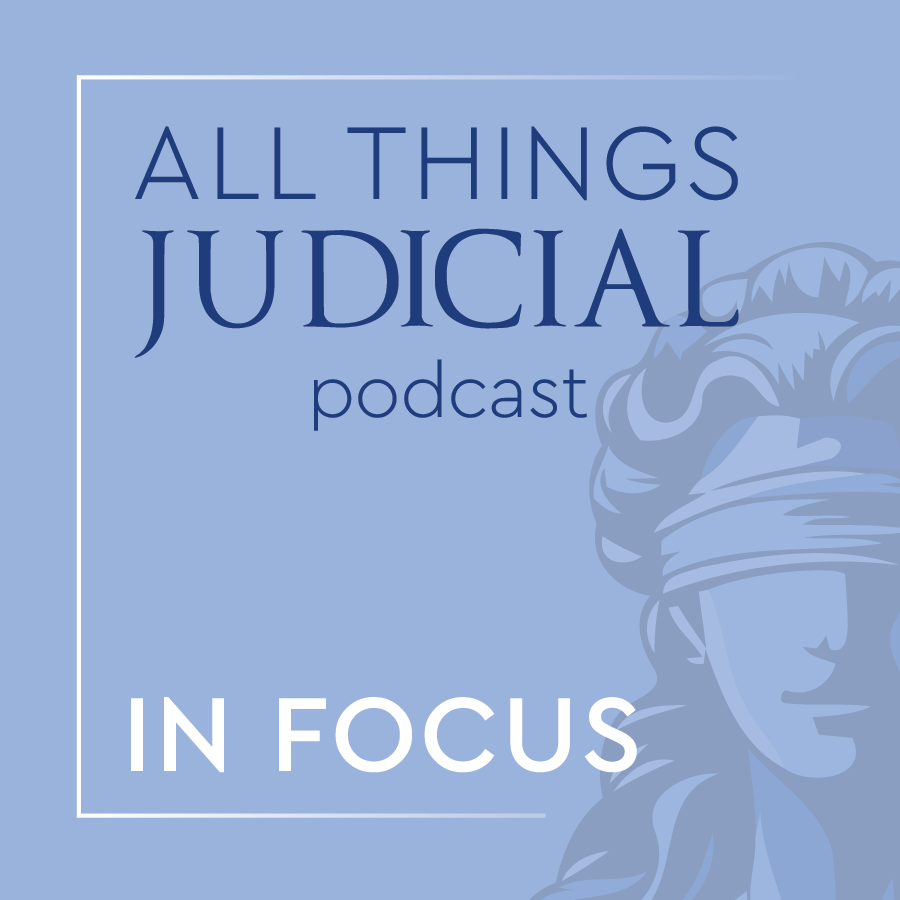 |
All Things Judicial – In Focus: A monthly deep dive into the latest news, updates, and decisions shaping the Judicial Branch. | |
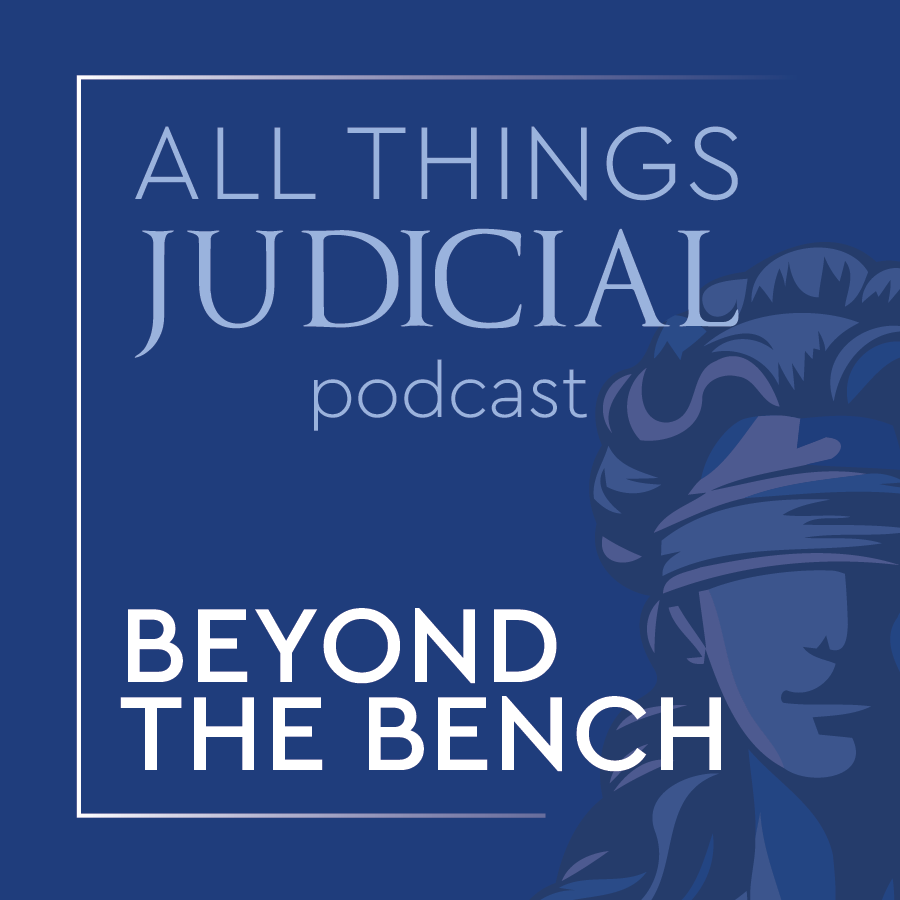 |
All Things Judicial – Beyond the Bench: Inspiring stories about the people behind the judiciary whose work positively impacts their communities. |
All Things Judicial is available on all podcast platforms or below on NCcourts.gov.
Episodes
Episode 122 – This episode provides an in-depth 2025 Year-In-Review of the North Carolina Judicial Branch. This episode covers:
- eCourts – A Historical Milestone
- New Case Statistics Dashboard
- Leadership Appointments
- Awards and Innovation Recognition
- Statewide Proclamations and Celebrations
- Key Takeaways from 2025
Episode 121 – In recognition of Native American Heritage Month, this episode , features an interview with Swain County Magistrate Gilbert Breedlove, whose remarkable journey of service and cultural preservation bridges the worlds of law, language, and faith.
Magistrate Breedlove serves in the North Carolina Judicial Branch and is also a language editor and Bible translator working with the Cherokee, Choctaw, Creek, and Ojibwe languages. His dedication to preserving and promoting indigenous languages requires a lifelong commitment to service, both in his professional role and in his personal calling.
Before becoming a magistrate, Breedlove served as a Staff Sergeant in the United States Marine Corps, worked as a deputy sheriff, and ministered as a pastor. In this All Things Judicial episode, he discusses how his experiences in public service and ministry have informed his work helping to translate the Bible from English into Choctaw—a project years in the making.
“We try to do this in a slow and steady manner instead of trying to rush to get it done,” Breedlove shared in the interview. “With the Choctaw Bible and songbook, it took us 25 years to get it done. And that's a lot of time.”
Episode 120 – This episode provides an in-depth look at significant developments in the North Carolina Judicial Branch for the month of September. This episode covers:
- Judicial Appointments
- eCourts Expansion Update
- North Carolina Conference of Clerks of Superior Court's New Officers
- Chief Justice Newby Appoints New Chief Administrative Law Judge
- 200th Anniversary of the Perquimans County Courthouse
Episode 119 – In this episode, Pitt County Chief District Court Judge Galen Braddy shares his deep-rooted passion for turkey hunting and turkey calling, and how the discipline, patience, and focus it requires mirror the skills he brings to the courtroom.
Judge Braddy, who has served on the bench for over 25 years, offers listeners a behind-the-scenes look at his life outside the courtroom, and treats us to a demonstration of a variety of turkey calls. In addition, he shares how turkey hunting and calling trains him for his work in the courtroom, and allows him to recharge to do his best at the job he loves.
“No matter what's going on, like if you've heard a terrible domestic case where a family is in conflict, you can reboot in the outdoors,” said Braddy on the podcast. “Sometimes it doesn't matter if the turkey gobbles or not, you're just out there. That really brings me back to peace and helps me get away.”
All Things Judicial: Beyond the Bench is part of an ongoing effort to humanize the judiciary and foster public understanding of the people who serve in North Carolina’s court system.

Above is an Eastern Turkey from North Carolina.

Above is an Ocellated Turkey harvested in the Yucatan Peninsula.

Above is a Merriams Turkey from South Dakota.
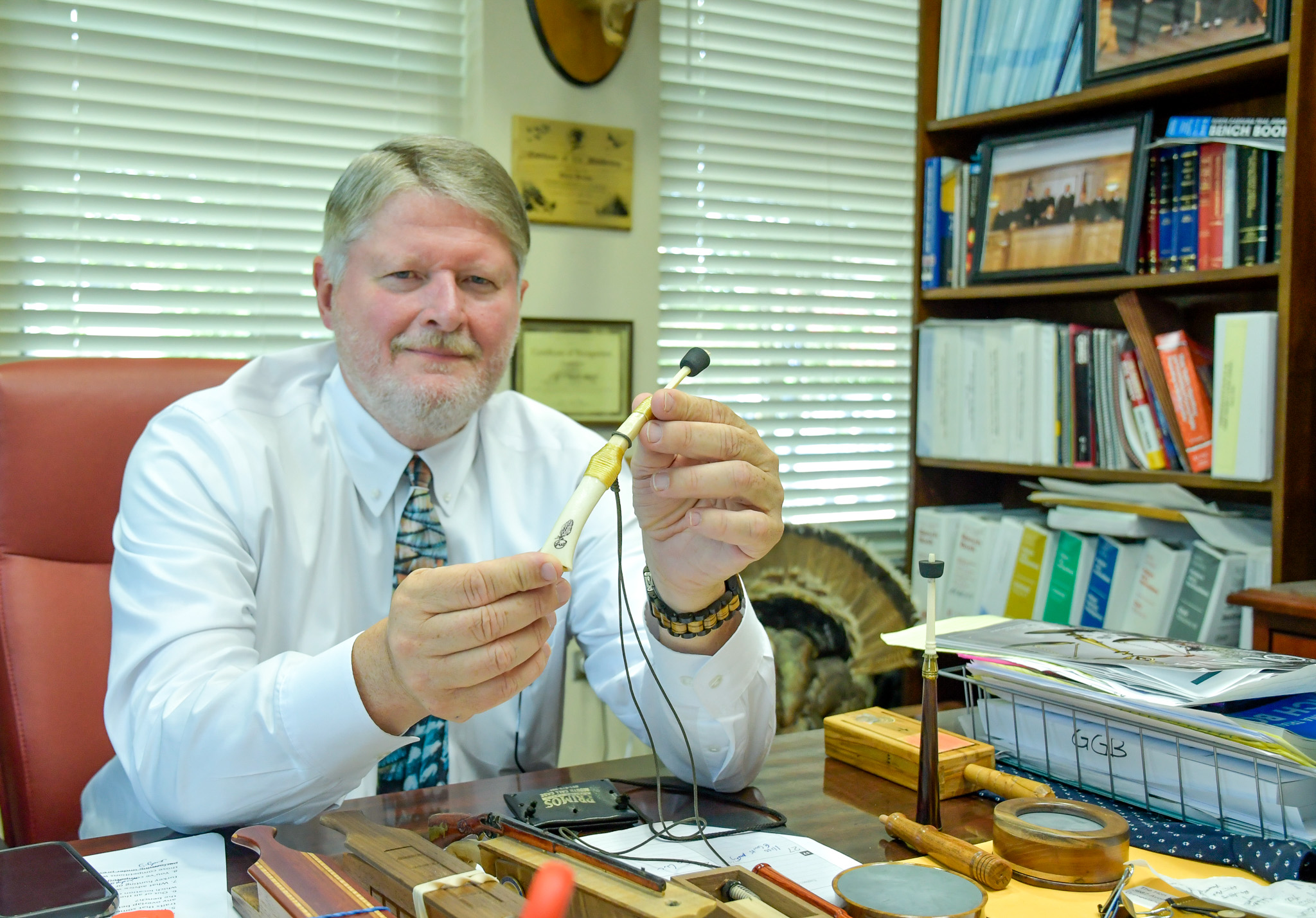
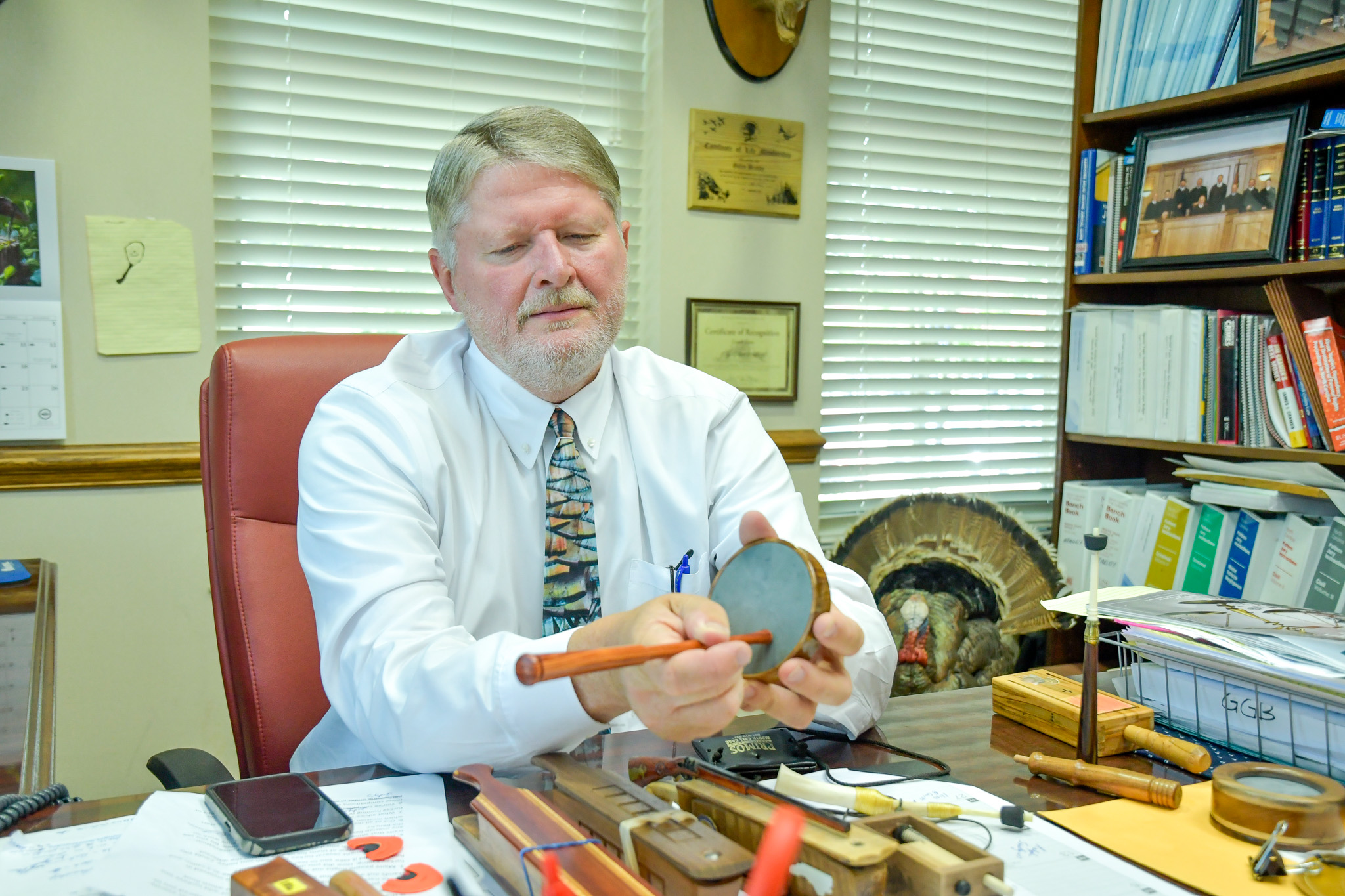
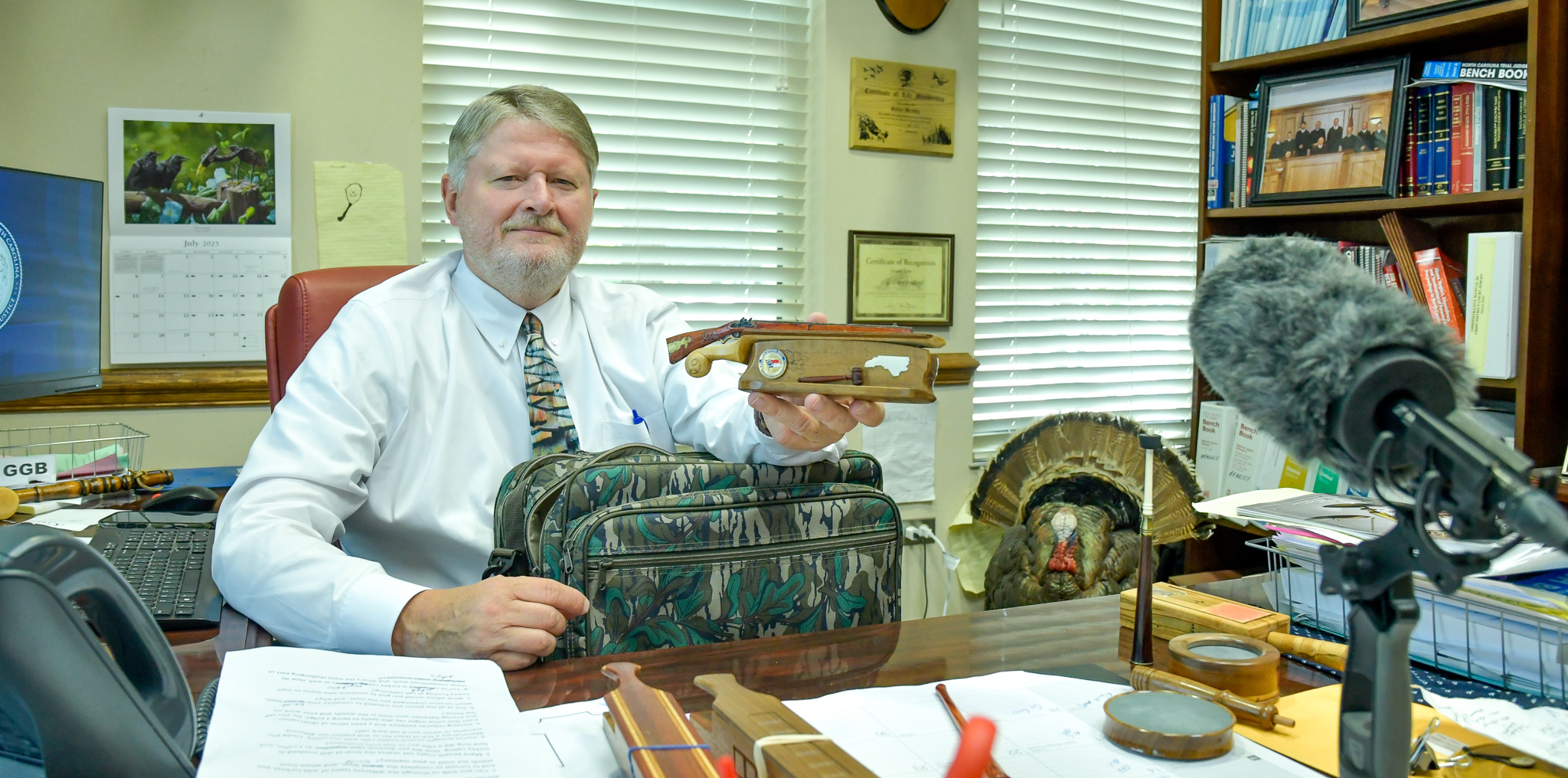
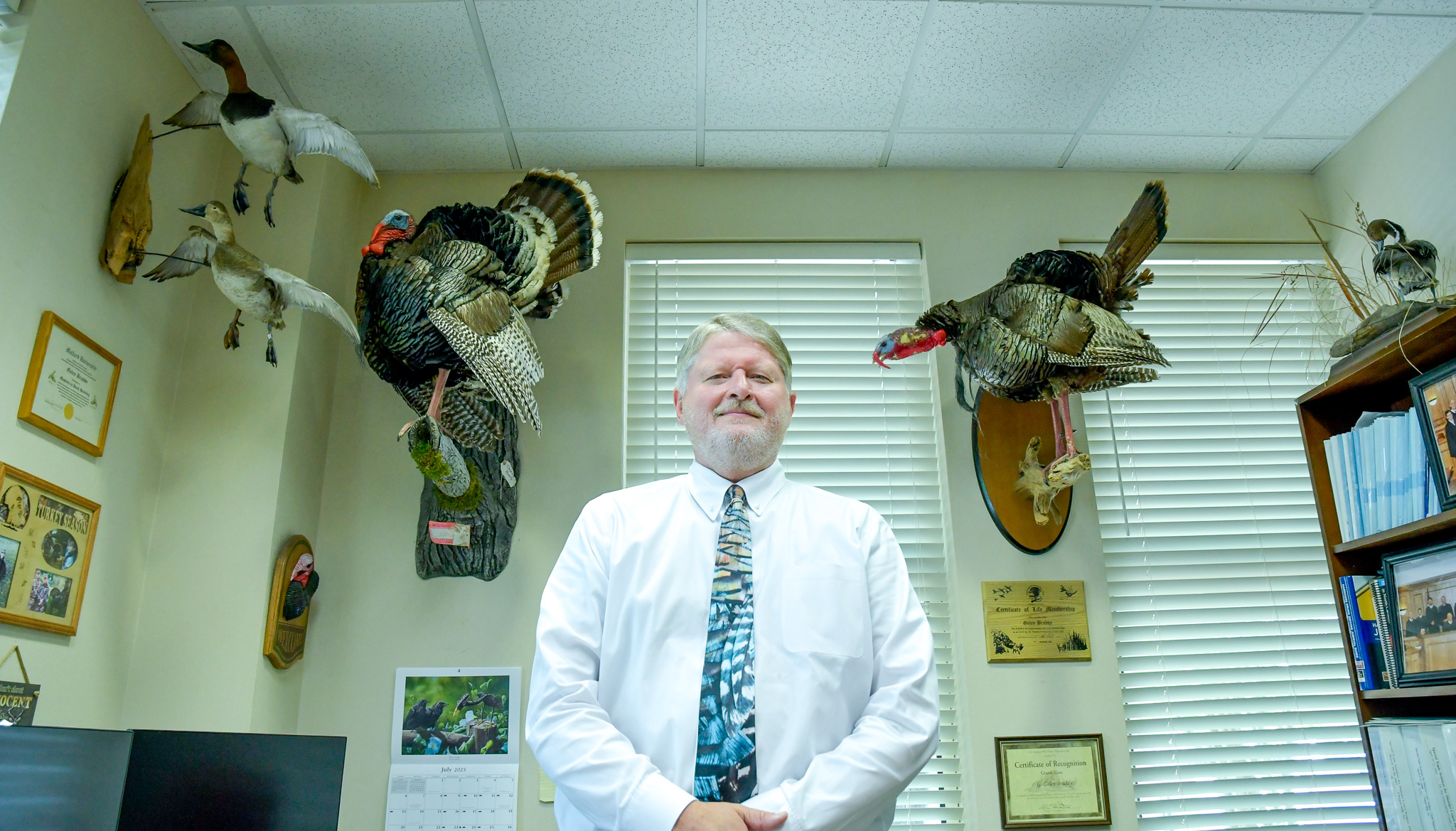
Episode 118 – Beyond the Bench: In this episode, we feature a wide-ranging conversation with Amanda Lamb, a veteran journalist, true crime author, and podcast host with more than 30 years of experience covering courts and criminal justice in North Carolina.
Best known for her long tenure as a crime reporter for WRAL-TV in Raleigh, Lamb has built a career around telling powerful stories from inside the courtroom. Her reporting has covered some of the state's most high-profile and complex criminal trials. In the episode, she reflects on what it means to witness justice unfold firsthand and the responsibilities that come with bringing those stories to the public.
“I was always fascinated by the factual components of a trial and mixing it with theater,” said Lamb on the podcast. “It's a very intense emotional situation where some people are going through the darkest hours of their lives and yet you have attorneys and the judge who are only focused on the law.”
In the interview, Lamb discusses the challenges of accurately reporting legal proceedings for a general audience, the ethical decisions reporters face inside the courtroom, and how access to judicial proceedings has changed with the rise of digital media and livestreaming. She also shares reflections on particularly memorable cases she covered and her transition from daily reporting to writing and podcasting.
Outside of television, Lamb is the author of several acclaimed true crime books and the host of the investigative podcasts Follow the Truth, What Remains, and The Killing Month August 1978. In addition, she shares about her current podcast, AGELESS: Opening Doors with Amanda Lamb.

Episode 117 – Beyond the Bench: This episode spotlights the civil wedding ceremonies conducted by North Carolina magistrates. We take a behind-the-scenes look at the process of getting married at a courthouse and a touching glimpse into a real wedding held at the Wake County Justice Center.
In the first segment, host Chris Mears interviews Wake County Chief Magistrate Christopher Graves, who shares insight into the role magistrates play in officiating weddings. Magistrate Graves walks listeners through a general understanding of the process that couples can expect, and shares his personal experience officiating weddings at the courthouse.
"Wedding ceremonies present an excellent opportunity for magistrates to show-off their public service skills," said Graves on the podcast. "In Wake County, we take pride in doing everything possible to give the couple the very best experience on their special day."
The episode's second segment transports listeners to the Wake County Justice Center, where the podcast team captures audio from a real wedding between Javier and Marielis, a couple who are native Spanish speakers. With assistance from an interpreter, the couple exchanged vows in a ceremony that reflected both the dignity of the occasion and the importance of cultural and linguistic inclusion in the courts. Host Chris Mears also had the privilege of serving as a legal witness to the ceremony.
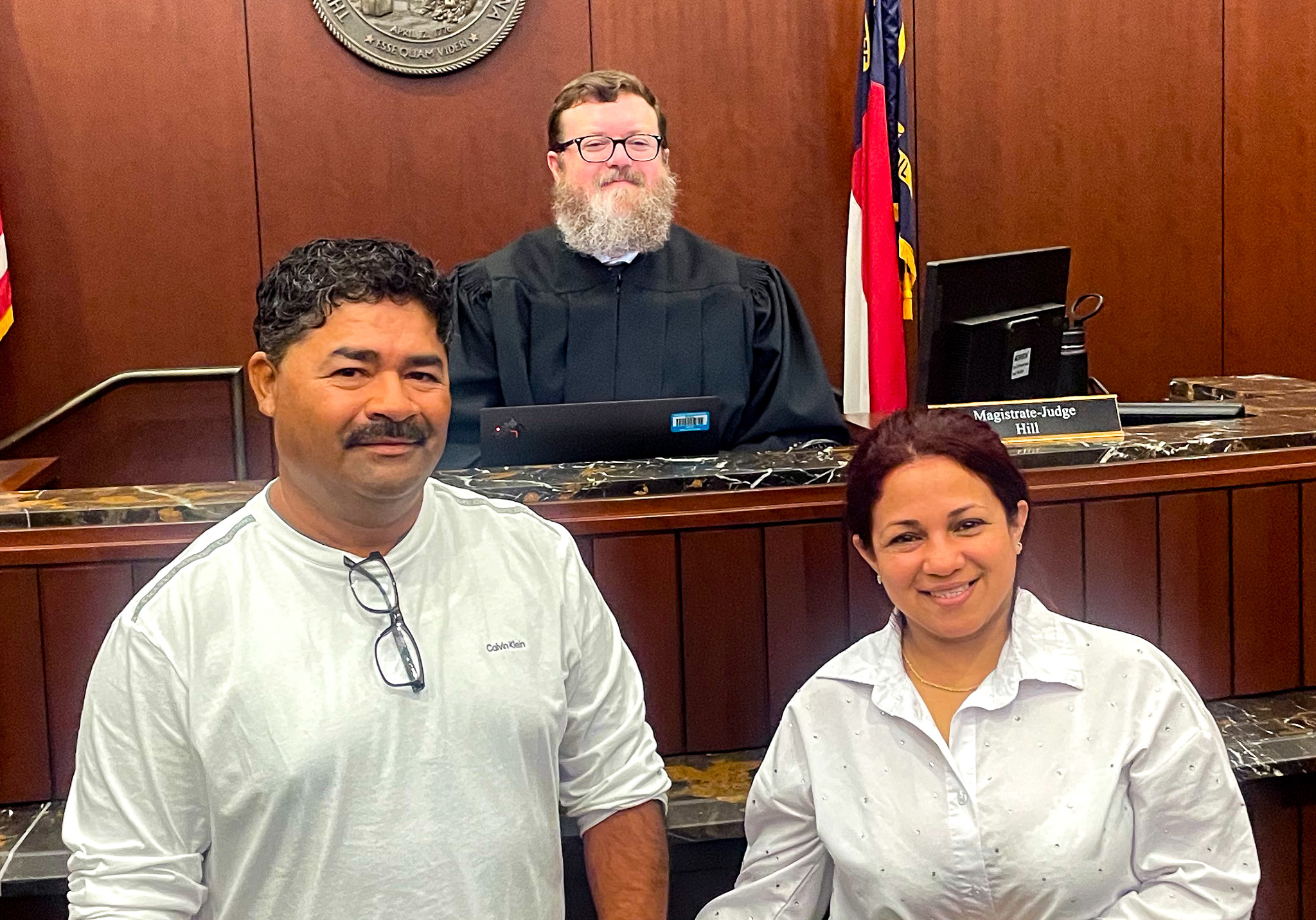
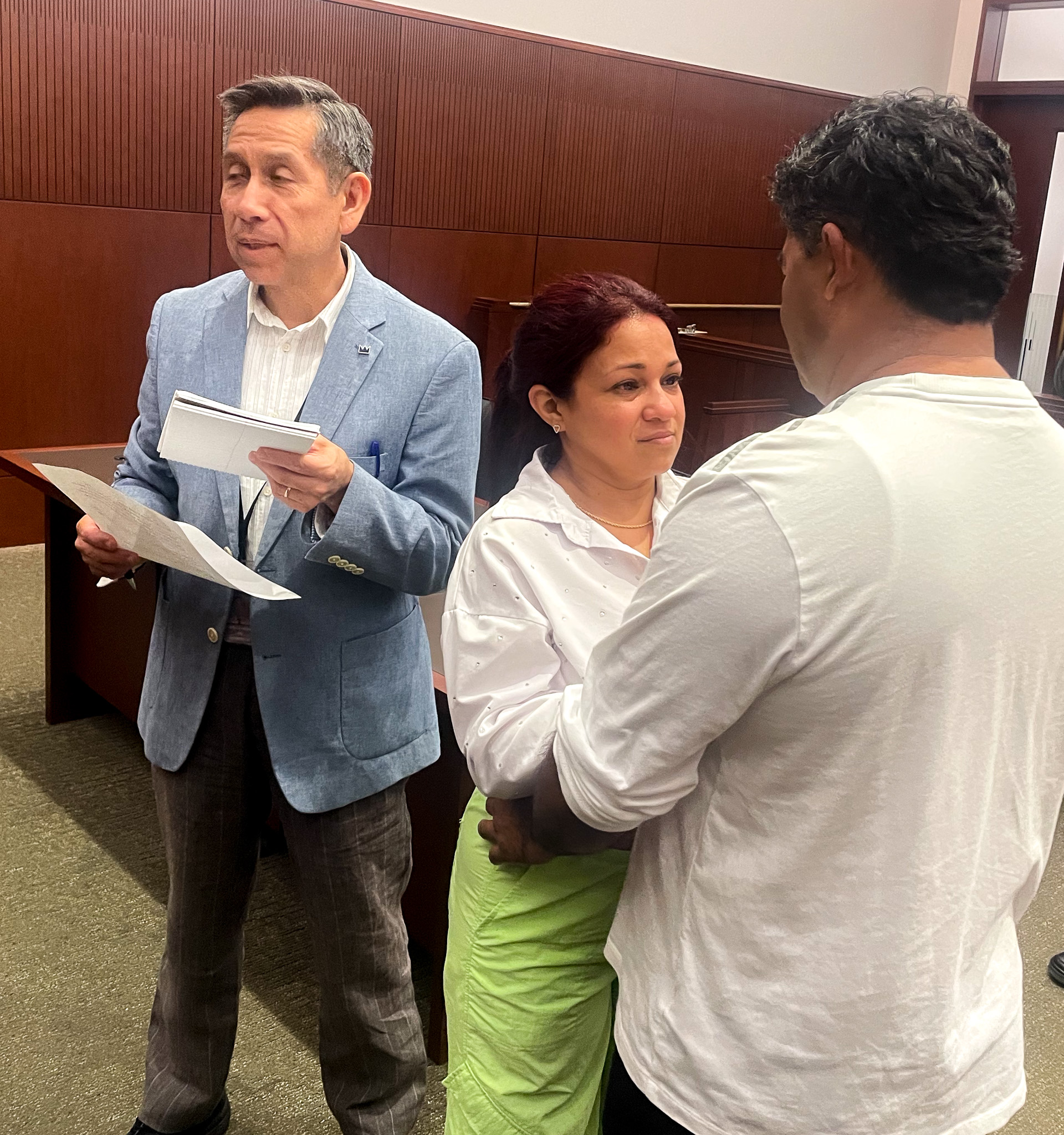
Episode 116 – In Focus: June. News updates include:
- Judicial Appointments
- Chief Justice Newby Declared Employee Appreciation Week
- eCourts Expansion Update
- eCourts Guide & File Milestone
- Kiosk Expansion
- Preview of the next All Things Judicial–Beyond the Bench
Episode 115 – Beyond the Bench: This is a special episode commemorating the 250th anniversary of the Mecklenburg Declaration of Independence. It features a compelling conversation with Kendall Kendrick, Executive Director of the Charlotte Trail of History and the Charlotte Liberty Walk, as well as remarks from Chief Justice Paul Newby delivered at the May 20th anniversary ceremony in Charlotte.
In the episode, Kendrick offers unique historical insight into the events of May 1775 and her personal connection as a descendant of the Alexander family—key figures associated with the original declaration. She discusses the ongoing legacy of the Mecklenburg Declaration, its place in Revolutionary War history, and the continued efforts to tell Charlotte’s foundational stories through public history initiatives.
Listeners will also hear highlights from Chief Justice Paul Newby’s speech at the 250th commemoration ceremony, where he reflects on the Declaration’s importance to North Carolina’s identity, civic heritage, and the broader American story of liberty.
"We do hereby declare ourselves a free and independent people, that we are and of right ought to be a sovereign and self-governing people under the power of God," said Newby, quoting the Mecklenburg Declaration, on the podcast. "Today, what do we celebrate when we celebrate the Meck Dec? We celebrate self government under the power of God."
All Things Judicial: Beyond the Bench is available on Apple Podcasts, Spotify, and wherever you listen. For more information and to listen to the episode, visit NCcourts.gov.
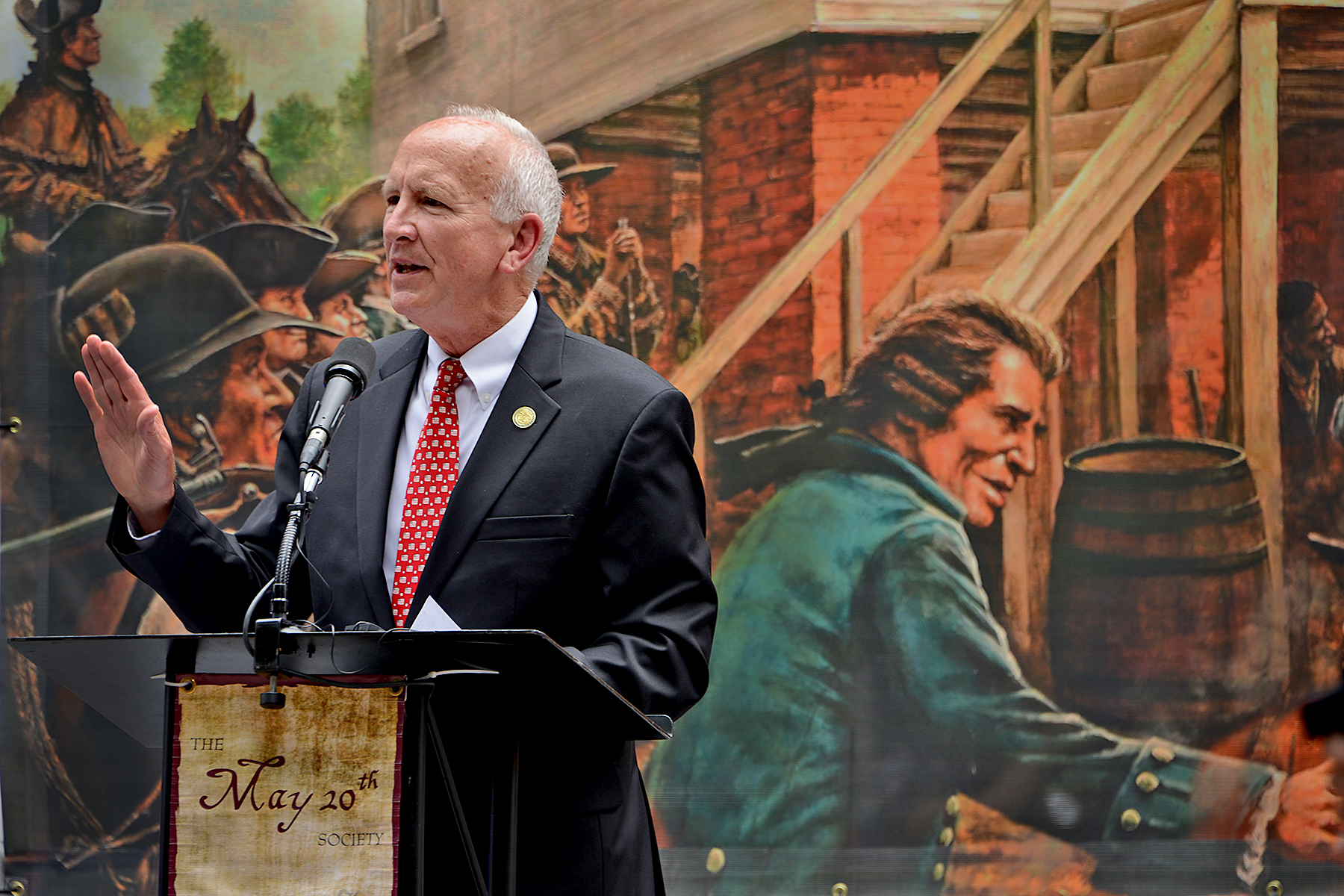
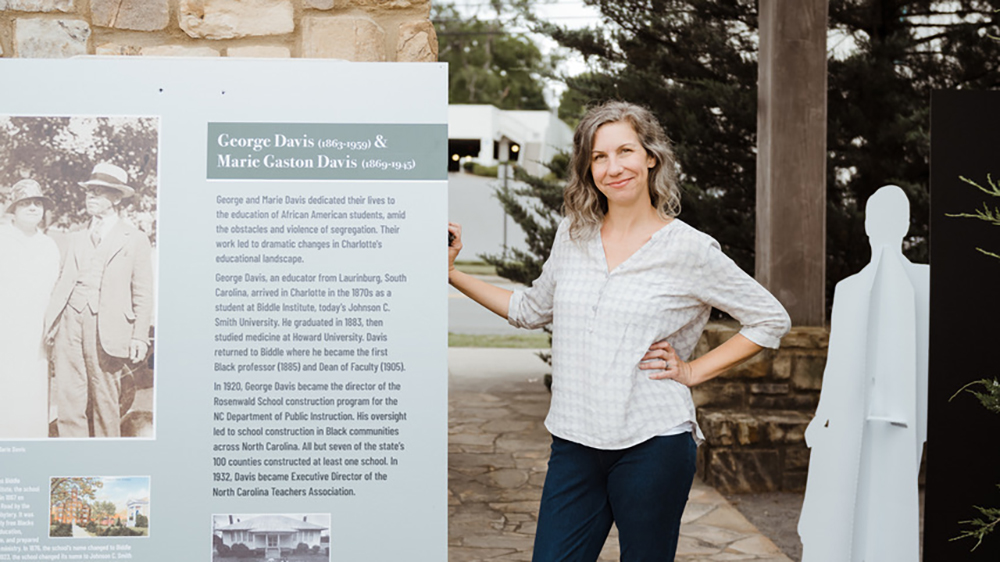

Episode 114 – In Focus: May. News updates include:
- May is Recovery Court Month in North Carolina
- Expansion of remote interpreting services
- Judicial appointments
- Chief Justice's Commission on Professionalism awards
- eCourts expansion update
- Human Trafficking Commission update
- Preview of the next All Things Judicial–Beyond the Bench
Episode 113 – Beyond the Bench: In this episode, we recognize April as National Child Abuse Prevention Month, a time to raise awareness about the importance of safe, supportive environments for all children. We spotlight the NC Guardian ad Litem Program and its vital role in advocating for children involved in the state’s foster care system.
The episode features conversations with three leaders from the Guardian ad Litem Program:
- Carolyn Green, Regional Administrator
- Brittany McKinney, Staff Attorney
- Matthew Wunsche, Appellate Counsel
Together, they discuss the urgent need for volunteer child advocates, volunteer attorney advocates, and interns to support the growing need of abused and neglected children in North Carolina’s court system.
"When I came over to Guardian ad Litem I learned that so many children are under the radar while in the court system," said Green on the podcast. "I hope that people will give of their time and make a difference in a life. When you commit until a child gets back to a safe, permanent home, you can't beat that feeling."
The episode serves as both a call to action and an informative look into how volunteers can support the best interests of children experiencing abuse, neglect, or abandonment.
To learn more about becoming a Guardian ad Litem volunteer or intern, visit volunteerforgal.org.
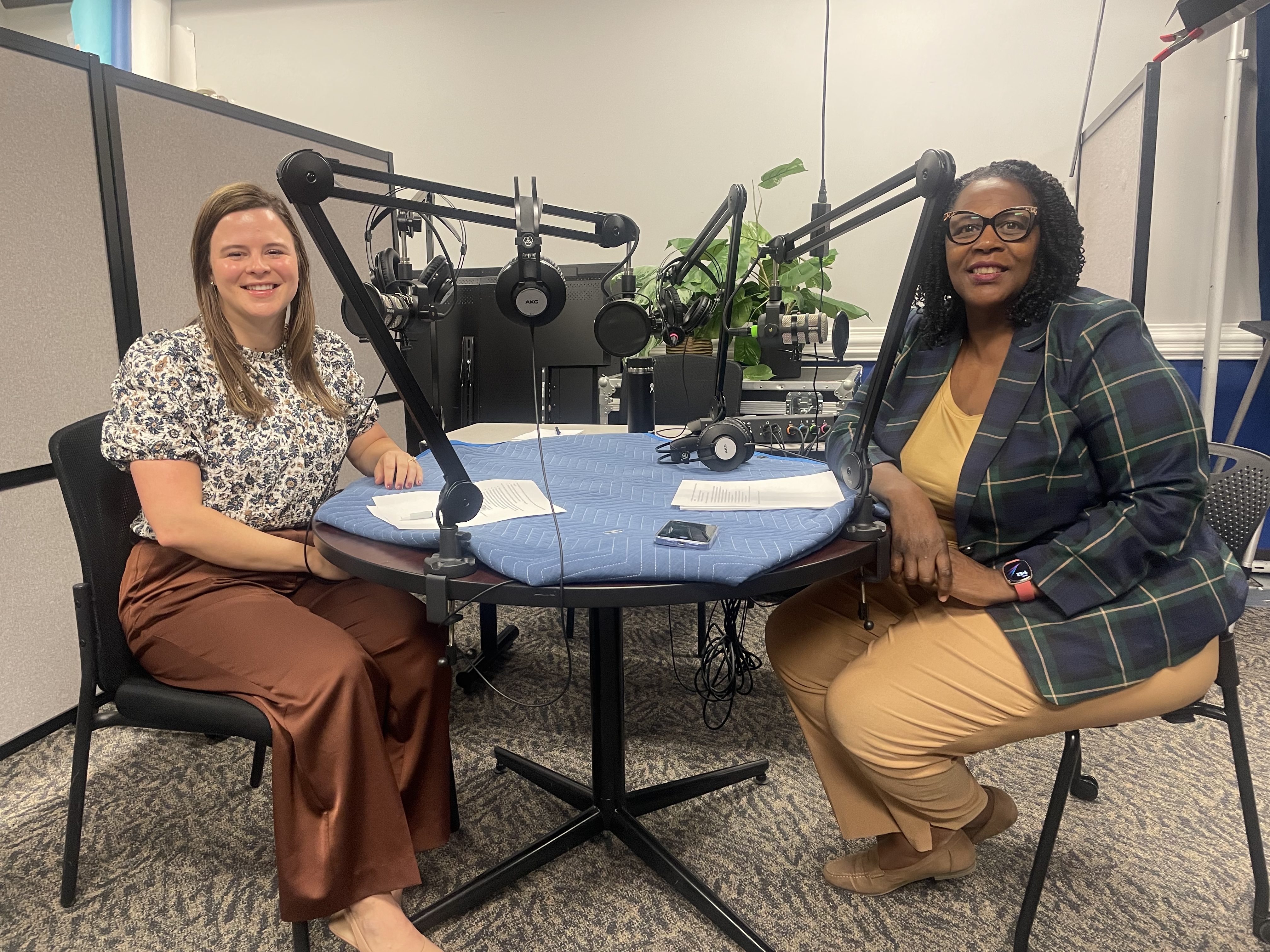
Episode 112 – In Focus: April. News updates include:
- The 2023-2024 Judicial Branch Annual Report
- Chief Justice Paul Newby visits Columbus County
- eCourts Track 8 goes live on April 28
- Most recent judicial appointments
- NC Human Trafficking Commission is accepting grant applications
- Preview of the next All Things Judicial–Beyond the Bench episode which features the North Carolina Guardian ad Litem Program
Episode 111 – Beyond the Bench: In this episode, we celebrate a major milestone: the 30th anniversary of the Mecklenburg County Recovery Court.
Since its founding, the Recovery Court has been a beacon of hope for individuals struggling with addiction, providing an alternative path that blends accountability with support. This episode highlights the program’s lasting impact through the perspectives of Jessica Modra, Program Manager for the Supportive Treatment and Engagement Program, and John Barber, a Recovery Court graduate who shares his powerful personal journey from addiction to recovery.
"The people we serve are our neighbors, coworkers, and our friends who are looking to start a new chapter in their lives," Modra said on the podcast. "Recovery court is committed to helping these individuals and that's why we are able to celebrate 30 years of recovery court here in Mecklenburg County."
The conversation delves into the evolution of the program, the challenges and triumphs of its participants, and the crucial role of community support in the recovery process. As Mecklenburg County marks this significant anniversary, Beyond the Bench invites listeners to reflect on the power of second chances and the role the judicial system can play in fostering change.

Episode 110 – In Focus: March. News topics include:
- Attorney training for eCourts Track 8 and eCourts expansion
- Task Force on Trauma-Informed Courts Plans More Progress in 2025
- Case Statistics Dashboard is available to the public at data.nccourts.gov
- March is Severe Weather Preparedness Month
- DWI grant from Governor's Highway Safety Commission to expand case capacity
- Preview of the next episode of Beyond the Bench focusing on Mecklenburg County Recovery Court's 30th Anniversary
Episode 109 – Beyond the Bench: In this episode, we take listeners beyond the courtroom and into the heart of disaster recovery, featuring a compelling conversation with North Carolina Court of Appeals Judge Michael Stading and law clerks Vincenzo Conciatori and Tomas Nazer-Paniagua.
These legal professionals stepped away from their usual roles in the judiciary to volunteer in Western North Carolina following the devastation of Hurricane Helene. In this episode, they share their firsthand experiences witnessing the storm’s impact, assisting communities in need, and reflecting on how the experience shaped their perspectives on justice and public service.
Throughout the episode, the guests discussed the take aways from their service. They shared stories that highlight the human side of the legal profession and the ways in which Judicial Branch personnel can support communities in times of crisis. See photos of their work in Western North Carolina on the NCcourts Facebook page.
Episode 108 – In Focus: February. News topics include:
- Court of Appeals Judge Tom Murry's investiture
- eCourts Track 7 roll-out
- NC Human Trafficking Commission's annual grant program
- December and January judicial appointments
- Preview of next episode
Episode 107 – In this episode, we feature the second installment of a truly extraordinary roundtable discussion with nine former NCAOC directors. The discussion was moderated by former director Judge Marion Warren and included: Judge Gerald Arnold, Judge Jack Cozort, Mr. Jim Drennan, Justice Franklin Freeman, Judge Robert Hobgood, Judge Tom Ross, Judge John Smith, and Judge Ralph Walker. The directors discussed NCAOC's changes throughout the years and shared funny anecdotes from their time leading the Judicial Branch.
"I went to Avery County in the early 1990s and there was an older woman assistant clerk there. I said, 'I noticed you just got your computers in but they're still in boxes.' She said, 'we don't like computers here and we don't like anyone who does,'" said Judge Walker on the podcast. "I went back 10 years later, the older lady is gone and a younger woman was there. She was pulling her hair out (in frustration) and I said, 'ma'am what in the world is wrong?' She said, 'the computers are down and we can't do anything without them!'"
This is part two of the roundtable which was recorded in December 2016. Visit NCcourts.gov to listen to part one and other episodes of All Things Judicial.
Episode 106 – In this episode, we feature the first installment of a truly extraordinary roundtable discussion with nine former NCAOC directors. The discussion was moderated by former director Judge Marion Warren and included: Judge Gerald Arnold, Judge Jack Cozort, Mr. Jim Drennan, Justice Franklin Freeman, Judge Robert Hobgood, Judge Tom Ross, Judge John Smith, and Judge Ralph Walker. The directors began by discussing how they received the "call of duty" from their respective chief justices.
"I got a call from Chief Justice Henry Frye and he asked if I would be the director of AOC. I talked with my wife and she said 'absolutely not,'" said Judge Hobgood on the podcast. "I thought that was the end of it, but two days later I got calls from I. Beverly Lake, who was just elected, and Henry Frye who said 'why didn't you take that job?' I started thinking about having the sitting chief justice and former chief justice call and ask me to be the the director, so I agreed to start January 1, 2001."
This is part one of the roundtable which was recorded in December 2016. Subsequent parts will be released later this month.
Episode 105 – In this episode, we feature an excerpt of an interview with Charlotte Attorney Joseph W. Grier, Jr. (1915-2010). Grier was interviewed in 2003 for the Chief Justice's Commission on Professionalism's Historical Video Series. Grier led an epic career as a Charlotte attorney for more than 60 years after volunteering for the U.S. Army during WWII. In the podcast, he discusses his early life, highlights of his career, and his community service which included the desegregation of all Charlotte city park facilities and pools in the 1950s.
"We voluntarily desegregated all of the parks in Charlotte long before there was any litigation in the schools," said Grier. "It turned out that because we did it voluntarily ... integration was taken as a matter of course and we never had any fuss at all about the parks."
This interview was conducted by Attorney Hank Hankins for the CJCP's Historical Video Series. A video of the entire interview can be viewed on the Judicial Branch YouTube Channel.
Episode 104 – In this episode, we feature our annual, award winning, Halloween episode entitled Fright Court. In the first segment, we feature Nelson Nauss, the Executive Director of The Ghost Guild, a North Carolina-based paranormal research organization. Nauss shares four court cases involving claims of the supernatural, where the courts didn’t necessarily rule-out the paranormal elements of each lawsuit. In the second segment, Roger Winstead of the Judicial Branch Communications Office narrates the story of John Walker Stephens, a state senator who was murdered in 1870 in the Historic Caswell County Courthouse.
"Could John Walter Stephens apparition be struggling to evade his torturous murderers by fleeing through that creaky courthouse storage room door," Winstead narrates on the podcast. "You be the judge!"
Fright Court is an annual episode of All Things Judicial which showcases unexplained occurrences and macabre historical incidents in North Carolina's courthouses. This popular YouTube and podcast series won a first place award for videography from the North Carolina Association of Government Information Officers in 2019 and 2020.
Episode 103 – In this episode, we welcome Pitt County District Court Judge Mario Perez. Judge Perez is the first Hispanic judge in Pitt County and possibly the first Mexican-American judge in North Carolina. On the podcast, he discussed his upbringing in Texas, the challenges he faced as a Mexican-American, and his favorite Hispanic heritage traditions. Hispanic Heritage Month is recognized September 15 – October 15.
Judge Mario E. Perez worked in private practice and as an assistant public defender for more than 30 years. He was appointed to the district court bench in 2018, and in 2020, he was elected to a four-year term. He originated from San Antonio, Texas and earned degrees from St. Mary's University and Georgetown University School of Law School.
Episode 102 – In this episode, we focus on the North Carolina judicial system reforms of the 1960s. These reforms created a unified court system that included newly created District Courts, Court of Appeals, and the Administrative Office of the Courts (NCAOC). In the interview, former NCAOC Director and Supreme Court of North Carolina Associate Justice Franklin Freeman interviews two men who helped implement these reforms: Judge James Dickson Phillips, Jr. and Senator Lindsay C. Warren, Jr.
"The effect of the implementation of the District Court was to abolish all of the courts beneath the Superior Courts – county courts, city courts, and the justice of the peace system," said Warren on the podcast. "The worst thing about the justice of the peace system was that their compensation came from fees they assessed, but in a criminal case they could not assess a fee unless a defendant was convicted."
This 2012 interview is part of CJCP's historical video series. A video of this interview can be viewed on the Judicial Branch YouTube Channel.
Episode 101 – In episode, we commemorate Constitution Day, recognized annually on September 17. In the first segment, we hear from Chief Justice Paul Newby who shares about the important principles contained in America's founding documents. After that, we travel to the Historic 1767 Chowan County Courthouse to visit with Charles Boyette, who serves as a Historic Interpreter for the NC Department of Natural and Cultural Resources' Historic Edenton State Historic Site. Boyette explains what NC courts were like during America's founding era, and identifies the historical figures who frequented that courthouse then went on to contribute to America's founding documents: Joseph Hewes, signer of the Declaration of Independence; James Iredell, an original member of the US Supreme Court; and Hugh Williamson, signer of the US Constitution.
"We are so grateful for the foundational structure of our constitution that takes governmental power and divides it up among the three branches," said Newby on the podcast. "What are those branches? We have the Legislative Branch, the Executive Branch, then we have the Judicial Branch whose charge is to do justice for all."
Constitution Day is a federal observance that recognizes the adoption of the US Constitution. It is observed on September 17, the day in 1787 that delegates to the Constitutional Convention signed the document in Philadelphia.
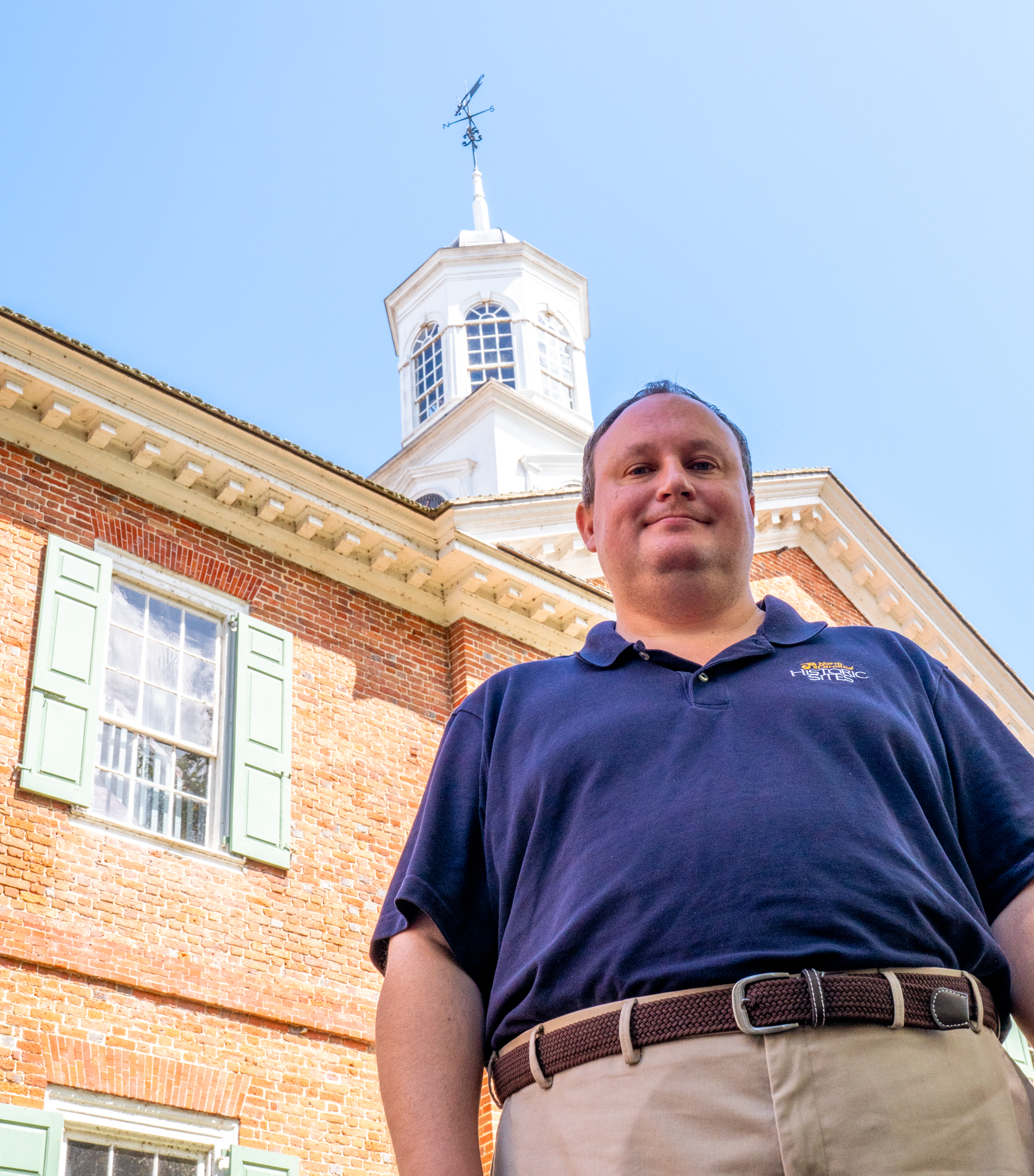
Episode 100 – In this episode, we feature an interview with former Chief Justice Burley Mitchell. Mitchell worked in several county and state government leadership positions before serving as a judge on the North Carolina Court of Appeals, as associate justice of the the Supreme Court of North Carolina, and the Chief Justice of the Supreme Court of North Carolina. During his tenure as Chief Justice, Mitchell created the Chief Justice's Commission on Professionalism (CJCP) with the mission to enhance professionalism among North Carolina lawyers.
In this 2006 interview conducted by former CJCP Executive Director Mel Wright, Mitchell reflects on his career's most notable cases, dispenses advice on handling unprofessional lawyers, and explains why professionalism in the legal field is of utmost importance.
"Dean Pound at Harvard Law School wrote 'our profession is not just a job, it's a calling,' and it's a calling whereby a person serves humanity and only coincidentally makes a pretty good living," said Mitchell on the podcast. "If (making a good living) is our focus, we will lose what sets us apart and that has always been the aspect of public service."
This interview is part of CJCP's historical video series. A video of this interview can be viewed on the Judicial Branch YouTube Channel.
Episode 99 – In this episode, we welcome Chief Judge Chris Dillon of the North Carolina Court of Appeals. As North Carolina's intermediate appellate court, the Court of Appeals reviews proceedings that occur in trial courts for errors of law or legal procedure. On the podcast, Dillon discusses his path to becoming a Court of Appeals judge, the role of the Court of Appeals in our court system, and the importance of mentorship and civil education for students, young lawyers, and the general public.
"I had been at the Court for four months and remember a student at UNC called and asked to be my intern, and I really wasn't that familiar with the role or that judges had interns," Dillon said on the podcast. "The intern came over and I discovered what I really love about this job was that you get the chance to mentor. Interns come to the Court of Appeals to learn and be mentored and I love that."
Chief Judge Chris Dillon was born in Raleigh, North Carolina, the youngest of five children. He received both his undergraduate degree and Juris Doctor from the University of North Carolina at Chapel Hill. Following law school, Judge Dillon practiced law at Young Moore Henderson and was licensed by the North Carolina Real Estate Commission as a broker. In addition, he has taught various real estate focused courses at both UNC School of Law and Campbell School of Law as an adjunct professor. Judge Dillon was elected to an eight-year term on the North Carolina Court of Appeals in 2012, and was appointed as Chief Judge on January 1, 2024.
This interview was conducted by Judicial Branch Communications Office Summer Intern Sophie Strach.
Episode 98 – In this episode, we feature excerpts from an interview with Russell M. Robinson II, the founding partner of the Robinson Bradshaw law firm. Robinson was born in Charlotte, NC, in 1932 and attended Princeton University for most of his undergraduate years. He then earned his Juris Doctor from the Duke University School of Law. Robinson is the author of Robinson on North Carolina Corporation Law, a publication providing coverage of the business corporation, limited liability company, and nonprofit corporation statutes in North Carolina.
In the interview, Robinson shares the 5-year journey of writing the first edition of his book, how he and his partners started their law firm, and his opinions on how the practice of law has changed over the years.
"The practice of law has fundamentally changed and not for the better," Robinson said on the podcast. "More and more lawyers take-on their clients' position and lose their independence to be able to examine that position because it becomes their position too. That's an undermining of professionalism that I think is really regrettable."
This interview was conducted in 2018 by John R. Wester of the Robinson Bradshaw law firm for the Chief Justice's Commission on Professionalism's Historical Video Series. A full version of the interview can be found on the NCcourts Youtube Channel.
Episode 97 – In this episode, we welcome the Honorable Louis A. Bledsoe, III, the Chief Judge of the North Carolina Business Court. On the podcast, Bledsoe shares about his path to becoming an attorney and judge, the role of the Business Court and how it functions, and he reflects on the joys and challenges in today's legal community.
“My favorite part (of being a judge) has been, whether through the case management process or through judicial resolution, to help the parties find their way to a resolution of the dispute that they have,” said Bledsoe on the podcast.
The North Carolina Business Court is a specialized forum of the superior court division. Cases involving complex and significant issues of corporate and commercial law in our state are designated by the Chief Justice of the Supreme Court of North Carolina as complex business cases for assignment to a Business Court judge who oversees resolution of all matters in the case through trial. Established in 1996, the Business Court has locations in Charlotte, Greensboro, Raleigh, and Winston-Salem.
The Honorable Louis A. Bledsoe, III presides as Chief Judge of the North Carolina Business Court with chambers located at the Mecklenburg County Courthouse in Charlotte. He has served as a Business Court judge since July 1, 2014 and as Chief Judge since July 1, 2018. He announced his retirement for January 2025.

Episode 96 – In this episode, we feature excerpts from a 2004 interview with late Judge Robinson O. Everett (1928-2009), former Chief Judge of the United States Court of Appeals for Armed Forces. Everett graduated from Harvard University at age 19 and was admitted into the North Carolina Bar Association by age 22. Originally from Durham, North Carolina, Everett was part of Duke Law School's faculty for over 50 years - founding the University's Center on Law Ethics and National Security. In the interview, Everett shares of the importance of mentorship, his family, and the many different facets of law as he traveled from North Carolina to Washington over the course of his more than 50-year career.
"One of the nice things about being a lawyer is that you occasionally have opportunities to do something that will be very far-reaching," Everett said on the podcast. "Where you can hopefully bring about a result that will make things better for everyone."
The interview was conducted by Hon. William A. Creech for the Chief Justice's Commission on Professionalism's Historical Video Series. A full version of the interview can be found on the NCcourts Youtube Channel.
Episode 95 – On this episode, we welcome Rufus Edmisten who served as the deputy chief counsel for the Senate Watergate Committee (1973-74). The Committee's final report, released on June 27, 1974, was partly responsible for the resignation of President Richard Nixon on August 9, 1974. On the podcast, Edmisten reflects on the high-profile nature of his work on the Committee, his relationship with Committee Chairman U.S. Senator Sam Ervin, and recounts the history-defining moment in which he personally delivered the subpoena to the White House for Nixon's secret Oval Office tapes.
"I knew it was going to be a big day, and when I got (to the White House) I read the subpoena title but then did a little impish thing too," said Edmisten on the podcast. "I had a little U.S. Constitution in my back pocket that Senator Ervin used to carry around, and something about my Boone upbringing said, 'whip that baby out on them.' So I pulled it out of my right back pocket and said, 'I heard you need one of these down here too.'"
Rufus L. Edmisten was born and raised in Boone, North Carolina, and earned an undergraduate degree from UNC-Chapel Hill and a Juris Doctor from the George Washington University Law Center in Washington, DC. He served as North Carolina Secretary of State, North Carolina Attorney General, and was the Democratic nominee for Governor in 1984. He is currently a lawyer in private practice.
The interview was conducted by North Carolina Administrative Office of the Courts Communications Director Graham Wilson.
Episode 94 – In this episode, we feature an excerpt of a 2004 interview with the late James D. Blount, Jr. (1927–2015), who worked as a prominent attorney in Rockingham and Wake counties. Blount's 50-year legal career included working as lead counsel in over 300 civil jury trials, and numerous stints serving as a volunteer in civic and community organizations. Originally from Wilson County, Blount served in the United States Navy before earning an undergraduate degree from UNC-Chapel Hill and a Juris Doctor from UNC School of Law. In the interview, Blount shares about the importance of professionalism and the lessons learned from his lengthy legal career.
"One thing (I've learned) is that you may have a whole lot of clients but that client only has one lawyer," Blount said on the podcast. "He deserves to have his phone calls returned, questions answered, to be made to feel good about his case, and to be told the truth about it."
This interview was conducted by attorney Samuel G. Thompson for the Chief Justice's Commission on Professionalism's Historical Video Series. A full version of the interview can be found on the NCcourts Youtube channel.
Episode 93 – In this episode, we profile Safe Babies Court, a new specialty court that aims to reduce the time a child spends in foster care before reaching a safe and permanent home. Guests include Chief District Court Judge J. Corpening, District Court Judge Rebecca Eggers-Gryder, Safe Babies Court State Director Polly Handrahan, and Safe Babies Court State Coordinator Kristin Stout. The panel discusses the need for Safe babies Court, how it works, and the impact the Court is already having in communities across the state.
"We are on the precipice of changing lives forever by changing a baby's life, changing a family's life, and making it less likely that the family will intersect with child welfare again," said Judge Corpening on the podcast. "That makes our communities healthier, better, and safer. This is really significant work."
North Carolina is engaged in a three-year pilot process that will begin implementation in Brunswick, Durham, Mitchell, New Hanover, and Yancey counties over the next year. The goal of Safe Babies Court is to improve the long-term well-being of children ages birth to three (or five in some areas), and their families, in the child welfare system. This program connects babies and their families with intensive support designed to promote healthy child development while working to ensure a safe exit from foster care as soon as possible. The process results in frequent court contact and family decision-making meetings for parents, the child's representatives or caretakers, and court personnel.
Episode 92 – Today is "Meck Dec Day," a day that commemorates the signing of the Mecklenburg Declaration of Independence on May 20, 1775. A date that is enshrined on the North Carolina state flag.
In this episode, we listen to a 2023 recording of Chief Justice Paul Newby explaining the significance of Meck Dec Day to an audience of law clerks and staff gathered in the Supreme Court of North Carolina’s law library.
In his remarks, Newby shares the context in which the Mecklenburg Declaration was signed, and the controversy over its authenticity.
Episode 91 – In this episode, we feature an excerpt of an interview with the late Margaret Adams Harris (1916–2014) who worked as a prominent Guilford County attorney. Throughout her career, Harris was dedicated to public service. Most notably, she served on the Duke University board of trustees and worked to implement Title IX of the 1964 Civil Rights Act, and served as chair of the Greensboro City Board of Education during desegregation. In the interview, Harris shares about attending college and law school immediately following the Great Depression, having former Chief Justice Susie Sharp as a contemporary, and balancing life as a mother and attorney.
"You're making a big commitment when you determine to be a lawyer and it becomes a major part of your life, but shouldn't be all of your life," said Harris on the podcast. "You still have your family and your community to which you still have a responsibility. I think you need to face this fact and make sacrifices where necessary."
This interview was conducted by former Executive Director of the Chief Justice's Commission on Professionalism Mel Wright for the Commission's Historical Video Series. A full version of the interview can be found on the NCcourts Youtube channel.
Episode 90 – This episode of All Things Judicial features a panel of three experts on the North Carolina Judicial Branch: former Supreme Court of North Carolina Associate Justice and North Carolina Administrative Office of the Courts Director Franklin Freeman, former Wake County Chief District Court Judge Ned Mangum, and former Wake County District Attorney Colon Willoughby. The panel discussed the history of the court system, the different levels of our courts, and expressed sincere appreciation for their time serving people through their court positions. The panel was recorded before a live audience in March 2024.
"One of the things that made me want to be a part of our court system is that it's the last place left where we can get Republicans and Democrats working quietly together trying to solve people's problems," said Mangum on the podcast. "You have elected public servants who care about what they do and you never hear their names, which is the way it ought to be."
Franklin Freeman was a senior assistant to Governor Mike Easley. Prior to that position, he served as an associate justice on the North Carolina Supreme Court and as chief of staff to Governor Jim Hunt. In addition, Freeman served as director of the North Carolina Administrative Office of Courts and as secretary of the North Carolina Department of Corrections.
Ned W. Mangum served as a Wake County district court judge for over 16 years, including over two years as Wake County chief district court judge. Before that, he served as Wake County district attorney and as an assistant district attorney.
Colon Willoughby's 27-year career as Wake County’s district attorney ranks him as one of North Carolina's longest-serving district attorneys. In addition, Willoughby served as president of the Wake County Academy of Trial Lawyers, director of the Wake County Bar Association, president of the North Carolina Conference of District Attorneys, and a member of the National District Attorney’s Association board of directors.
Episode 89 – The latest episode of All Things Judicial features an excerpt of an interview with the late Francis I. Parker who served as a Mecklenburg County attorney for over 50 years. Parker was a founding member of the Parker Poe law firm, served in WWII and the Korean War, and held the position of associate justice of the Supreme Court of North Carolina. In the interview, Parker shares about his early years, his legal career in Charlotte, and outlines what professionalism means for lawyers in North Carolina’s legal community.
"A lawyer cannot have his or her ethics determined by the client, even it it means losing the client," said Parker on the podcast. "If a lawyer purports to be his client's lacky, and engage in activities that he ought not to, sooner or later he's going to be in real trouble."
This interview was conducted by former Executive Director of the Chief Justice's Commission on Professionalism Mel Wright for the Commission's Historical Video Series. A full version of the interview can be found on the NCcourts Youtube channel.
Episode 88 – In this episode, we focus on the Chief Justice's Task Force on ACEs-Informed Courts, which released its Final Report in November 2023. Podcast guests on this episode include Task Force members: Seth Banks, elected District Attorney for Avery, Madison, Mitchell, Watauga, and Yancey counties; Judge Angelica McIntyre, Chief District Court Judge for Robeson County; and Judge Mario Perez, District Court Judge for Pitt County. This episode is hosted by Mike Silver, Training and Services Director for the North Carolina Administrative Office of the Courts.
"This idea of ACEs and being trauma-informed in our courtrooms is a novel concept ... it hasn't really been (holistically) applied anywhere else in this country," said D.A. Banks on the podcast. "This Task Force was really at the cutting edge and I'm thankful for the leadership for pointing us in that direction."
The term "ACEs" refers to "adverse childhood experiences" and "adverse community environments." The Task Force's mission is to understand the impact of ACEs on children and develop strategies for addressing adverse childhood experiences within our court system.
Episode 87 – In this episode, we feature an excerpt of an interview with the late Roy W. Davis, Jr. who served as a Buncombe County attorney for almost 55 years. Davis held many prestigious positions in the legal community such as president and vice president of the North Carolina Bar Association, president of the 28th Judicial District Bar, and member of the North Carolina Board of Law Examiners. The interview was conducted in 2009 when he was awarded the Chief Justice's Professionalism Award from the Chief Justice's Commission on Professionalism.
"I always thought you ought to try to be an example, you ought to try to do it right, you ought to try to live to the standards of the profession at it's best," said Davis on the podcast.
Davis attended Davidson College and the University of North Carolina School of Law. He began his legal career in the U.S. Army J.A.G. Corps in Alabama before becoming President of the Van Winkle Law Firm in Asheville, NC. This interview was conducted by Attorney Philip J. Smith for the Chief Justice's Commission on Professionalism. A full version of the interview can be found on the NCcourts Youtube channel.
Episode 86 – In this episode, we feature an interview with two former Perquimans County judges: Emergency Superior Court Judge J.C. Cole and former District Court Judge Janice Cole who also served as U.S. Attorney for the Eastern District of North Carolina. They have a unique and interesting story as husband and wife who met while working in federal law enforcement in New York City, and as African Americans who worked as attorneys in Eastern North Carolina then held consecutive judgeships in the same judicial district. In the interview, Judge J.C. Cole shares his judicial philosophy of being strict but compassionate from the bench, and prioritizing empathy for humanity over judicial authority.
"When I talk to people, I am J.C. Cole who just happens to be a judge and not Judge Cole," said J.C. Cole on the podcast. "You just have to be a human being first and not a person who seems so far and above everyone else."
Judge Janice Cole met her husband while she worked as an assistant U.S. attorney in the Eastern District of New York, a job she earned through her experience as one of the first women working as a patrol officer for the N.Y.P.D. In the interview, she shares about breaking the many barriers as an African American woman during her career as a patrol officer, assistant U.S. attorney, private attorney, district court judge, and U.S. Attorney for the Eastern District of North Carolina.
"I felt with my ability I could overcome (sexism and racism)," said Janice Cole on the podcast. "When people see that you can produce, when they see you in the courtroom, when they see your ability and style ... they want somebody that they think is going to be able to help them win. Once I could show those skills then I think that broke down the barriers."
Episode 85 – This episode of All Things Judicial features an interview with Chief Assistant District Attorney Jennifer L. Martin who has served as a Forsyth County prosecutor since 1999. On the podcast, Martin shared about her upbringing in Stokes County and how the court led by U.S. Supreme Court Chief Justice Earl Warren impacted her decision to become a lawyer. Later in the episode, she explored a common theme that runs through the lives of the criminal defendants that she has prosecuted during her 25-year career.
"In my experience the most common denominator of my defendants are that they have dropped out of high school and that they have been born and live in poverty," said Martin on the podcast. "I know that poverty can be a factor but it is not the defining moment of your life. Poverty does not mean crime."
Chief A.D.A. Martin has served in the Forsyth County District Attorney's Office from 1999 to the present, and teaches as a member of the extended faculty at Elon University School of Law and High Point University School of Law. She graduated in 1996 with a B.A. in English from Wake Forest University and earned a J.D. from the Wake Forest University School of Law in 1999.
Episode 84 – This episode of All Things Judicial features an interview with District Attorney Spencer Merriweather who has served as Mecklenburg County's chief prosecutor since 2017. On the podcast, Merriweather shared about his upbringing in Alabama where as a young boy he witnessed an impactful trial in which his mother served on the jury. Later in the episode, he explained that one of the most important aspects of serving as the district attorney is ensuring that each victim's voice is heard in court.
"I don't have all the answers to the ills of the justice system but I do think it is important that people are met with a sense of empathy," said Merriweather on the podcast. "It's important that people know that someone in their government is fighting for them."
During his tenure as D.A., Merriweather has prioritized the prosecution of dangerous offenses by establishing and later expanding the Violent Crimes Team. In addition, he created a trauma-informed unit known as the Special Victims Team that works to seek justice for victims of domestic violence, child abuse, sexual assault, and human trafficking.
Merriweather was sworn into office in 2017 and was subsequently elected in 2018.
Episode 83 – The latest episode of All Things Judicial features excerpts of an interview with former Chief Justice's Commission on Professionalism Executive Director Mel Wright who retired December 31, 2023. Wright became the Executive Director of the North Carolina Chief Justice’s Commission on Professionalism in November 1999, and served in that capacity until August 2017. He resumed this role from March 2019 through December 2023 and was succeeded by Lenoir County attorney Jimbo Perry.
"Professionalism is important because it deals with things such as competency, ethics, and how you represent clients the best way you know how," Wright said on the podcast. "We have ethical rules that we have to abide by and that is the minimum. Professionalism is a step higher I think."
This interview was conducted in 2023 by the current Executive Director of the Chief Justice's Commission on Professionalism Jimbo Perry. A video of this interview can be found on the NCcourts YouTube channel.
Episode 82 – The latest episode of All Things Judicial features excerpts of an interview with former Forsyth County attorney William F. Womble (1916-2016) who was the very first recipient of the Chief Justice's Professionalism Award. He begin practicing law with Manly, Hendren & Womble immediately following graduation from Duke University School of Law in 1939. Just two years later, Womble was drafted by the United States Army to serve in WWII until the war's end in 1945. Throughout his career, he became a highly regarded attorney that championed public service and mentorship. In one notable public service role, he worked to desegregate the North Carolina Bar Association during his tenure as its president in the 1960s.
"That is something we always say to the young lawyers and it's one thing that we think has held our firm together," said Womble on the podcast. "It's getting to the basics, the ideas of practicing honesty and integrity and being a student of the law. Those things don't change."
This interview was conducted in 2001 by former Executive Director of the Chief Justice's Commission on Professionalism Mel Wright. A video of this interview can be found on the NCcourts YouTube channel.
Episode 81 – This is a special episode of All Things Judicial where we celebrate North Carolina Constitution Day by featuring excerpts of a discussion between Chief Justice Paul Newby and former University of North Carolina School of Law Professor John Orth on the history of the North Carolina Constitution. North Carolina Constitution Day is December 18, the anniversary of the day the first North Carolina constitution was ratified in 1776.
"The Greek philosopher Aristotle defined a 'constitution' as the 'arrangement of offices in a state' and that is essentially what the state constitution does in state government," said Orth on the podcast. "But that does not mention what we think of as so important which are the rights which are protected by, not created by, but protected by the state constitution."
"With regard to Professor Orth's question 'what is a constitution,' my response would simply be that it's a foundational social contract among 'we the people' with regard to the relationship between the people and government," said Newby on the podcast. "Particularly with regard to individual rights versus the government."
This discussion was recording earlier in 2023 and the complete video can be found on the NCcourts YouTube channel.
Episode 80 – In this episode, we feature excerpts of an interview with former Randolph County District Court Judge Lillian B. Jordan. She practiced family law for 17 years and served as a district court judge and emergency district court judge. In the interview, she discussed her early life and the monumental decision to go to law school, which was rare for women at that time.
"One reason I wanted to go (to law school) was I wanted to be a role model for young women to see that women can be lawyers," said Jordan on the podcast. "I happen to know of quite a few young women who did go to law school and were very successful lawyers because they did see me as a lawyer."
This interview was conducted in 2011 by attorney Bonnie Kay Donahue for the Chief Justice's Commission on Professionalism. A video of this interview can be found on the NCcourts YouTube channel.
Episode 79 – The latest episode of All Things Judicial focuses on Veterans Treatment Court (VTC) in District 11A which covers Harnett, Johnston, and Lee counties. Guests include Veterans Court Director Zane Campbell, District Attorney Suzanne Matthews (Prosecutorial District 12), and Harnett County Clerk of Superior Court Renee Whittenton. In the interview, guests discuss the court's process, the issues veterans face returning to civilian life, and Campbell shares his experience as a graduate of VTC before becoming its director.
"I was struggling with opioid addiction. I was using substances to help combat all of the craziness that was going on in my head. Subconsciously, I didn't even realize what was going on," said Campbell on the podcast. "This court truly did save my life. I don't think I would be sitting here talking about any of this had it not been for this court."
VTCs are one of six types of Recovery Courts within the Judicial Branch. These courts are designed to assist chemically dependent offenders with their court ordered treatment plans. The VTC in District 11A is one of eight VTCs in the state which have the mission to help veterans involved in the court system due to mental health disorders, trauma, and substance use. The goal of each VTC is to connect eligible veterans with benefits and treatment earned through military service. To learn more about VTCs, please visit NCcourts.gov.
Episode 78 – In this episode, we feature excerpts of an interview with attorney G. Stevenson Crihfield from Guilford County. Crihfield practiced law for over 50 years in Guilford County and helped bring attention to mental health issues amongst attorneys. In the interview, he discussed his early life and career and shares a personal story about an attorney’s suicide that led him to focus on the issue of mental health in the legal profession.
"We did a scientific survey of the bar and what we learned was that there were an awful lot of lawyers that were not doing well in a variety of ways," said Crihfield on the podcast. "11 percent of the bar reported that they had thoughts of suicide in the last 30 days."
This interview was conducted in 2015 by Special Superior Court Judge Andrew R. Hassell for the Chief Justice's Commission on Professionalism. A video of this interview can be found on the NCcourts YouTube channel.
Episode 77 – Each Halloween season, All Things Judicial releases a special episode called "Fright Court," where the focus turns to ghostly legends associated with North Carolina's courthouses and legal community. In this year's episode, we focus on courthouse ghosts in New Hanover and Mitchell counties, and dive into the folklore of the 1866 murder of Laura Foster and subsequent trial and execution of her accused killer, Tom Dula (Dooley). This story became a worldwide pop culture phenomenon beginning in 1958 when the Kingston Trio released a murder ballad which reached number one on the Billboard Hot 100 singles chart.
"I've always believed that the hanging of Tom Dooley here in our little town of Statesville, North Carolina is the most widely recognized execution in U.S. history," said Steve Hill, curator of the Statesville Historical Collection. "Everybody wanted to make a dollar off of Tom Dooley while they could, and a lot of people did."
The first segment of this episode is an interview with John Hirchak, who, along with his wife Kim, operate the Ghost Walk of Old Wilmington and The Black Cat Shoppe. Hirchak shares stories about three spirits who occupy the historic New Hanover County Courthouse, and we discuss possible explanations for hauntings.
The second segment is a dramatic reading of an article published by the Mitchell County Historical Society which details firsthand accounts of seeing and hearing a ghost which haunts the historic Mitchell County Courthouse.
In the third segment, we meet Margaret Ferguson Carter Martine from the Whippoorwill Academy and Village in Wilkes County. She recounts the Dooley story and shares her personal connection to a key figure in that historic event.
Then we travel to Iredell County where we meet Keith Ryan, Director of the Historic Sharpe House. He shares details about May 1, 1868, the fateful day Tom Dooley was hanged in Statesville.
In the final interview of this episode, we meet Steve Hill, curator of the Statesville Historical Collection. He provides insight into the worldwide impact of the Dooley story.
You can find out more about All Things Judicial or hear previous episodes in the Fright Court series by visiting NCcourts.gov.
Episode 76 – In this episode, we feature excerpts of an interview with attorney Claude R. Wheatly, Jr. from Beaufort County. Wheatly was licensed to practice law in 1941 but postponed his legal career to enlist in the U.S. Army after the Japanese bombed Pearl Harbor later that year. Post WWII, he returned to Beaufort County where he earned recognition and praise as a general practitioner for over 70 years. In the interview, Wheatly gives advice to new attorneys and shares stories about his life and career which included an account of being held at gunpoint by a disgruntled client. The interview was conducted by attorney James T. Cheatham in 2005 for the Chief Justice's Commission on Professionalism.
"Just because your opponents may be experienced trial lawyers and you are a beginner, don't let that frighten you," said Wheatly on the podcast. "Look into the facts of the case. Because they are experienced does not mean they are right."
This interview is part of the Chief Justice's Commission on Professionalism's Historic Video Series. A video of this interview can be found on the NCcourts YouTube channel.
Episode 75 – In this episode, we focus on legal deserts and the lack of access to legal representation in some of North Carolina's rural communities. Our guest is the Chief Justice's Commission on Professionalism's (CJCP) Co-Executive Director Jimbo Perry. In addition, we hear from attorneys Sarah Beth Withers (Beaufort) and Reatter Neal (Franklin) who share about living and working as attorneys in rural communities. In the first segment, Perry defines the legal desert issue and describes CJCP's role in recruiting attorneys and increasing access to justice in rural areas of the state.
"I've been trying to get the truth out about what is called by many a legal desert, and in my mind the truth is that these places are really a legal oasis," said Perry on the podcast. "They're a place that can really capture the imagination and heart of why people went to law school in the first place."
A "legal desert" is defined as a county which has fewer than one attorney for every 1,000 residents. In North Carolina, 48 counties fit this definition despite having experienced a population growth of almost one million residents over the last decade (2010-2020). One of the reasons for this effect, is that the population growth has occurred in North Carolina's 30 urban counties, with the fastest growth having occurred in the Raleigh, Charlotte, and Wilmington areas. That trend may result in 70% of North Carolina counties going without new attorneys able to provide legal services to residents in small, rural communities. But the attorneys who do locate in designated legal deserts often find high satisfaction in their careers and significant lifestyle improvements over their time spent in urban communities.
"You have control over your career. You have control over your family life. It gives you the freedom to set your own calendar and decide what kind of law you want to practice," said Sarah Beth Winters on the podcast. "I don't have to put-in 80+ hours a week to create the lifestyle that I want because living in a rural community is cheaper. It's been able to give me a really strong sense of community and family that's very rewarding."
Episode 74 – In this episode, we feature an interview with Raleigh attorney Robert L. McMillan, Jr. Focusing primarily on criminal defense, McMillan was licensed to practice law in 1949 and practiced almost continuously for more than 50 years–with the only interruption being called into military service for the Korean War. During the interview, McMillan shares about his early years in Wake and Scotland counties, serving in the United States Marine Corps during WWII and Korea, and he reminds listeners that the practice of law is a professional calling. The interview was conducted by Raleigh attorneys Wade and Roger Smith in 2012 for the Chief Justice's Commission on Professionalism.
"The criminal defense lawyer makes his contribution to our system of government, not when he gets an acquittal for his client. He makes his contribution when he does his very best," said McMillan on the podcast. "Sometimes it's an acquittal, far more often there's a guilty verdict or a guilty plea, but he does it within the confines and the framework of our system of justice."
This interview is part of the Chief Justice's Commission on Professionalism's Historic Video Series. A video of this interview can be found on the NCcourts YouTube channel.
Episode 73 – In this episode, we highlight Judicial Branch strategies and successes in reducing the pending case backlog in the North Carolina court system. We explore the challenges of holding court during the pandemic and the strategies implemented to reduce pending cases by 25%. This episode is hosted by North Carolina Administrative Office of the Courts (NCAOC) Director Ryan Boyce and guests include NCAOC Research Policy and Planning Manager Emily Mehta, Chief District Court Judge Scott Ussery, and elected District Attorney Jon David. Judge Ussery and DA David represent Bladen, Brunswick, and Columbus counties.
"Chief Justice Newby arrived in 2021 and his first order of business was issuing a statewide order that allowed local judicial officials, like Judge Ussery and DA David, to resume jury trials," said Director Boyce on the podcast. "They are the ones who knew their districts, and the Chief's vision was to give these folks the authority to hold, or not to hold, jury trials based on their districts' needs."
With trials postponed during the height of the COVID-19 pandemic, the pending case count peaked at 1.2 million cases. The latest statewide figures indicate that the case backlog has been reduced to 900,000, which represents a 25% reduction. State court dockets are in better shape now then they were even before COVID. Creativity on the local level is one factor credited with this success.
"We got approval to go off-site and we went five miles down the road and found a gymnasium, cafeteria, and media center, and for 11 months we held court," said Judge Ussery on the podcast. "We did everything we could as the stakeholders in our community to make sure the system didn't stop."
Other successful backlog reduction strategies included installing advanced technology in courthouses, streamlining case management processes, and relying on the Judicial Branch's most import resource–its people.
"I work around heroes and they understand that with the enormous responsibilities of this job come service and sacrifice," said DA David on the podcast. "This was simply a challenge to overcome and we found a strategy to protect and serve our communities against this difficult backdrop."
Episode 72 – In this episode, we feature an interview with former North Carolina Administrative Office of the Courts (NCAOC) Director Jim Drennan. Drennan was an expert on court administration issues, judicial ethics, and criminal sentencing while serving as a professor at the University of North Carolina School of Government. While there, he helped establish the Judicial College which provides education and training for judges, magistrates, and clerks of court. The interview was conducted by former NCAOC Director Franklin Freeman in 2012 for the Chief Justice's Commission on Professionalism.
"I have had the great privilege of working closely with people who manage the judicial system," said Drennan on the podcast. "They work hard every day to make justice a reality for people in this state."
Drennan began his career with the UNC School of Government in 1974. He taught and advised on court administration issues, judicial ethics and fairness, criminal sentencing, and judicial leadership. While on leave from the school from 1993–1995, he served as director of the NCAOC. Drennan is a graduate of Furman University and Duke University School of Law.
This interview is part of the Chief Justice's Commission on Professionalism's Historic Video Series. A video of this interview can be found on the NCcourts YouTube channel.
Episode 71 – In this episode, we focus on the life changing work of Recovery Courts located in Brunswick County. In the first of three segments, we are joined by recent recovery court graduate Dedriana Ruby Bryant and Senior Resident Superior Court Judge Jason Disbrow who discuss Ms. Bryant's journey through the Recovery Court process. In the second segment, Judge Disbrow shares about the structure, origin, and philosophy of the Recovery Courts. In the final segment, we hear excerpts from the recent Recovery Court graduation that was held on July 27 in Bolivia, North Carolina.
"What I want folks to understand is that treatment courts work because it gets to the root of the problem," said Judge Disbrow on the podcast. "You're treating the whole person ... punishing someone for being addicted flies in the face of what I believe from a judicial perspective. I think they're worth it because everyone is worth trying to help."
There are 71 Recovery Courts in 37 North Carolina counties. They are charged with handling chemically dependent individuals in adult criminal court, juvenile, and abuse, neglect and dependency cases. Recovery Courts also serve veterans and people with mental health issues who find themselves in court. The program offers individualized treatment plans which include counseling, supervision, drug testing, sanctions, and incentives for meeting recovery goals.
Episode 70 – This episode of All Things Judicial features a tour of the Supreme Court of North Carolina's History Room. In a 2010 interview, former Supreme Court of North Carolina Chief of Protocol and Historian Danny Moody walks listeners through the Court's 200-year history by describing many of the invaluable artifacts contained in the Court's collection. Located on the first floor of the Supreme Court Building in Raleigh, the History Room is a repository for precious works of art, historical documents and photographs, and antique furniture dating back to the court's earliest years. The interview was conducted by Raleigh Attorney Wade M. Smith for the Chief Justice's Commission on Professionalism.
"This is the 1779 law license of William R. Davie who founded the University of North Carolina and it is the oldest known North Carolina law license," said Moody on the podcast. "It was signed by three judges (which) composed the entire North Carolina judiciary at that time. These three judges also decided the Bayard v. Singleton case, one of the more important cases in American jurisprudence."
This interview is part of the Chief Justice's Commission on Professionalism's Historic Video Series. A video of this interview can be found on the NCcourts YouTube channel.
Episode 69 – In this episode, we feature an interview with Chief Justice Paul Newby and his wife, Mrs. Macon Newby. The Chief and Mrs. Newby completed a historic 100-county courthouse tour which began in Murphy (Cherokee County) in May 2021, and ended with a final stop in Manteo (Dare County) in October 2022. They greeted judges and courthouse staff at each of the courthouses to thank them for their hard work and dedication in keeping courts operational and accessible to North Carolinians. Judges and courthouse staff are essential in fulfilling the Judicial Branch's constitutional "open courts" mandate to provide equal justice to all in a timely manner.
"This (tour) gave us the opportunity to learn from (judges and courthouse staff). The local courthouses know much better what allows them to efficiently administer justice," Chief Justice Newby said on the podcast. "We have diversity in every way you can imagine, but what we have in common is the desire of all of our judicial official and employees that their be equal justice for all."
Episode 68 – This episode features excerpts of an interview with former Judicial District 18 (Guilford County) Chief Public Defender Wallace C. Harrelson. He has the distinction of serving as North Carolina's first and longest serving public defender. The interview was recorded in 2008 as part of the Chief Justice's Commission on Professionalism's Historical Video Series and was conducted by former Senior Resident Superior Court Judge Douglas Albright. In the interview, Harrelson shares how he chose the law as a profession, the implementation of North Carolina's public defender system, and the details of one of his most memorable cases.
"(Public defenders) had to set a standard of representation that showed that you were doing what the office was set up to do–providing the best representation possible," said Harrelson on the podcast. "It took a period of time to convince all the parties that the public defender program was what was needed to be spread throughout the state."
Wallace "Wally" Harrelson was born in Cherryville, North Carolina, and graduated from Duke University with an undergraduate degree in political science. Harrelson attended Duke University School of Law and graduated in 1962. He served as a prosecutor in Guilford County and then worked in private practice until his appointment by Governor Bob Scott in 1970 as the first Chief Public Defender in the state. He served in that role for his entire career until his death in 2011. His tenure as Chief Public Defender in Judicial District 18 lasted over 40 years and spanned the terms of seven governors and five local senior resident chief superior court judges. The full video interview with Harrelson can be found on the North Carolina Judicial Branch YouTube channel.
Episode 67 – This episode features a roundtable discussion about the importance of courthouse security in fulfilling the constitutional mission of the Judicial Branch that "... justice shall be administered without favor, denial or delay.” The guests on today’s episode are Lieutenant Greg Lockemy with the Johnston County Sheriff's Office, Major Greg Newkirk with the Wake County Sheriff's Office, and Deputy J.R. Ray with the Person County Sheriff's Office. These security professionals share personal stories and discuss a wide range of topics that include guarding against threats to courthouses and courthouse personnel, handling the media and jurors, providing first responder medical treatment, and projecting a generally positive attitude as the public's first contact at North Carolina's county courthouses.
"We don't have anything to sell, but we can sell ourselves," said Major Newkirk on the podcast. "And that means a pleasant attitude because it might not be a pleasant reason why they're (at court), but we can make it a very positive interaction with people while they're there."
Episode 66 – The latest episode of All Things Judicial features an interview with Supreme Court of North Carolina Associate Justice Trey Allen. With Associate Justice Richard Dietz, Allen is one of the two newest members on the Court having been elected in November 2022. On this podcast episode, listeners will get to know Allen who shares about his Robeson County upbringing, educational and professional experiences, and his outlook on his new job of serving as a supreme court justice.
"A lot of thought and a lot of effort is required to be a good justice on our Court," said Allen on the podcast. "I try to bring a sense of my own fallibility, a determination to get it right, and a strong work ethic to the job."
Allen grew up in Robeson County, graduated from the University of North Carolina at Pembroke in 1997, and graduated from the University of North Carolina School of Law in 2000.
Following law school, Allen spent more than four years as an officer in the United States Marine Corps which included a deployment to Iraq during Operation Iraqi Freedom. After being honorably discharged, Allen returned to North Carolina and clerked for Justice (now Chief Justice) Paul Newby, then worked in private practice with Tharrington Smith LLP in Raleigh.
In 2013, Allen joined the faculty at UNC Chapel Hill’s School of Government, and in 2021, he took leave from the school to serve as General Counsel for the North Carolina Administrative Office of the Courts.
Episode 65 – This episode features excerpts of an interview with attorney Walter F. Brinkley, Jr. who was co-founder of North Carolina Legal Services Corporation, and was counsel in the U.S. Supreme Court case against the University of North Carolina to desegregate the UNC School of Law. The interview was recorded in 2006 as part of the Chief Justice's Commission on Professionalism's Historical Video Series and was conducted by attorney Hank Van Hoy. In the interview, Brinkley shares how his career was inspired by his father's criminal defense of an African American tenant farmer before an all-white Davie County jury, and Brinkley reminds lawyers that they have a duty of public service because of their unique position as members of the Bar.
"I have always had the view that a license to practice law in North Carolina was not actually a license, but should be considered a privilege," said Brinkley on the podcast. "Because of that, members of the Bar have a duty to repay the public by offering public service in various forms."
Born in Lexington, North Carolina, in 1926, Brinkley served in the U.S. Navy and fought in World War II and the Korean War. After returning to Lexington, Brinkley graduated from the UNC School of Law, served as a staff attorney in the North Carolina Office of the Attorney General, and worked in private practice. Brinkley had an active 60 year legal career which included stints as president of the North Carolina Bar Association, chairman of the North Carolina Board of Law Examiners, and co-founder of North Carolina Legal Services Corporation. The full video interview can be found on the North Carolina Judicial Branch YouTube channel.
Episode 64 – In honor of April being recognized as Guardian ad Litem Volunteer Appreciation Month, the April episodes of All Things Judicial highlight the North Carolina Guardian ad Litem program (GAL). In today's episode, we interview five attorney advocates who are staff or contractual attorneys in the GAL program. These attorneys are an essential part of a collaborative model, that along with volunteers and staff, ensure that abused or neglected children in North Carolina receive GAL legal advocacy services. GAL Advocacy Supervisor Ruth Griffin moderated the interviews where attorneys shared about their experiences in serving as advocates, ways to improve the system of representing abused and neglected children in court, and how they cope with the sometimes difficult circumstances in their cases.
"Especially in the courtroom, I always try to make sure that (the chiild's and GAL's) voice is heard," said attorney Vernon Cloud on the podcast. "Letting people know that I represent the child and to contact me first ... is a constant battle."
The North Carolina Guardian ad Litem program equips over 5,000 child advocate volunteers to serve abused and neglected children by advocating for their best interests in court.
In 1983, the North Carolina General Assembly established the Office of Guardian ad Litem Services as a division of the North Carolina Administrative Office of the Courts. When a petition alleging abuse or neglect of a juvenile is filed in district court, the judge appoints a volunteer GAL advocate and an attorney advocate to provide team representation to the child, who has full party status in trial and appellate proceedings. All GAL advocates are trained, supervised, and supported by program staff in each county of the state. The collaborative model of GAL attorney advocates, volunteers, and staff ensures that all North Carolina children who are alleged by the Department of Social Services to have been abused or neglected receive GAL legal advocacy services.
Episode 63 – In honor of April being recognized as Guardian ad Litem Volunteer Appreciation Month, the April episodes of All Things Judicial will highlight the North Carolina Guardian ad Litem program (GAL). In this episode, we interview six child advocate volunteers who serve on the front lines of advocating for abused and neglected children in court. These volunteers are just a few of the over 5,000 North Carolina child advocates who give of their time, energy, and heart to help improve the lives of children and youth. GAL Advocacy Supervisor Ruth Griffin moderated the interviews where volunteers shared about their motivation for serving as advocates, and the process of how they became involved in the program.
"Anybody can volunteer ... we have such a great need with so many kids in the system that they need someone to stand up for them," said GAL volunteer Loretta on the podcast. "If you are concerned about kids, open up your heart and go see the GAL program in your district and give it a try."
The North Carolina Guardian ad Litem program equips community volunteers to serve abused and neglected children by advocating for their best interests in court.
In 1983, the North Carolina General Assembly established the Office of Guardian ad Litem Services as a division of the North Carolina Administrative Office of the Courts. When a petition alleging abuse or neglect of a juvenile is filed in district court, the judge appoints a volunteer GAL advocate and an attorney advocate to provide team representation to the child, who has full party status in trial and appellate proceedings. All GAL advocates are trained, supervised, and supported by program staff in each county of the state. The collaborative model of GAL attorney advocates, volunteers, and staff ensures that all North Carolina children who are alleged by the Department of Social Services to have been abused or neglected receive GAL legal advocacy services.
Episode 62 – In this episode, we highlight the new Wake County Legal Support Center. In the first segment, we are joined by Wake County District Court Judge Ashleigh Parker Dunston who discusses the center's creation and operation. In the second segment, Judge Dunston takes listeners on a tour of the new center and further explains how it serves the citizens of Wake County.
"Over the last two months that (the center) has been in operation, we have seen more informed and educated individuals coming in to represent themselves," said Dunston on the podcast. "And that is exactly what the center is supposed to do."
The Wake County Legal Support Center is located in the Wake County Courthouse and began operation on January 9, 2023. It is designed to serve as a resource hub for Wake County residents who are self-represented litigants in civil legal matters. The Center provides access to legal forms and information packets that address common problems like family law and housing, while partnering with community organizations to provide free legal clinics and access to other social services and community resources.
Judge Ashleigh Parker Dunston is a district court judge in the 10th Judicial District, which encompasses Wake County. Prior to that, Judge Dunston served as an assistant attorney general at the North Carolina Department of Justice and as an assistant district attorney at the Wake County District Attorney's Office.
Episode 61 – In this episode, we discuss the portrayals of lawyers and judges in Hollywood films. Our guests are wife and husband, former North Carolina Court of Appeals Judge Lucy Inman and screenwriter and producer Billy Warden. Inman and Warden engage in an entertaining and passionate discussion about their favorite legal-themed movies, the levels of realism in courtroom drama, and why courtroom dramas have proven popular with non-lawyer audiences.
"I think the reason we like these courtroom dramas is ... lawyers and judges have so much power over our lives," Inman said on the podcast. "But to see them struggle, to see them stumble, and to see them fail, reassures us that they are not as all-powerful as we might think they are."
Judge Lucy Inman served as a judge on the North Carolina Court of Appeals from 2015–2022 and served as a North Carolina Superior Court judge from 2010–2014. Before serving on the bench, she practiced law in Los Angeles, CA, where she worked in civil litigation concentrating on disputes in commercial, media, and entertainment law.
Billy Warden is a marketing executive, journalist, multimedia producer, and screenwriter. Atlas Entertainment (know for movies like Uncharted and American Hustle) recently optioned one of his pieces as a possible motion picture. He is currently hunting for a compelling legal odyssey to turn into a movie or TV series.
Movie titles discussed on this podcast episode include:
- Adam's Rib (1949)
- Bonfire of the Vanities (1990)
- A Civil Action (1998)
- The Godfather (1972)
- Miracle on 34th Street (1947)
- My Cousin Vinny (1992)
- My Favorite Wife (1940)
- Philadelphia (1993)
- Primal Fear (1996)
- To Kill a Mockingbird (1962)
- The Untouchables (1987)
- The Verdict (1982)
- Witness for the Prosecution (1957)
Episode 60 – In this episode, Campbell School of Law Dean Rich Leonard shares stories from his early life, career, and time spent assisting several African nations improve their systems of justice. Leonard wrote about these stories in his recent book entitled "From Welcome to Windhoek: A Judge's Journey." The interview was conducted by Chief Justice's Commission on Professionalism Executive Director Mel Wright whose insightful questions prompted Leonard to expound on lessons-learned, both personally and professionally.
"The message I'm trying to convey is not any greatness in me for goodness sakes," said Leonard on the podcast. "It's just that you persevere, you work as hard as you can, you treat people kindly, you treat people fairly, you outwork everyone, and it often works out."
Dean Rich Leonard has been described as a pioneering judge, a groundbreaking court administrator, a restorer of historic courthouses, and at age 29 the youngest U.S. District Court Clerk in the country. He worked as a special consultant to the U.S. Department of State, where for 20 years he helped developing countries in sub-Saharan Africa create workable court systems. His recent book describes him as a marathon runner, mountain climber, forger of cross-continental friendships, and someone who embraced life in all its majesty and messiness.
Episode 59 (Bonus) – During Black History Month, we hear from African American leaders in the judicial branch. In this episode, we listen-in as Currituck County Assistant Clerk of Court Debbie Basnight shares a personal and inspirational story of family and faith, and gives appreciation for her 35 year career in the Judicial Branch. A video version of this podcast can be found on the Judicial Branch YouTube channel.
Episode 58 – February is Black History Month and in this episode of the All Things Judicial, we listen to excerpts from the 1999 investiture ceremony of Supreme Court of North Carolina's first African American chief justice, Chief Justice Henry Frye. During this historic ceremony, we hear from former Chief Justice Sarah Parker who administered the oath of office and former Governor Jim Hunt who delivered remarks honoring Frye. In the ceremony's conclusion, Frye spoke about his optimistic philosophy and gave heartfelt words of warmth and appreciation for the honor of serving the state of North Carolina in this position.
"Let me say a word about my philosophy," said Frye on the podcast. "I know that the world is full of problems, but I believe we should treat our problems as challenges and opportunities to do what is right and good."
Frye grew up in Ellerbe and graduated from North Carolina A&T State University and UNC School of Law. In 1983, Governor Hunt appointed Frye as associate justice of the Supreme Court, making him the first African American to serve on the state's highest court. In 1999, Governor Hunt appointed him chief justice. In addition to Frye becoming the first African American associate justice and chief justice, his other firsts as an African American included: assistant U.S. attorney for the Middle District of North Carolina in 1963, and the first (in the 20th century) to be elected to the North Carolina House of Representatives in 1969.
The full video of Chief Justice Frye's 1999 investiture can be viewed on the Judicial Branch YouTube Channel.
Episode 57 (Bonus) – This is a special Black History Month bonus episode of All Things Judicial where we profile African American leaders in the Judicial Branch. This episode profiles Chief Civil Magistrate Katrina Watson in Mecklenburg County.
Episode 56 – In the latest episode of the All Things Judicial podcast, we focus on human trafficking in North Carolina. Recently, the North Carolina Human Trafficking Commission worked with the Charlotte Metro Human Trafficking Task Force in the release of its 2023 report entitled, Exploitation of Minors in the Queen City. This episode is hosted by Nancy Hagan, Project Analyst with the North Carolina Human Trafficking Commission. The guests include: Shawna Pagano, Director of Education and Community Engagement at Pat’s Place Child Advocacy Center; Hannah Arrowood, Executive Director of Present Age Ministries; and Dr. Stacy Reynolds, Medical Director, Human Trafficking EM Advocacy Team, Department of Emergency Medicine at Atrium Health.
"In every single data collection year, 2020, 2021, and 2022, we had 10 and 11-year-old little girls targeted by human traffickers," Arrowood said on the podcast. "I think that speaks volumes to the work that needs to be done in how we approach our preventative efforts and how we educate our kids to keep (them) safe."
On January 11, 2023, Supreme Court of North Carolina Chief Justice Paul Newby declared January as Human Trafficking Awareness Month for the North Carolina Judicial Branch.
"It’s important to raise and spread awareness about this issue to help North Carolinians recognize and prevent these cruel crimes," said Newby. "We can help put an end to human trafficking in North Carolina only by rigorously gathering our resources and working collaboratively across government."
The North Carolina Human Trafficking Commission is the legislatively mandated leader of anti-human trafficking efforts in North Carolina per S.L. 2013-368. The Commission is charged primarily with examining and combating human trafficking; funding and facilitating research; creating measurement, assessment, and accountability measures; informing and educating law enforcement personnel, social services providers, and the general public; suggesting new policies, procedures, and legislation; and developing regional response teams and identifying gaps in law enforcement or service provision and recommending solutions.
Episode 55 – In the latest episode of the All Things Judicial podcast, we listen to excerpts from the January 2023 investiture ceremonies of Supreme Court of North Carolina Associate Justice Trey Allen and North Carolina Court of Appeals Chief Judge Donna Stroud. In the first segment, Supreme Court of North Carolina Chief Justice Paul Newby administers the oath of office to Associate Justice Allen, who then shares his thoughts on the important role of the Supreme Court in our society.
"Why does the public at large honor our judgments," Justice Allen asked during the ceremonial session. "It seems to me in the final analysis, the willingness of our society to abide by judicial decisions flows from people's confidence in the impartiality and fairness of our courts."
In the second segment, North Carolina Court of Appeals Judge Chris Dillon presides over Chief Judge Stroud’s investiture. Chief Justice Newby administers her oath of office and Chief Judge Stroud shares her thoughts on the importance of these ceremonies as a way to increase public trust and confidence in our courts and strengthen the rule of law.
"A reason to have this (public) investiture is to bring us together and to give people a chance to learn a little bit about our courts," Chief Judge Stroud said during the ceremony. "I believe when people learn more about our judicial system, this knowledge helps increase public trust and confidence in our courts and that strengthens the rule of law."
Full videos of Associate Justice Allen's investiture and Chief Judge Stroud's investiture can be viewed on the Judicial Branch YouTube Channel.
Episode 54 – This episode of All Things Judicial features a 2009 interview with former Supreme Court of North Carolina Associate Justice Harry C. Martin. Justice Martin has the distinction of serving as a judge on the North Carolina Superior Court, the North Carolina Court of Appeals, the Supreme Court of North Carolina, and the Cherokee Nation Supreme Court. In the interview, Martin offers a glimpse into the history of the North Carolina Judicial Branch, and gives time-tested advice to Superior Court judges and young lawyers who are just getting started in the legal profession.
"The important thing for a young lawyers to remember is that they are professionals; they are not in a business to make a certain amount of profit," Martin said on the podcast. "The practice of law is a true profession and the principle object of the practice of law is to help people."
The interview was conducted by the Chief Justice's Commission on Professionalism's Executive Director Mel Wright, and is part of the Chief Justice's Commission on Professionalism's historical video series. A video of this interview can be viewed on the Judicial Branch YouTube Channel.
Episode 53 – This episode of All Things Judicial features a 2005 interview with former Supreme Court of North Carolina Associate Justice David M. Britt. Before serving on the Supreme Court, Britt held the office of Speaker of the North Carolina House of Representatives where he was instrumental in establishing the unified court system in North Carolina. Britt was then appointed by Governor Dan K. Moore to serve as one of the six original members of the North Carolina Court of Appeals. In 1978, Britt was elected as an Associate Justice of the North Carolina Supreme Court, where he served until 1982. Britt was most proud of his work to unify North Carolina's court system.
"It was one of the reasons I went to the legislature, was to help in the efforts to have a unified court system in North Carolina," Britt said on the podcast. "Every county in the state had a different type of local court from what anybody else had."
The interview was conducted by former North Carolina Court of Appeals Chief Judge Sidney Eagles and is part of the Chief Justice's Commission on Professionalism's historical video series. A video of this interview can be viewed on the Judicial Branch YouTube Channel.
Episode 52 – This episode of All Things Judicial features a 2002 interview with former United States Senator Robert B. Morgan. Before serving in the Senate, Morgan was a practicing attorney, a professor at Wake Forest Law School, clerk of superior court in Harnett County, President Pro Tempore of the North Carolina State Senate, and North Carolina Attorney General. In the interview, Morgan offers listeners a glimpse into his remarkable life, from his humble beginnings on a Harnett County farm, growing up without electric lights or running water, to serving in one of the highest public offices in the country. Throughout a 50-year law practice, Morgan embodied professionalism and public service.
"(The law) is a profession with a lot of pressures and temptations to cut corners," said Morgan on the podcast. "Fundamentally, most lawyers are highly ethical and honest and are not going to (be dishonest). But you have to be careful."
The interview was conducted by former North Carolina Court of Appeals Chief Judge Sidney Eagles and is part of the Chief Justice's Commission on Professionalism's historical video series. A video of this interview can be viewed on the Judicial Branch YouTube Channel.
Episode 51 – This episode is the second episode in a two-part series in recognition and appreciation of Veterans Day and the United States Armed Forces. Both episodes are hosted by attorney and North Carolina Army National Guard Captain Tom Murry. In this second episode, Murry is joined by Lieutenant Colonel Mike McCann, Staff Judge Advocate for the North Carolina National Guard, and Lieutenant Colonel David Thorneloe, Deputy Staff Judge Advocate for the North Carolina National Guard. They discussed their backgrounds and roles as judge advocates in the North Carolina National Guard, and how the National Guard worked to serve North Carolinians during recent state active duty missions which included natural disasters and civil disturbances.
"It is inspiring to see young men and women willing to take on these missions, some popular and some unpopular, but all needed to be done ... never hesitating. It's inspiring to see," said Lieutenant Colonel McCann on the podcast.
In the episode released today, listeners hear from senior level judge advocate officers in the North Carolina Army National Guard (NCARNG). They have a wide array of experience advising commanders during foreign and domestic military missions and are responsible for managing the judge advocates serving in the NCARNG.
Episode 50 – This is the first episode in a two-part series in recognition and appreciation of Veterans Day and the United States Armed Forces. Both episodes are hosted by attorney and North Carolina Army National Guard Captain Tom Murry. In the first episode, Murry is joined by two attorneys with the North Carolina Army National Guard, Captain Katie Reynolds, and Lieutenant J.T. Kinane. They discussed the North Carolina National Guard legal assistance program, Service Members Civil Relief Act, and the North Carolina Service Members Civil Relief Act.
"While I was deployed, I assisted several soldiers with their immigration process where they actually became U.S. citizens during a deployment and were naturalized at a U.S. embassy by the ambassador," said Murry on the podcast. "That's a pretty awesome experience as an attorney to see these soldiers who have signed-up to serve this country and then become citizens of this country because of that service."
In the episode released today, listeners will hear an enlightening discussion about legal services available to military personnel that judges, prosecutors, and court staff may find useful if they encounter service members in court. In the second part of this series to be released in two weeks, Murry will be joined by senior level judge advocate officers in the North Carolina Army National Guard (NCANG). They have a wide array of experience advising commanders during foreign and domestic military missions and are responsible for managing the judge advocates serving the NCARNG.
Episode 49 – Each Halloween season, All Things Judicial releases a special episode called "Fright Court," where the focus turns to ghostly legends associated with North Carolina's courthouses. The second oldest courthouse in the state, built in 1786, is located in Beaufort County, in the City of Washington. Allegedly, this courthouse is haunted by the ghost of a defendant named Reverend George Washington Carawan, who was tried for murder in 1853. We interviewed Terry Rollins, Youth Services Librarian at the Brown Library in Washington, to get the full story about this remarkable case.
"(After the trial) people started reporting something very strange occurring in this building," said Rollins on the podcast. "Those stories have persisted decade after decade, and year after year, since 1853."
The second segment of the podcast involves former Supreme Court of North Carolina Associate Justice George Brown, and his wife Laura Ellison Brown. The justice and his wife were local benefactors in the City of Washington, who after their deaths, bequeathed their estate to establish a public library. The Brown Library found a permanent place on the justice’s old homesite, but some report that the Browns continue to visit the library almost 100 years after their deaths.
The reports of hauntings in North Carolina's courthouses are unverified. However, witness claim that they are true. Are some of North Carolina's courthouses haunted? Listen to the podcast and you be the judge.
Episode 48 – Each year, the North Carolina Judicial Branch recognizes Conflict Resolution Day which falls on October 20, 2022. In this episode, we honor this special day with two segments featuring the North Carolina Dispute Resolution Commission. In the first segment, the Commission’s Executive Director Tara Kozlowski interviews the Commission’s Vice-Chairman, North Carolina Court of Appeals Judge John Tyson, about the structure and role of the Commission. In the second segment, Administrative Assistant Maureen Robinson joins Kozlowski to share a few of the more memorable stories, and lessons learned, from mediations over their careers in North Carolina’s courts.
"If we just look at the number of court cases that are filed every year, over two million, if you had to try every case you would never get to all of them," said Tyson on the podcast. "If there is another mechanism where parties can come to an agreement voluntarily and take the case out of the court system, that is good."
The North Carolina Dispute Resolution Commission was established in October 1995 and is charged primarily with certifying and regulating private mediators who serve North Carolina courts. To find out more about the Commission, visit NCcourts.gov.
Episode 47 – This episode of All Things Judicial features a 2015 interview with former Superior Court Judge Shirley L. Fulton. Judge Fulton made history for being the first African American woman to serve as a prosecutor in Mecklenburg County, and the first African American woman to serve as a North Carolina superior court judge. Her distinguished service on the Mecklenburg County bench lasted for over 20 years. The interview was conducted by Dr. Mary Howerton, professor at Queens University of Charlotte.
"As lawyers, we are the single most important route to equality and equity," said Fulton on the podcast. "I am so proud to be a lawyer and serve this state to make the justice system the best that it can be and to keep our profession a high calling in the spirit of public service."
This interview is part of the Chief Justice's Commission on Professionalism's historical video series. A video of this interview can be viewed on the Judicial Branch YouTube Channel.
Episode 46 – Each year, the North Carolina Judicial Branch recognizes September 17 as Constitution Day. In this episode of All Things Judicial, the Branch honors this special day by listening to excerpts from a lecture by two authors who wrote the book on the North Carolina Constitution, Chief Justice Paul Newby and University of North Carolina Professor John Orth. Published in 2013, Newby and Orth co-authored the book entitled, "The North Carolina State Constitution," which provides an outstanding constitutional and historical account of the state's governing charter.
"Both of these documents (United States Constitution and North Carolina State Constitution) begin with 'we the people,'" said Newby on the podcast. "These are our documents and fortunately the 1868 Constitution which has given so much power to 'we the people' has endured and it is our job to safeguard it."
This lecture was originally recorded in the Senate chamber of the North Carolina State Capitol in 2018 as part of a reenactment of the 1868 Constitutional Convention. A video reenactment can be found on the NCcourts Facebook page.
Episode 45 – This episode of All Things Judicial features an interview with former Campbell University President Norman Adrian Wiggins. Dr. Wiggins earned his law degree from Wake Forest College School of Law, and a Masters of Law and Doctor in the Science of Law from Columbia Law School. From 1967 until 2003, Dr. Wiggins served as President of Campbell University. In 1976, Wiggins founded the law school at Campbell University named in his honor, the Norman Adrian Wiggins School of Law. Dr. Wiggins was interviewed by Mel Wright, the Executive Director of the Chief Justice’s Commission on Professionalism (CJCP).
"Academic excellence is mandatory throughout all of education, but if we don't take care of the professionalism responsibilities we will not be good lawyers and the profession will not be in good shape," said Wiggins on the podcast.
This interview is part of the Chief Justice's Commission on Professionalism's historical video series. A video of this interview can be viewed on the Judicial Branch YouTube Channel.
Episode 44 – This episode of All Things Judicial focuses on North Carolina's School Justice Partnerships (SPJs), which are programs designed to keep kids in school and out of court. In the first segment of the podcast, we hear testimonials from judges, school superintendents, a county sheriff, and a district attorney who have partnered to form an SJP in their respective counties. Next, DeShield Greene, court management specialist in the Programs Division of the Administrative Office of the Courts, shares the broad perspective and scope of SJP implementation across North Carolina.
"There are about 51 counties that have school justice partnerships in place ... that's very impressive as they've really picked-up in the last two-to-three years," said Greene on the podcast. "The future is pretty bright for school justice partnerships."
An SJP is groups of community stakeholders which typically include school administrators, law enforcement, judges, court system and juvenile justice personnel, and others that develop and implement effective strategies to address student misconduct. SJPs work to reduce the number of suspensions, expulsions, and referrals to the justice system by timely and constructively addressing student misconduct when and where it happens, helping students succeed in school and preventing negative outcomes for both youth and their communities.
You can learn more about SJPs and their track record of success by viewing the SJP Fact Sheet on NCcourts.gov.
Episode 43 – The latest episode of the All Things Judicial podcast features an interview with former Supreme Court of North Carolina Chief Justice James G. Exum, Jr. Exum earned his law degree from New York University School of Law, served as a superior court judge from 1967–1974, served as an associate justice of the Supreme Court of North Carolina from 1975–1986, and served as the chief justice of the Supreme Court of North Carolina from 1986–1995.
In this 2006 interview conducted by former superior court judge and former director of the North Carolina Administrative Office of the Courts (AOC) Tom Ross, Exum reflects on his early life in Eastern North Carolina, career in the state judicial system, and the importance of the judiciary in maintaining a functioning democracy.
"The legal profession and our judicial system are the only place where serious disputes can be resolved according to rationality and mutual principles of law," said Exum on the podcast. "As lawyers, we are all part of the same profession and we have a duty to treat each other as professionals … and we can disagree without being disagreeable."
This interview is part of the Chief Justice's Commission on Professionalism's historical video series. A video of this interview can be viewed on the Judicial Branch YouTube Channel.
Episode 42 – The latest episode of the All Things Judicial podcast focuses on the Chief Justice's Taskforce on ACEs-Informed Courts and the strategic partnership with Proverbs 226, a faith-based non-profit focused on reconciling incarcerated fathers with their families. Guests on this episode are District Attorney Ben David who serves New Hanover and Pender counties, and Cyril Prayboo, president and founder of Proverbs 226.
"Having fathers involved in the lives of their kids is a great thing," said David on the podcast. "If they are incarcerated, we need to keep that bond between children and their fathers ... that's good for the kids, it's good for the dads, and it's good for society at large when we talk about reducing the rates of recidivism."
The term "ACEs" refers to "adverse childhood experiences" and "adverse community environments." The Task Force's mission is to understand the impact of ACEs on children and develop strategies for addressing adverse childhood experiences within our court system.
Episode 41 – The latest episode of the All Things Judicial podcast features an interview with former United States Court of Appeals for the Fourth Circuit Judge Allyson Duncan. Duncan earned her law degree from Duke University School of Law, worked as as associate professor at North Carolina Central University School of Law, and served as a judge on the North Carolina Court of Appeals before being appointed to the federal bench.
In this 2018 interview conducted by former North Carolina Bar Association President Catharine Arrowood, Duncan reflects on her family, legal service, and professionalism in the North Carolina legal system.
"Professionalism means aspiring to the highest aspirations of the profession," said Duncan on the podcast. "To work as hard as we can for the good of our clients. To attempt to elevate the standards of our profession and to treat everyone with whom we come into contact with dignity and respect."
This interview is part of the Chief Justice's Commission on Professionalism's historical video series. A video of this interview can be viewed on the Judicial Branch YouTube Channel.
Episode 40 – This episode of the All Things Judicial focuses on North Carolina's magistrates with guests Magistrate Christopher Bazzle (Mecklenburg), Magistrate Jacqueline Foster (Guilford), and Magistrate Katrina Watson (Mecklenburg). They discuss the role of magistrates in the Judicial Branch and highlight the specific duties magistrates perform in their counties.
"I believe that the magistrate's role is vital to people's access to justice," said Bazzle on the podcast. "The ability to see and hear everyone in our community for the individuals that they are and give them their chance to be heard, both in criminal and civil court without the necessity of hiring an attorney, gives them a way to resolve issues in a more peaceful manner and that is very important in maintaining a just and balanced society for everybody."
Magistrates are judicial officers, recognized by the North Carolina constitution to perform numerous duties in both civil and criminal proceedings. They are often a person's first contact with the Judicial Branch and make decisions in criminal proceedings that include conducting initial appearances, setting conditions of release, and issuing warrants. Magistrates' civil proceedings include hearing small claims cases, entering orders for summary ejectment (evictions), and determining involuntary commitments. Magistrates are the only civil officials in the state who can perform marriages.
To learn more about North Carolina magistrates, please visit the Court Officials page on NCcourts.gov.
Episode 39 – This episode of the All Things Judicial podcast features an interview with former Chief Justice Burley Mitchell. Mitchell worked in several county and state government leadership positions before serving as a judge on the North Carolina Court of Appeals, as associate justice of the the Supreme Court of North Carolina, and the Chief Justice of the Supreme Court of North Carolina. During his tenure as Chief Justice, Mitchell created the Chief Justice's Commission on Professionalism (CJCP) with the mission to enhance professionalism among North Carolina lawyers.
In this 2015 interview conducted by former North Carolina Court of Appeals Chief Judge Gerald Arnold, Mitchell reflects on professionalism, service, and civility in the North Carolina legal profession.
"I believe it is harder today for lawyers to be thoroughgoing professionals, to put that service aspect first, where it should be, because there are so many competing pressures and demands," said Mitchell on the podcast. "But we've got to get back to that if we are going to continue to be a profession."
This interview is part of CJCP's historical video series. A video of this interview can be viewed on the Judicial Branch YouTube Channel.
Episode 38 – This episode of the All Things Judicial podcast honors National Drug Court Month by traveling to Kinston, North Carolina for the 8th Judicial District's (Greene, Lenoir, and Wayne counties) Family Accountability and Recovery Court (FARC) graduation ceremony. We hear from Chief District Court Judge Beth Heath as she explains the concept and function of recovery courts, and hear from stakeholders and staff who support individuals as they work to complete the recovery court process.
In a special segment, a recovery court graduate gives a moving testimony about her life's journey and how recovery court was truly lifesaving.
"Drug treatment courts have the unique opportunity to create a partnership between the justice system and the treatment community," said Heath. "Drug courts are the single most successful justice intervention for seriously addicted offenders."
May is National Drug Court Month and was recognized in North Carolina by a gubernatorial proclamation and by a proclamation issued by Supreme Court Chief Justice Paul Newby.
"North Carolina's treatment courts have been working to restore lives and families for 27 years,” said Chief Justice Newby. "We set aside this month to raise awareness that treatment courts can help break the cycle of addiction and crime and encourage hope and healing through recovery."
Episode 37 – This episode of All Things Judicial focuses on civics education with a tour of the Moores Creek National Battlefield in Currie, North Carolina. The Battle of Moores Creek Bridge occurred there on February 27, 1776, and was America's first decisive battlefield victory. Historians have concluded that the battle was responsible for ending British rule in North Carolina and provided a morale boost for the patriot cause which ultimately led to the Declaration of Independence later that year.
Historic Weapons Safety Officer Jason Howell led the tour for Chief Justice Paul Newby where they discussed the events leading up to the battle, the significant events during the battle, and the effects the battle had on North Carolina and the American Revolution. In addition, Newby reflected on the sacrifice of John Grady, the only man to die on the patriot side, and the first North Carolinian to die for the cause of American independence from Great Britain.
"The cost of freedom is not free and the cost of liberty may be our lives," said Newby. "Grady's vision of freedom, liberty, and self-government caused him, a farmer, to come here and take up arms. Sadly, he gave his life for that cause which would inspire people for the next several years to continue that fight."
A video of the tour which includes a live-fire demonstration of an American Revolution era musket can be found on the NCcourts YouTube channel.
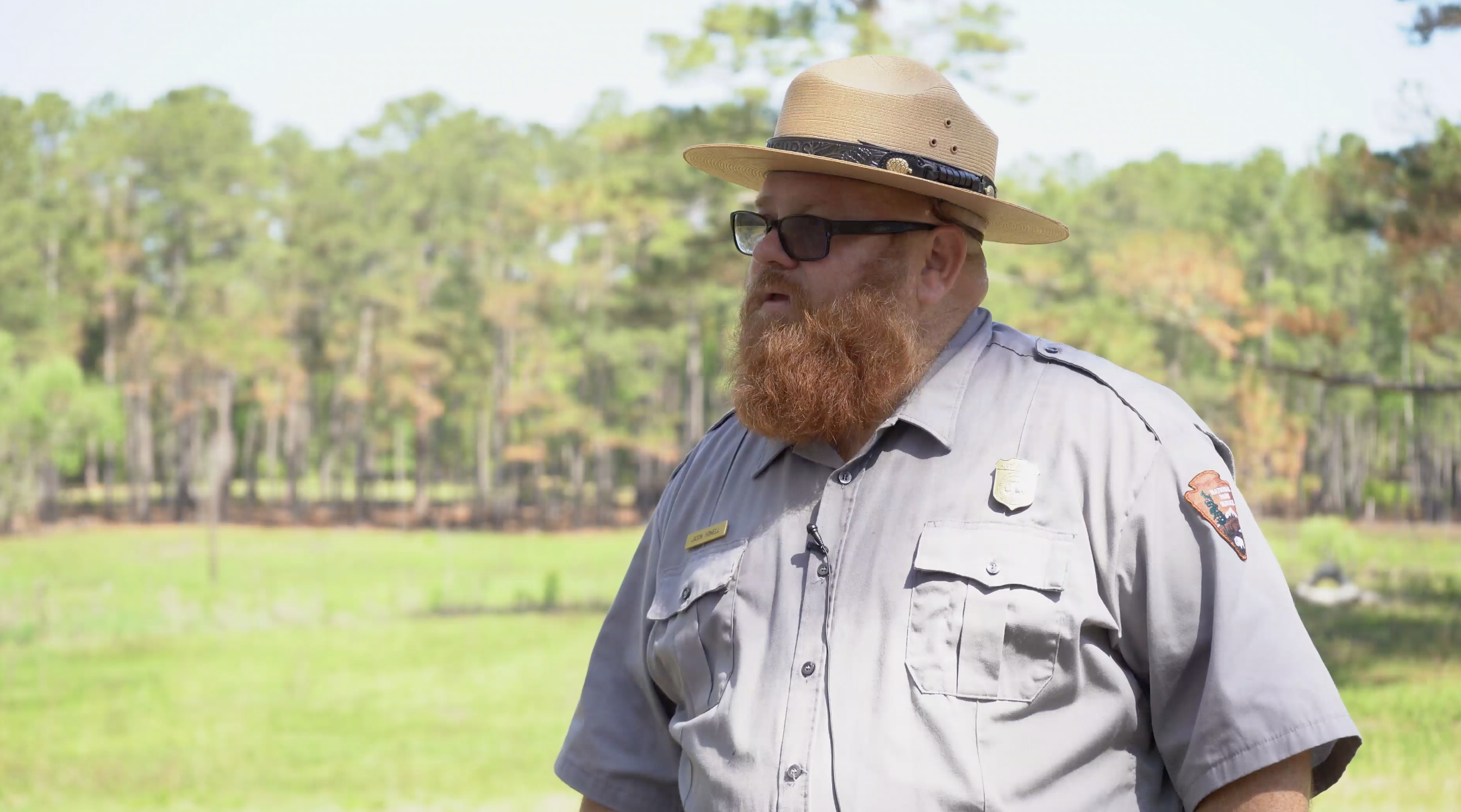
Episode 36 – April is North Carolina Guardian ad Litem Child Advocate Month and the latest episode of the All Things Judicial podcast focuses on the North Carolina Guardian ad Litem (GAL) program. Their mission is to equip community volunteers to serve abused and neglected children by advocating for their best interests in court.
This episode is hosted by Ruth Griffin, GAL Recruitment and Retention Specialist Lead, and guests are Reginald O'Rourke, GAL Associate Counsel, and Matt Wunsche, GAL Appellate Counsel.
"The National Court Appointed Special Advocates recognizes North Carolina's model as one of the best models in the nation because of the triune representation: (GAL) staff, volunteer, and the attorney in court," said O'Rourke on the podcast. "There are many states that have one part of that, but having all three is a wholistic way of making sure that we address every aspect of the child and the family."
To find out more about the North Carolina Guardian ad Litem program and how you can volunteer, please visit www.volunteerforGAL.org.
Episode 35 - This episode of All Things Judicial features an interview with former Chief Justice Henry Frye. Frye was the first African American associate justice and chief justice of the Supreme Court of North Carolina. Before that, he served as one of the first African American assistant United States district attorneys and first African American member of the North Carolina General Assembly in the 20th century.
In this 2004 interview conducted by former North Carolina Administrative Office of the Courts (NCAOC) Director Judge Tom Ross, Frye shares anecdotes about his early years growing up during segregation and his experience serving in North Carolina's legislature and on the Supreme Court.
"I thought I brought something to the court and tried to the best I could to look at things objectively but your background has a little something to do with how you look at what happens in the courtroom," said Frye on the podcast. "I think I handled it well and history will say whether I did or did not."
This interview is part of the Chief Justice's Commission on Professionalism's historical video series. A video of this interview can be viewed on the NCcourts YouTube Channel.
Episode 34 – This episode of the All Things Judicial podcast provides an update on the Raise the Age law through a conversation with attorneys and staff from the North Carolina Office of the Juvenile Defender (OJD). This episode's guests include Eric Zogry, State Juvenile Defender, Burcu Hensley, Assistant Juvenile Defender, and LaTobia Avent, Communications Manager.
OJD's mission is to provide services and support to juvenile defense attorneys, elevate and evaluate the system of juvenile delinquency representation, and work with juvenile justice advocates to promote positive change in the juvenile justice system.
"The main difference between juvenile court and adult criminal court is that we look at these young people as developing adults," said Zogry on the podcast. "It gives us the opportunity to say it's not just how old you are and what you're charged with, it's what else is going on with this youth, what does their prior record look like, and what are some available services that are not available in the criminal justice system."
Episode 33 – This bonus episode features a tour of Campbell University School of Law's exhibit entitled First Ladies of the North Carolina Judiciary. The exhibit contains rare photographs and artifacts of North Carolina's first women judges. The tour is conducted by Campbell Law School Dean J. Rich Leonard.
In addition to the audio podcast, a video tour of the exhibit is available on the NCcourts YouTube channel.
Episode 32 – This episode of the All Things Judicial podcast focuses on the Judicial Standards Commission, which serves as an arm of the Supreme Court of North Carolina to give advice regarding the Code of Judicial Conduct, provide training to judges on their ethical duties, and to evaluate and investigate complaints of judicial misconduct. In appropriate cases, the Commission initiates disciplinary proceedings against judges for the purpose of making disciplinary recommendations to the Supreme Court.
"Judges have to have the attitude that we are here to serve and not to be served," said Judge Chris Dillion on the podcast. "Just because (a judicial complaint) gets dismissed, doesn't necessarily mean it wasn't of some value, because they're all invaluable, because it helps us create better practices for that judge to make sure they are being perceived well by the public."
Guests are Judge Chris Dillon, chair of the Judicial Standards Commission, Carolyn Dubay, executive director of the Commission, and Commission members Allison Mullins and Donald Porter. They discuss the importance of the Commission in preserving public confidence in the integrity, impartiality, and independence of the Judicial Branch, the unique role that judges, lawyers, and citizens play in evaluating questions of judicial conduct, and some of the most common and concerning issues that come to the Commission’s attention. This episode was released in recognition of National Ethics Awareness Month, which is celebrated this year during the month of March.
Episode 31 – This episode of the All Things Judicial podcast features an interview with Mel Wright, Executive Director of the Chief Justice's Commission on Professionalism. The Commission plays an important role in providing continuing legal education to lawyers, and through the Professionalism Support Initiative, acts as an informal voluntary peer intervention program involving professionalism issues.
On this episode, Mr. Wright shared details about his background, the role and mission of the Commission, and some intriguing stories about professionalism, or lack thereof, in North Carolina's legal community.
"Legal ethics is the minimum standard required by the North Carolina State Bar, whereas professionalism is the higher standard expected of lawyers and judges," said Wright on the podcast. "Sometimes even judges say and do things that maybe they shouldn't say or do. Often when those type of things happen, I get a phone call."
Episode 30 – This bonus episode features a tour of Campbell University School of Law's exhibit entitled First African Americans on the North Carolina Bench. The tour is conducted by Campbell Law School Dean J. Rich Leonard.
The exhibit features a timeline of the lives and achievements of each judge and justice from 1968-2006. While today North Carolina has numerous African American judges, there were no African Americans on the bench in the Old North State prior the late 1960s.
In addition to the audio podcast, a video compilation is available on the NCcourts YouTube channel.
Episode 29 – This episode of All Things Judicial features an interview with civil rights pioneer Clarence Henderson who on February 2, 1960 helped launch the sit-in protests in Greensboro, North Carolina. Mr. Henderson shares his family background, his battle against racial discrimination in the U.S. Army, and his role in the historic events that unfolded that day which contributed to desegregation in the United States.
"Walking into F.W. Woolworth's I did not know how I was going to come out, in a vertical position in handcuffs going to jail, or perhaps in a prone position going to the hospital or even the morgue," said Henderson on the podcast. "This changed my total outlook on life. I began to realize that we all have defining moments, but those moments don't define us. It's what we do in those moments that define us."
This interview was conducted by Mel Wright, Executive Director of the Chief Justice's Commission on Professionalism, with an introduction by Chief Justice Paul Newby. A video version of this podcast is part of the commission's Historical Video Series.
Episode 28 – This episode of the All Things Judicial podcast focuses on the Judicial Branch's court reporters, who make verbatim records of court proceedings and prepare transcripts from those records for purposes such as appeals.
Guests are David Jester, Court Reporting Manager, and Susan Burgess, Court Reporting Coordinator. They discuss the importance of their role in the justice system and larger community, the advanced technology they employ, and their personal experiences in the court reporting profession. This episode was released in recognition of National Court Reporting and Captioning Week, which is celebrated this year during the week of February 5–12.
"Court reporters have an integral role," said Jester. "When I finish a transcript and send it to the Court of Appeals, I know that I am the only one who has a role in the trial court and the appellate process. I know everything that was said and I can communicate it to the Court of Appeals so they can give the case a meaningful review."
Episode 27 – This episode of All Things Judicial podcast focuses on WORTH Court, a Cumberland County specialized court designed to help human trafficking survivors with supportive care and intervention services. "WORTH" is an acronym given to the court to avoid labeling survivors with the negative stigma of human trafficking. WORTH stands for "We Overcome Recidivism Through Healing" and has been active in Cumberland County for approximately two years.
"Human Trafficking is everyone’s problem," said Chief District Court Judge Toni S. King, who is a primary proponent of the WORTH Court program. "WORTH Court hopes to be the beacon of light for those victims that thought their voices were silenced or unheard. A new beginning begins with healing."
The episode is hosted by Jennifer Haigwood, Chair of the North Carolina Human Trafficking Commission, and guests are Lindsey Lane, former Cumberland County Assistant District Attorney, and Bengie Hair, coordinator of the Cumberland County WORTH Court program. This episode is being released during National Slavery and Human Trafficking Prevention Month and Human Trafficking Awareness Month.
Episode 26 – This episode of the All Things Judicial podcast features highlights from six of the 25 episodes produced during its inaugural season. Highlights include topics from the North Carolina Human Trafficking Commission, Chief Justice's Commission on Professionalism, Chief Justice's Task Force on ACEs-Informed Courts, North Carolina Innocence Inquiry Commission, and interviews regarding the subjects of Black History Month and the Cherokee Sovereign Nation's tribal courts.
Launched in February 2021, the podcast focuses on the Judicial Branch's role as an equal branch of state government by featuring interviews with recognizable Branch officials and covering the many functions, areas of responsibility, innovations, commissions, task forces, and roles within the Branch. All Things Judicial has received approximately 6,000 downloads from listeners in 33 countries.
Judicial Branch staff and officials would like to thank all podcast listeners for their support, and encourage listeners to contact [email protected] with any feedback on the podcast and suggestions for topics of interest for future episodes.
Episode 25 – This episode of All Things Judicial focuses on the State Employees Combined Campaign (SECC) and a selection of charities supported by Judicial Branch employees. Chief Justice Paul Newby kicks-off the podcast with a holiday greeting to Branch employees and is followed by a series of interviews with representatives from the SECC, Second Chance Pet Adoptions, North Carolina Museum of Art, and Families Together. A video version of the interviews can be found on the NCcourts YouTube channel.
"As Chief Justice, the head of the Judicial Branch, I want to say how grateful I am for each one of you and all that you do everyday to fulfill our constitutional mandates that the courts will be open and justice will be administered without favor, denial, or delay," Newby said on the podcast.
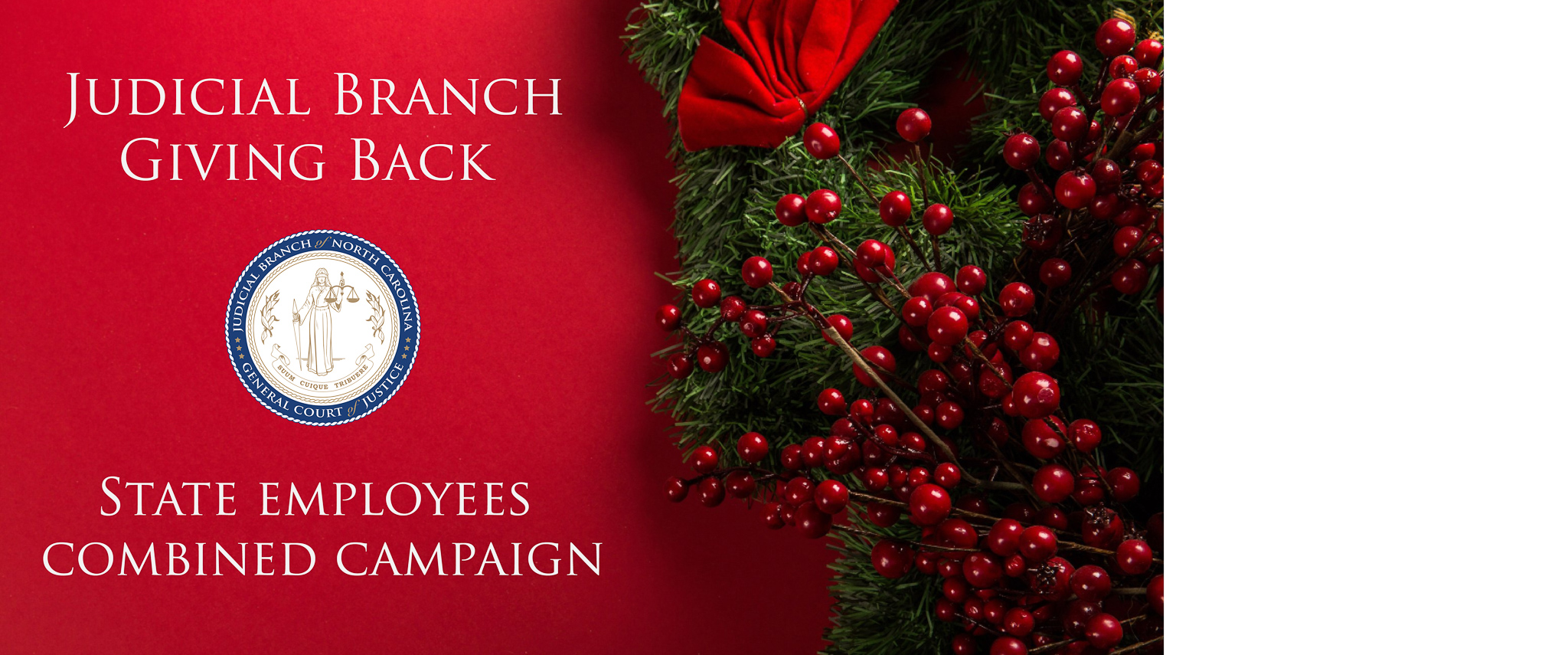
Episode 24 – This episode of All Things Judicial focuses on the historic budget commitments made by the state legislature to the Judicial Branch in the bi-partisan spending plan passed in November 2021. The recent state budget made the largest investment ever in the Judicial Branch, fully funded eCourts modernization, and allowed the Branch to retain hundreds of employees essential to fulfilling the Branch's constitutional mandate to keep courts open to administer justice.
This episode is hosted by Legislative Liaison Joseph Kyzer and guests include Chuck Spahos, liaison for the North Carolina Conference of District Attorneys, and North Carolina Administrative Office of the Courts Deputy Director Ryan Boyce.
"This budget truly is transformative for the court system," Boyce said on the podcast. "It invests in some once-in-a-generation initiatives, eCourts being the main one, but most importantly it invests in our personnel, our people here in the Judicial Branch."
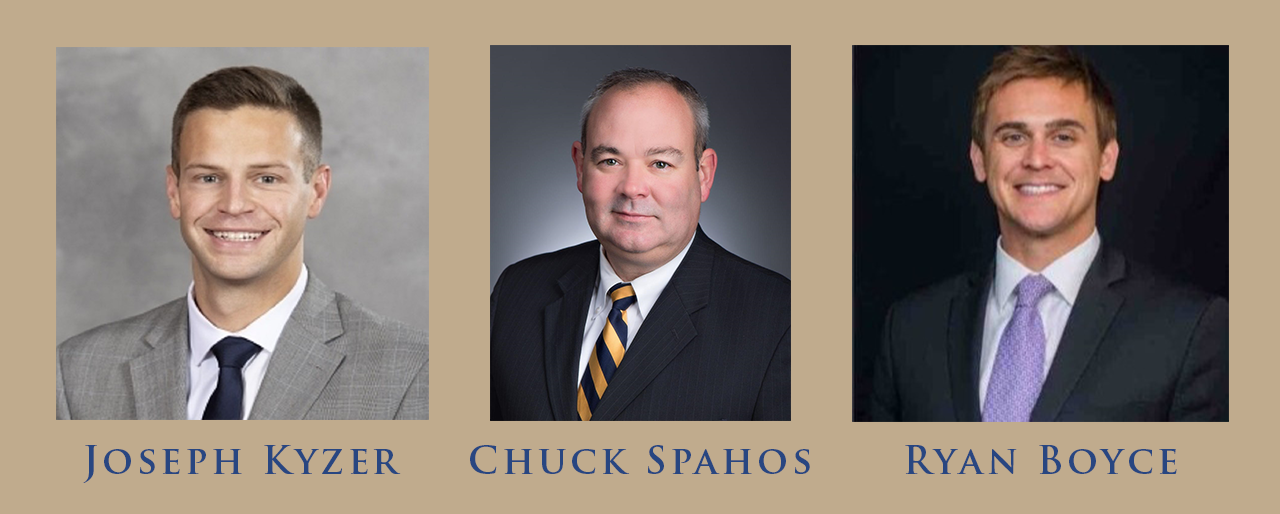
Host
- Joseph Kyzer, Legislative Liaison, North Carolina Administrative Office of the Courts
Guests
- Chuck Spahos, Legislative Liaison, North Carolina Conference of District Attorneys
- Ryan Boyce, Deputy Director, North Carolina Administrative Office of the Courts
Episode 23 – This episode of All Things Judicial focuses on the Cherokee Tribal Courts of the Eastern Band of the Cherokee Indians. Chief Judge Monty Beck and Associate Judge Barbara "Sunshine" Parker were interviewed and discussed the structure of Cherokee Tribal Courts, jurisdiction over enrolled and non-enrolled individuals, and the effect that gaming has had on the Cherokee sovereign nation.
In addition, judges Beck and Parker offered themselves as resources for North Carolina attorneys and judges who have questions about the Indian Child Welfare Act (ICWA) and how it applies in state courts.
"We are a sovereign that I hope attorneys and judges are learning about," Judge Parker said during the podcast. "I hope the judges who listen are learning ICWA, are learning that it applies in their courts, and that they are going to need to know how to use it."
Each November, the Judicial Branch recognizes American Indian Heritage Month and celebrates the history and heritage of American Indians in North Carolina.
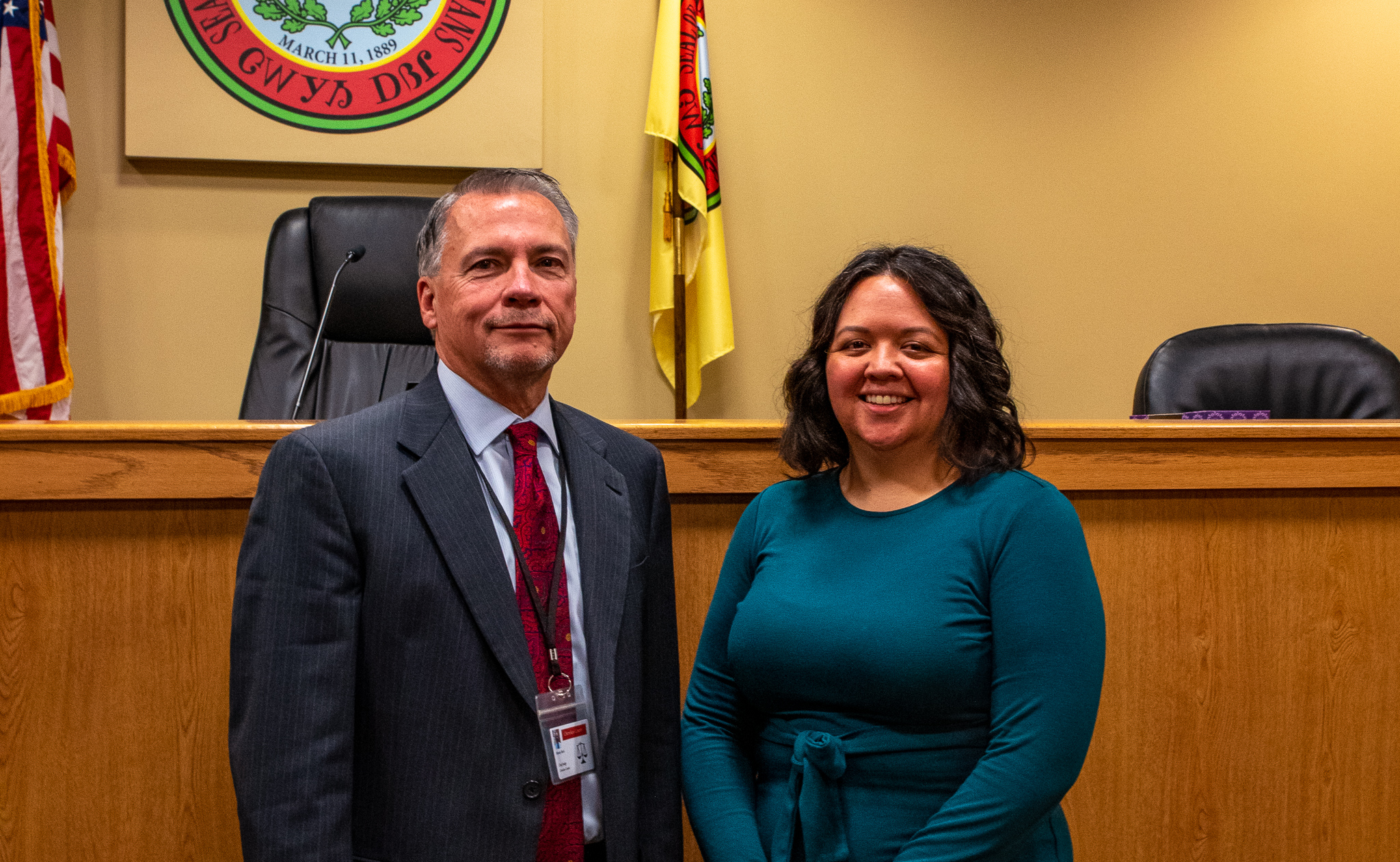
Episode 22 – This episode of All Things Judicial features a 2016 interview with the late North Carolina Court of Appeals Judge E. Maurice Braswell. Braswell served as a tail gunner and bombardier in a Boeing B-17 Flying Fortress named the "Flaming Arrow" that recorded 41 bombing missions against the Axis Powers during World War II. Judge Braswell recounts several near misses and the harrowing experience of crash landing and being captured as a POW behind enemy lines. Through it all, Braswell shunned the the title of hero and instead embodied a life of service to his country and home state of North Carolina.
"In our generation, there was nothing but a great over-pouring of patriotism and willingness to go to war with Japan and Germany after Pearl Harbor. We felt like we were just doing our duty and being made a hero is still foreign to me in spite of awards," Judge Braswell said on the podcast. "If I could be of service to my state, I was going to do it. If I could be of service to my family and fellow man, I'm happier doing that."
After the war, Judge Braswell served as an assistant district attorney and superior court judge in Cumberland County, and served on the North Carolina Court of Appeals. Braswell died in January 2017 and the new Cumberland County Courthouse was named in his honor.
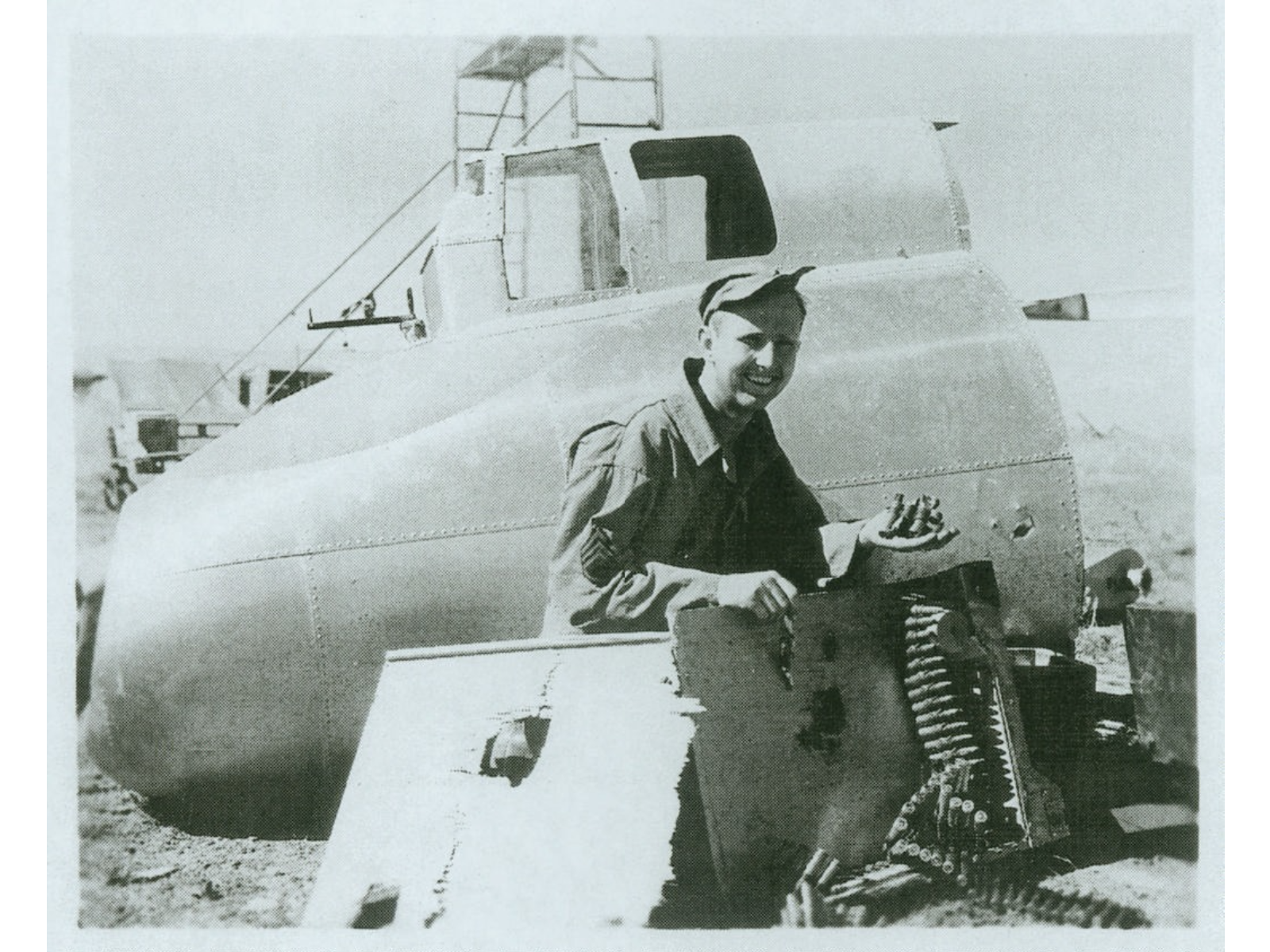
Episode 21 – This episode of All Things Judicial is a crossover with the Judicial Branch's award-winning Fright Court YouTube series, which questions whether some of North Carolina's courthouses are haunted.
The episode begins by exploring the murder and subsequent alleged hauntings associated with the 1901 death of Elizabeth City resident Nell Cropsey. State Archivist Sarah Koonts walks us through the original Supreme Court of North Carolina case files related to the trial of Cropsey's accused murderer, Jim Wilcox, who is believed to be the only defendant to appear twice before the high court.
In the second segment, a "paranormal investigation team" conducts a "ghost hunt" in the historic Cumberland County courthouse and seeks to answer the question as to whether North Carolina's courthouses are haunted. A video of the investigation is posted on the NCcourts YouTube channel.
AWARDS
Released on YouTube each Halloween season, the Judicial Branch's Fright Court and Haunted Courthouses of North Carolina series have proven to be the most popular videos on the NCcourts YouTube channel. Designed to draw attention to the Branch in a fun and interesting way, the series is on its twelfth episode and has earned almost 8,500 views. In addition, the North Carolina Association of Government Information Officers awarded the Fright Court video series first place in videography in 2019 and 2020. This is the first crossover episode with the All Things Judicial podcast.
Episode 20 – This episode of All Things Judicial features Alternative Dispute Resolution, highlights the work of the Dispute Resolution Commission, and focuses on the Administrative Office of the Court's promotion of mediation and arbitration in North Carolina. The episode was released today in celebration of Conflict Resolution Day on October 21, and Dispute Resolution Week which is recognized by the American Bar Association as the third week in October. Guests include Judge Phyllis Gorham, Tara Kozlowski, and Maureen Robinson with an introduction given by Chief Justice Paul Newby.
"Our state constitution guarantees the courts shall be open and justice is to be administered without favor, denial, or delay. Our alternative resolution groups allow us to make these constitutional promises a reality," Chief Justice Newby said on the podcast. "North Carolina has demonstrated a strong commitment to developing programs which promote dispute resolution in our courts."
EPISODE GUESTS
Judge Phyllis Gorham, New Hanover County Senior Resident Superior Court Judge and Chairwoman of the Dispute Resolution Commission
Tara Kozlowski, Executive Director, Dispute Resolution Commission
Maureen Robinson, Administrative Assistant, Dispute Resolution Commission
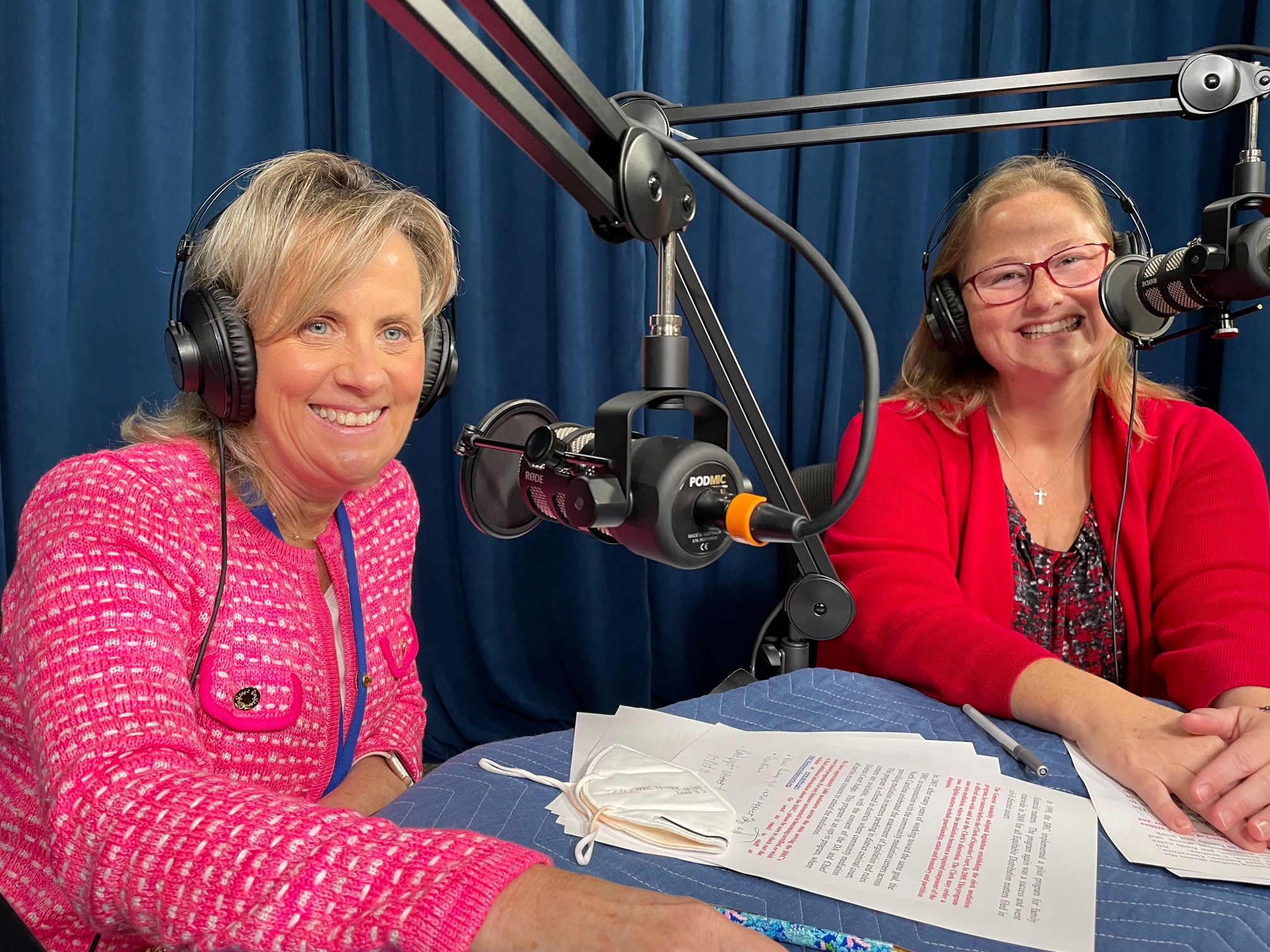
Episode 19 – This episode of All Things Judicial features the final part of a three-part series on the North Carolina Innocence Inquiry Commission (NCIIC). This episode is hosted by Executive Director Lindsey Guice Smith and focuses on the roles and experiences of the Commission's staff. In one riveting segment, staff members give firsthand accounts of their participation in investigations that uncovered post-conviction evidence that led to the exoneration of incarcerated individuals. This episode's guests are Catherine Matoan, Beth Tanner, and Brian Ziegler.
"A large percentage of Commission cases that have resulted in exonerations came after we located evidence that someone else said had been destroyed," Lindsey Guice Smith said on the podcast. "It's really important that we do those searches, ask those questions, and do those follow-ups."
GUESTS
Lindsey Guice Smith, Executive Director
Beth Tanner, Associate Director
Catherine Matoan, Grant Staff Attorney
Brian Ziegler, Staff Attorney
Episode 18 – This episode of All Things Judicial celebrates Constitution Day (September 17) with a visit to the North Carolina State Archives and a viewing of some of North Carolina's most precious historic documents. Division of Archives and Records Director Sarah Koonts led the tour where she shared original colonial court records. Koonts then opened the State Archive's vault for the inspection of some of North Carolina's national treasures, including an original copy of the U.S. Constitution's Bill of Rights. Later in the episode, Chief Justice Paul Newby detailed an account of the theft of this copy of the Bill of Rights from the North Carolina State Capitol during the American Civil War, and his participation in an FBI sting operation that recovered it in 2003.
"The Bill of Rights is so beautiful and has such a great story about its theft and recovery," said Sarah Koonts. "I always feel special when I look at that document."
GUESTS
Sarah Koonts, Director of the Division of Archives and Records, is North Carolina's state archivist and deputy secretary at the North Carolina Department of Natural and Cultural Resources. She became North Carolina's State Archivist in 2012. Working with a staff of nearly 70, Koonts is responsible for the statewide archives and records management programs operated by the division.
Chief Justice Paul Newby, the 30th Chief Justice of the Supreme Court of North Carolina, first was elected to the Supreme Court as Associate Justice in 2004 and was elevated to the highest judicial office in North Carolina in the 2020 election.
In 1985, Chief Justice Newby was appointed as an assistant United States attorney for the Eastern District of North Carolina in Raleigh, where he served for over 19 years. During this time, he played an integral role in conducting the undercover sting operation that recovered North Carolina’s original copy of the Bill of Rights, stolen in the aftermath of the Civil War.
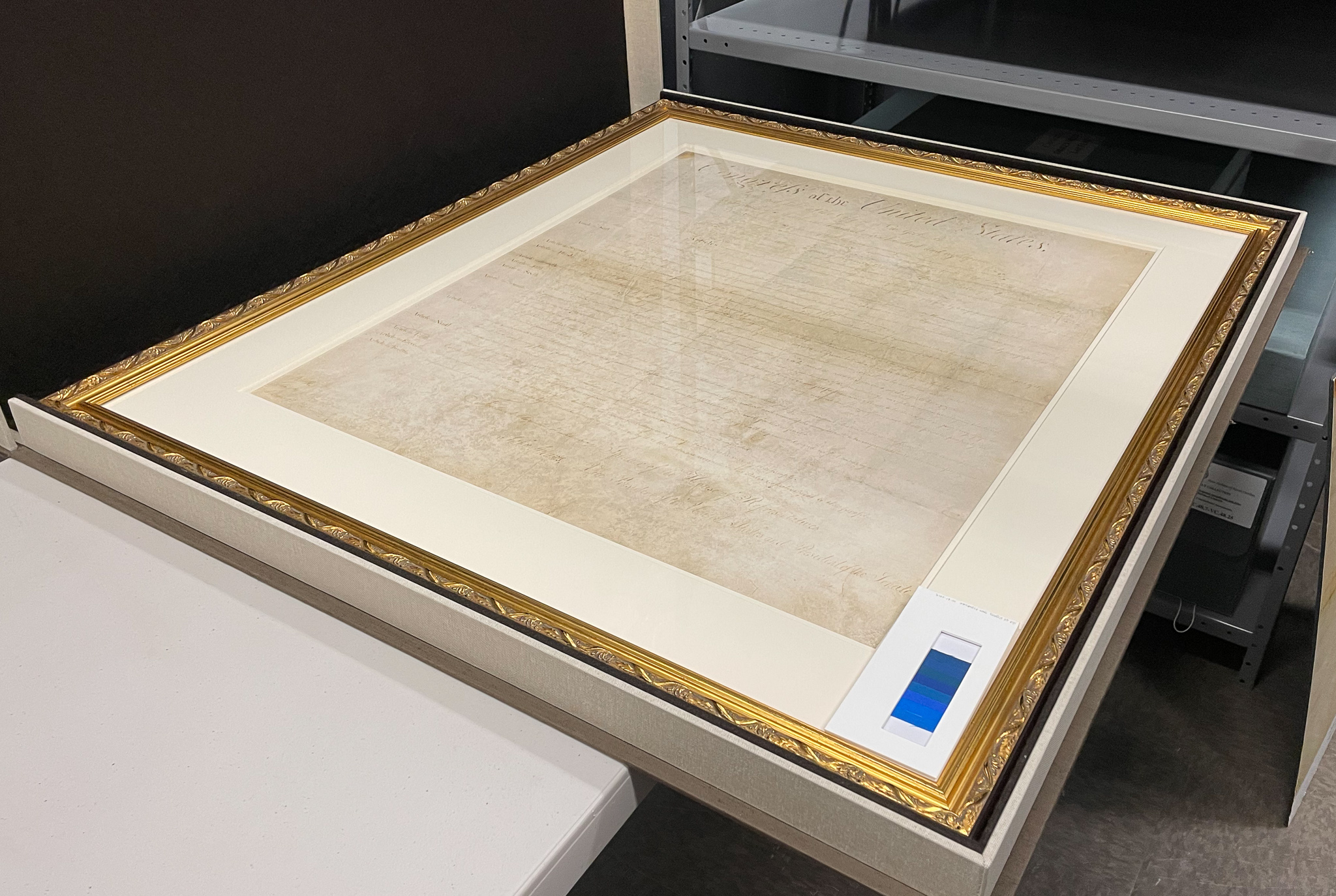
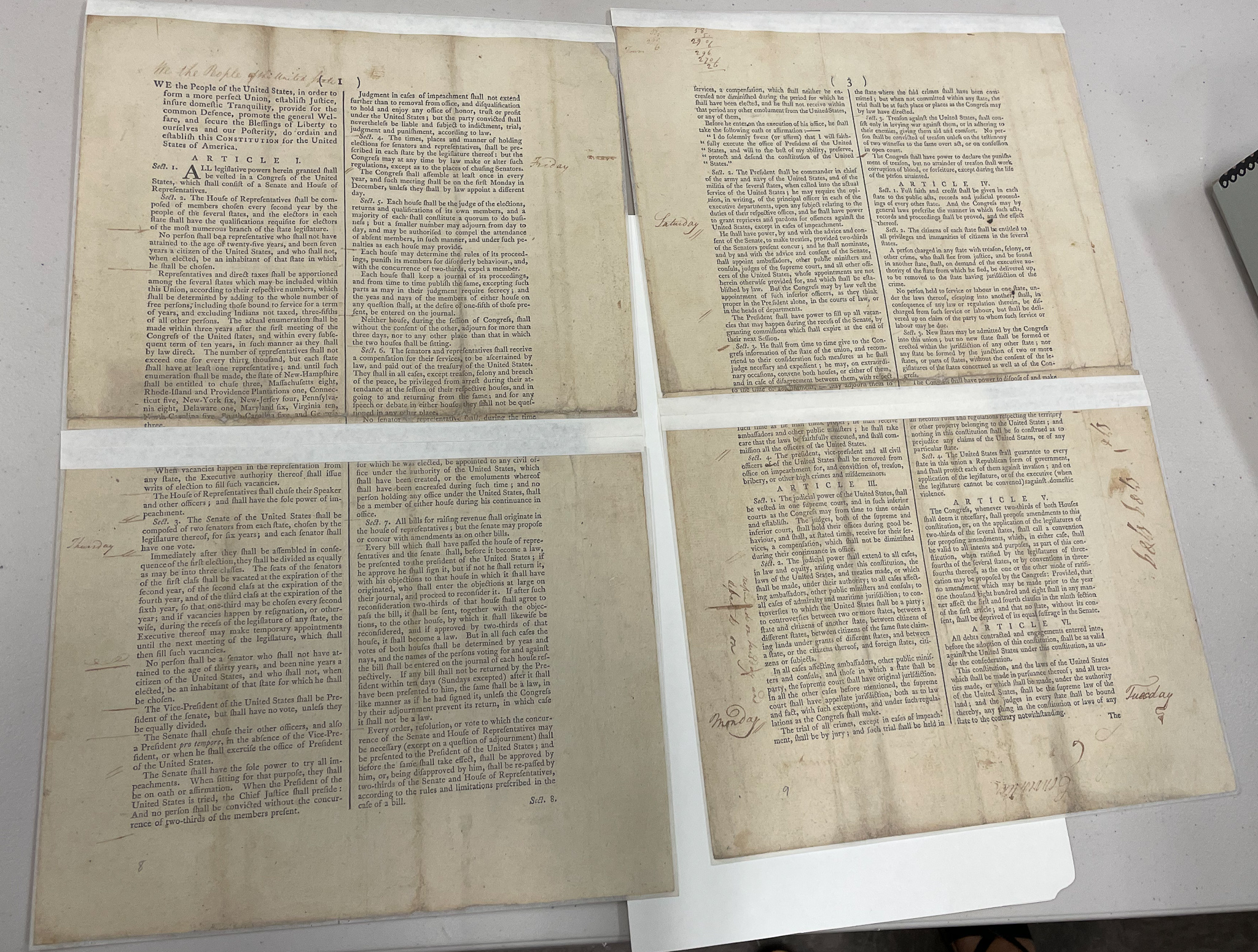
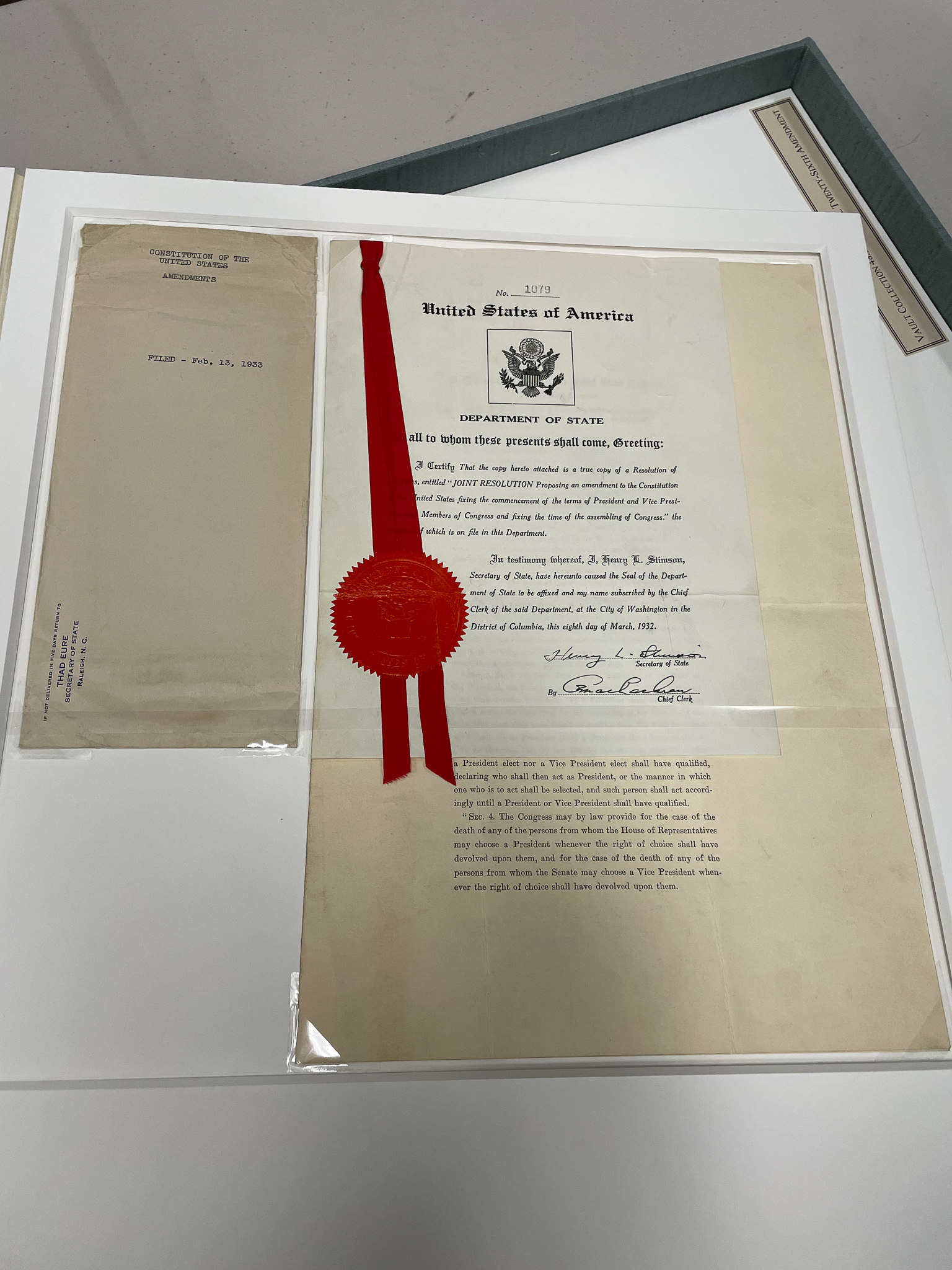
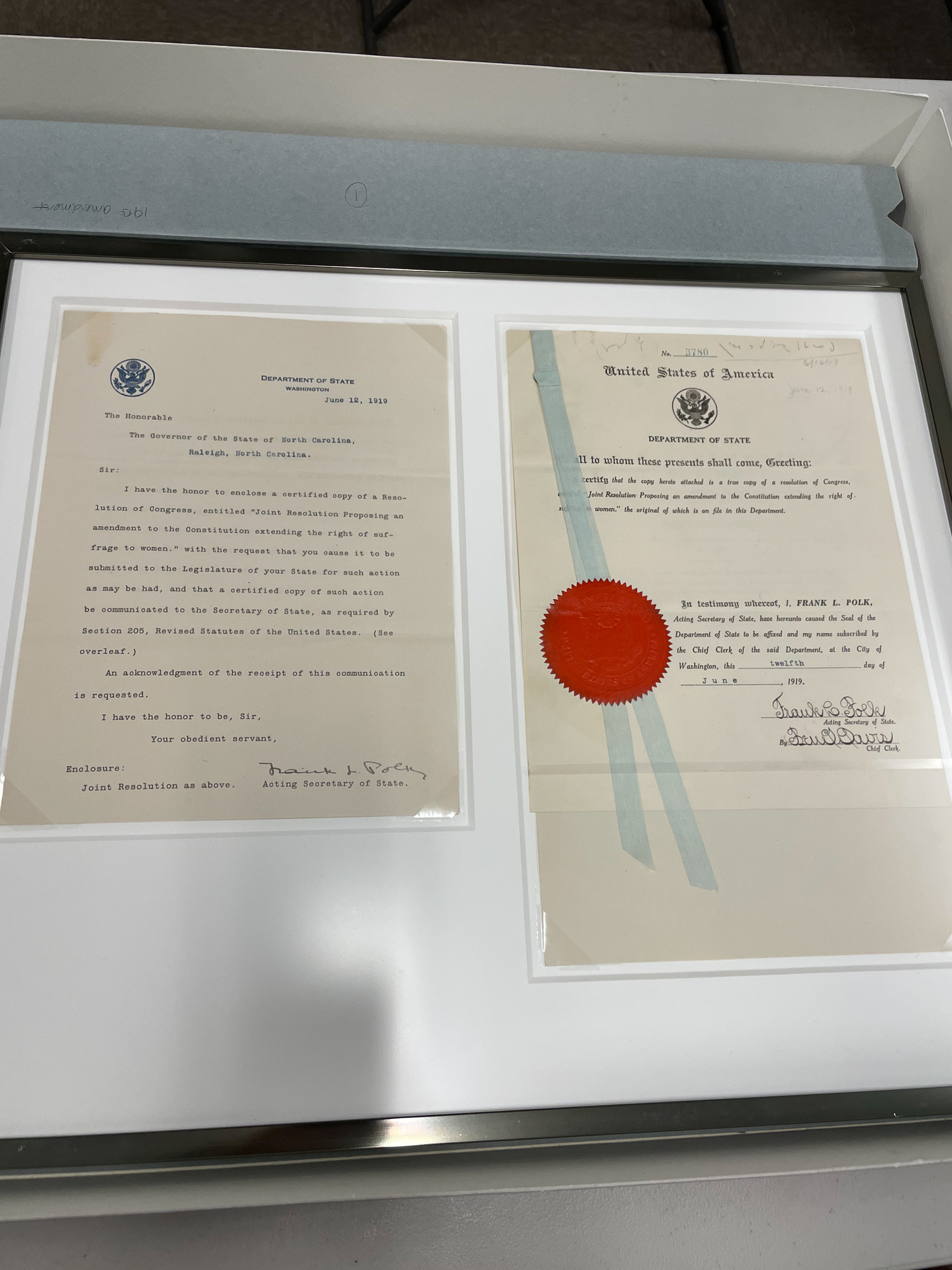
Episode 17 – This episode of All Things Judicial features excerpts from an interview with former Chief Justice Rhoda Billings. The interview was conducted in 2016 by former president of the North Carolina Bar Association, John R. “Buddy” Wester, as part of the Chief Justice's Commission on Professionalism's Historical Video Series. During her career, Chief Justice Billings served as a district court judge, associate justice, and the 22nd chief justice of the Supreme Court of North Carolina. She was the second woman associate justice and second woman to serve as chief justice. In addition, she is the only person to have served as president of the North Carolina Bar Association and chief justice of the Supreme Court of North Carolina.
EPISODE INTERVIEWER AND GUESTS
Former Chief Justice Rhoda Billings is a native of Wilkesboro and was the only woman in the class of 1966 at Wake Forest University School of Law, where she graduated first in her class. She practiced law with her husband, Don Billings, from 1966 to 1968, and served as a U.S. Bankruptcy Chapter 13 Trustee from 1966 to 1967. When the district court system was established in North Carolina, Chief Justice Billings was one of five successful candidates and the only woman elected to serve in Forsyth County. She joined the law school faculty at Wake Forest in 1973, serving one year as an assistant professor of law and as an associate professor of law from 1974 to 1979. She attained the rank of professor in 1980.
While on leave from the law school from August 1984 to January 1987, Chief Justice Billings practiced with Billings, Burns and Wells, chaired the North Carolina Parole Commission, and served on the Supreme Court in 1985 to 1986. She also served as a member of the State Judicial Council, an advisory and oversight body for the North Carolina Judicial Branch that helps to study and monitor the operations of the court system and identify areas for improvement.
Chief Justice Billings also served extensively with the North Carolina Bar Association throughout her distinguished career. She became the first woman to serve as its president and is the second woman to receive the Judge John J. Parker Award.
John R. "Buddy" Wester is a litigator at the Charlotte law firm of Robinson Bradshaw. Mr. Wester has also served as president of the North Carolina Bar Association and as a member of the North Carolina Chief Justice’s Commission on Professionalism.
Episode 16 – This episode of All Things Judicial features part two of a three-part series on the North Carolina Innocence Inquiry Commission. Part two is hosted by Associate Director Beth Tanner and focuses on the Commission's victim services. This episode's guests are Robin Colbert, Katie Monroe, and Emma Paul. Part three of this series will be released in September and will focus on the work and roles of the Commission staff. "We have really worked hard on making sure we are focusing on the victim's experiences and making sure they have a space to be heard and are informed about the process when they should be," Beth Tanner said on the podcast.
EPISODE HOST AND GUESTS
Beth Tanner, Associate Director, North Carolina Innocence Inquiry Commission
Robin Colbert, Associate Director, North Carolina Coalition Against Sexual Assault; and Commissioner, North Carolina Innocence Inquiry Commission
Katie Monroe, Executive Director, Healing Justice
Emma Paul, Victim Services Coordinator, North Carolina Innocence Inquiry Commission
Episode 15 – This episode of All Things Judicial focuses on civics education in North Carolina. It begins with interviews with social studies teachers about their experiences with teaching students about our systems of government. Later in the episode, you will hear from Chief Justice Paul Newby and Associate Justice Samuel Ervin IV who led the Supreme Court of North Carolina's civics education outreach in 2019. Listeners will also learn about the Judicial Branch's free civics education materials and Speakers Bureau that are available to educators and others who are interested in making civics education more accessible in North Carolina.
"I hope to inspire students to dig deeper to see that the American experiment is payed forward one generation at a time," Chief Justice Newby said on the podcast. "It will be up to them to look at who we are as a people and make the determination how to shape us."
Episode 14 - This episode features part one of a three-part series on the North Carolina Innocence Inquiry Commission. It examines the purpose of the Commission, gives an overview of its structure, and commissioners share why they volunteered for their roles and detail the most interesting cases of their tenures. Parts two and three will be released in August and September and will focus on the Commission's victim advocates and the Commission staff.
"Despite our best efforts, mistakes are made. There has to be a system that can correct these mistakes because if there isn't, everybody loses," Commissioner Boswell said on the podcast. "I wish everyone understood the importance of the Commission and all the factors that come into play."
EPISODE HOST AND GUESTS
- Lindsey Guice Smith, Executive Director of the North Carolina Innocence Inquiry Commission
- Johnson Britt, Criminal Defense Lawyer and Commissioner on the North Carolina Innocence Inquiry Commission
- Rick Glazier, Executive Director of the North Carolina Justice Center and Commissioner on the North Carolina Innocence Inquiry Commission
- John Boswell, Chief Operating Officer of Zoe Empowers and Commissioner on the North Carolina Innocence Inquiry Commission
Episode 13 – July is Juror Appreciation Month in North Carolina and the most recent episode of All Things Judicial focuses on jury service. The host and guests explore the history of jury service, what to expect when asked to serve on a jury, and dispel common myths about jury service. In the second segment of the episode, All Things Judicial conducts interviews with average North Carolinians about their thoughts on jury service.
"Jury service is a vital part of our country," Wake County Clerk of Superior Court Blair Williams said on the podcast. "Jurors play a part in our judicial system and that is what makes us unique in this world."
EPISODE GUESTS
- Blair Williams, Wake County Clerk of Superior Court
- Alicia Blanco, Wake County Deputy Clerk
- Rosie Rijo Gonzalez, Wake County Assistant Clerk
- DeShield Greene, Court Management Specialist for the North Carolina Judicial Branch
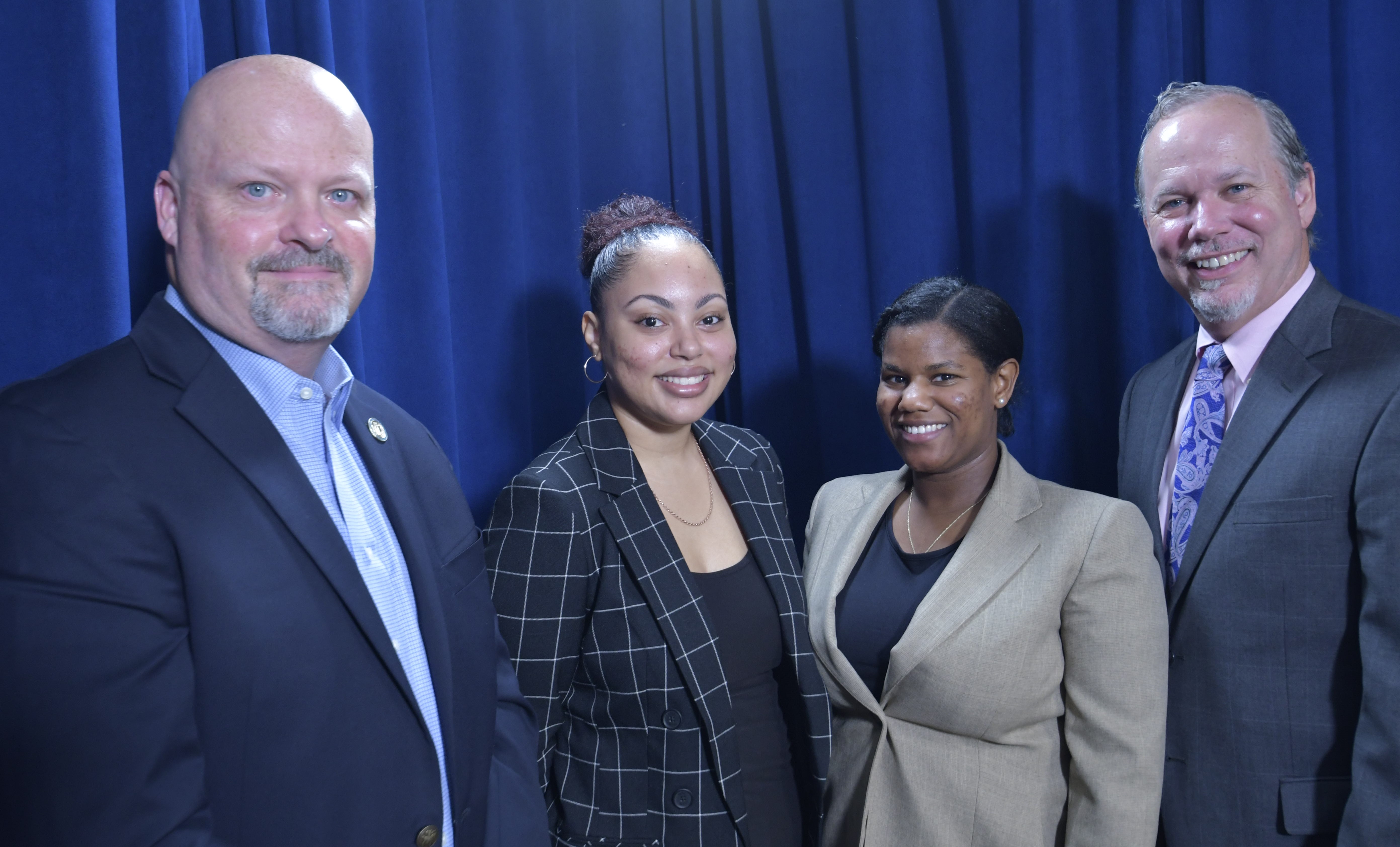
Episode 12 – This episode of All Things Judicial focuses on ACEs-informed courts. ACEs refers to adverse childhood experiences of some children who appear in North Carolina courts. In May, the Judicial Branch formed the Chief Justice's Task Force on ACEs-Informed Courts to examine the impact of ACEs on children and develop strategies for addressing adverse childhood experiences within our court system. This episode's guests include NCAOC Director Judge Andrew Heath, District Attorney Ben David, Bolch Judicial Institute Assistant Director of Special Projects Amelia Thorn, and Court Management Specialist Lori Cole.
"We can prevent crime, not just respond to it," District Attorney Ben David said on the podcast. "If we all get on the same page with what it truly means to be trauma informed, to be ACEs informed, we know the path forward and we need to act now."
EPISODE GUESTS
Judge Andrew Heath, Director of the North Carolina Administrative Office of the Courts, and Co-Chair of the Chief Justice's Task Force on ACEs-Informed Courts.
Ben David, District Attorney for New Hanover and Pender Counties, and Co-Chair of the Chief Justice's Task Force on ACEs-Informed Courts.
Amelia Thorn, Bolch Judicial Institute Assistant Director of Special Projects, Articles Editor at Judicature, and Member of the Chief Justice's Task Force on ACEs-Informed Courts.
Lori C. Cole, Court Management Specialist for the North Carolina Judicial Branch.
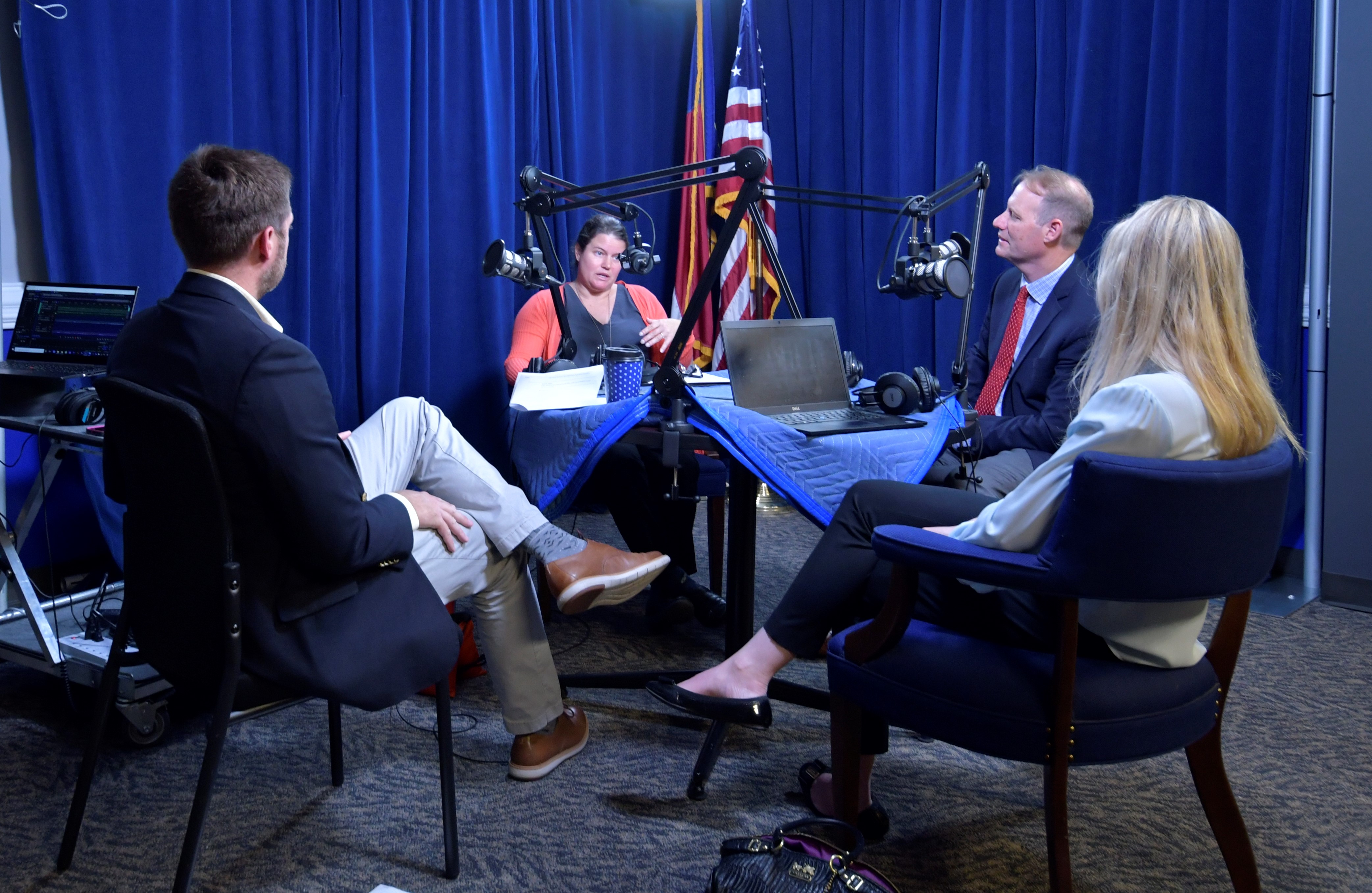
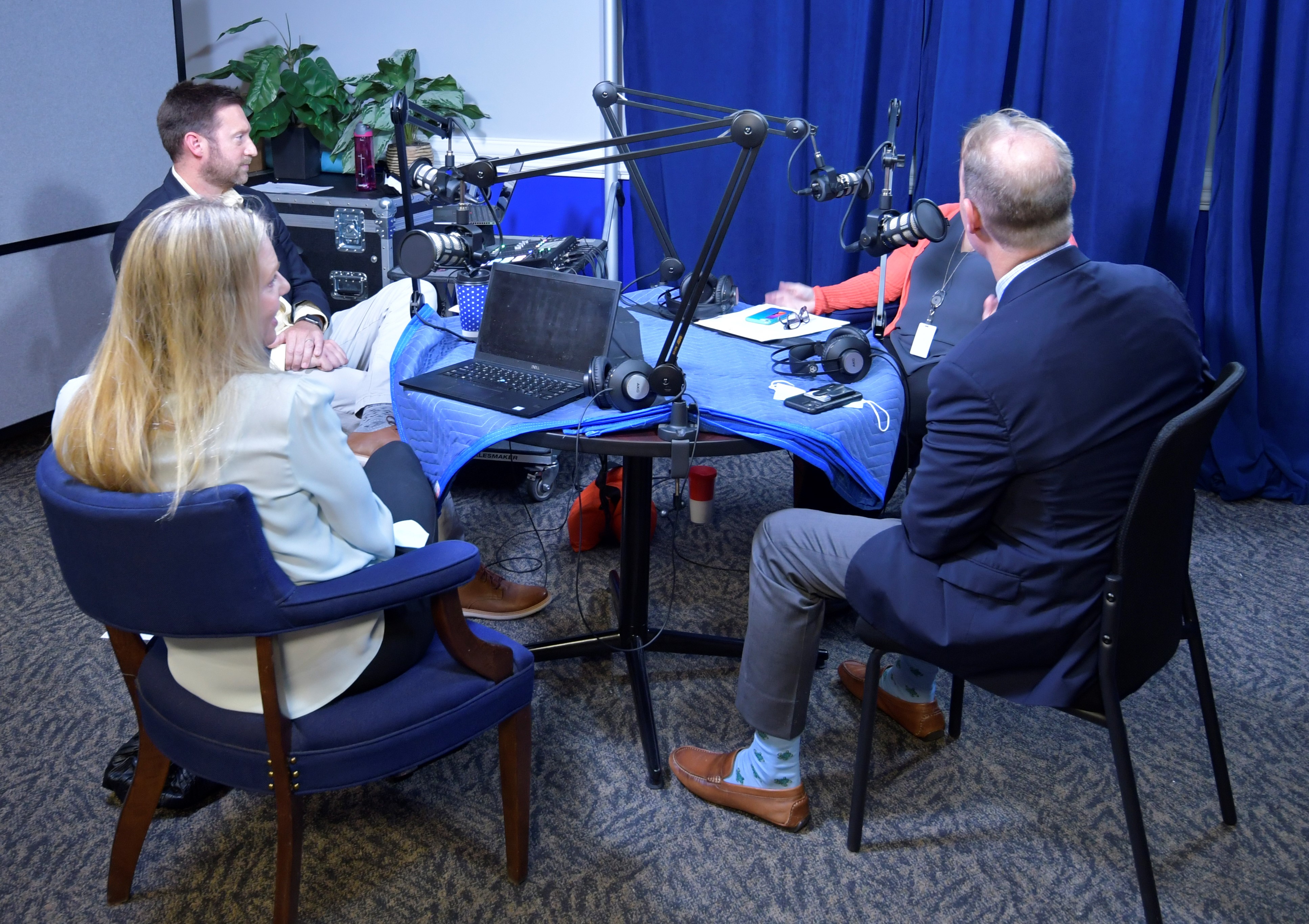
Episode 11 – This episode of All Things Judicial features excerpts from an interview with former Chief Justice I. Beverly Lake Jr. The interview was conducted in 2006 by former Associate Justice Willis Whichard as part of the Chief Justice's Commission on Professionalism's Historical Video Series. Chief Justice Lake served as a superior court judge, associate justice, and chief justice of the Supreme Court of North Carolina. In 2002, Lake established the Criminal Justice Study Commission to review factors that may contribute to wrongful convictions in North Carolina. The study commission recommended reforms which led to the creation of the Innocence Inquiry Commission in 2006.
"We have the best criminal justice system in the world, but that doesn't mean we can't make it better," former Chief Justice Lake said in the podcast. "It is incumbent on members of the legal profession to take that leadership role, step into that public service arena, accept that responsibility, and teach and guide and lead our people in the right direction pursuant to the blueprint laid out in our Constitution."
Interviewer and Guest
- Former Chief Justice I. Beverly Lake Jr. was appointed as a superior court judge in 1985. Lake was appointed as an associate justice on the Supreme Court of North Carolina in 1992, but was defeated for election that same year. He was elected as an associate justice in 1994 and elected as the court's chief justice in 2000. During his tenure as chief justice, Lake established a study commission which led to the creation of the Innocence Inquiry Commission, the first of its kind in United States. Lake served as chief justice until his retirement in 2006 and passed away in 2019.
- Former Associate Justice Willis Whichard was appointed to the North Carolina Court of Appeals in 1980 where he served until he became an associate justice of the Supreme Court of North Carolina in 1986. He retired from the court in 1998 and served as dean of the Norman Adrian Wiggins School of Law at Campbell University until 2006. After that, Whichard has worked as an attorney in private practice.
Episode 10 – In this episode, All Things Judicial takes a deep-dive into the history, story, and controversy surrounding this event. Guests are Chief Justice Paul Newby who shares the origins of our rights and liberties contained in America's founding documents, and Robert Ryals who takes listeners on a tour of Charlotte's Liberty Walk to visit historical locations around the Queen City. In addition, author and attorney Scott Syfret discusses the controversy surrounding the declaration and its impact on North Carolina and the city of Charlotte over the years.
"The 'shot heard round the world' is the fact that our rights don't come from King George. Our rights come from a higher source," Chief Justice Newby said in the podcast. "That's the beauty of our system where we say our rights come from God, our creator, that all are created equal and are endowed by our creator with certain inalienable rights, life, liberty, pursuit of happiness."
Guests
- Chief Justice Paul Newby is the 30th Chief Justice of the Supreme Court of North Carolina. Chief Justice Newby was first elected to the Supreme Court as associate justice in 2004 and was elevated to the highest judicial office in North Carolina in the 2020 election. In addition to his service on the court, he is an adjunct professor at Campbell University School of Law, where he teaches courses on state constitutional law and appellate practice. He is the co-author of The North Carolina State Constitution with History and Commentary (2nd ed. 2013) with Professor John V. Orth of the University of North Carolina School of Law.
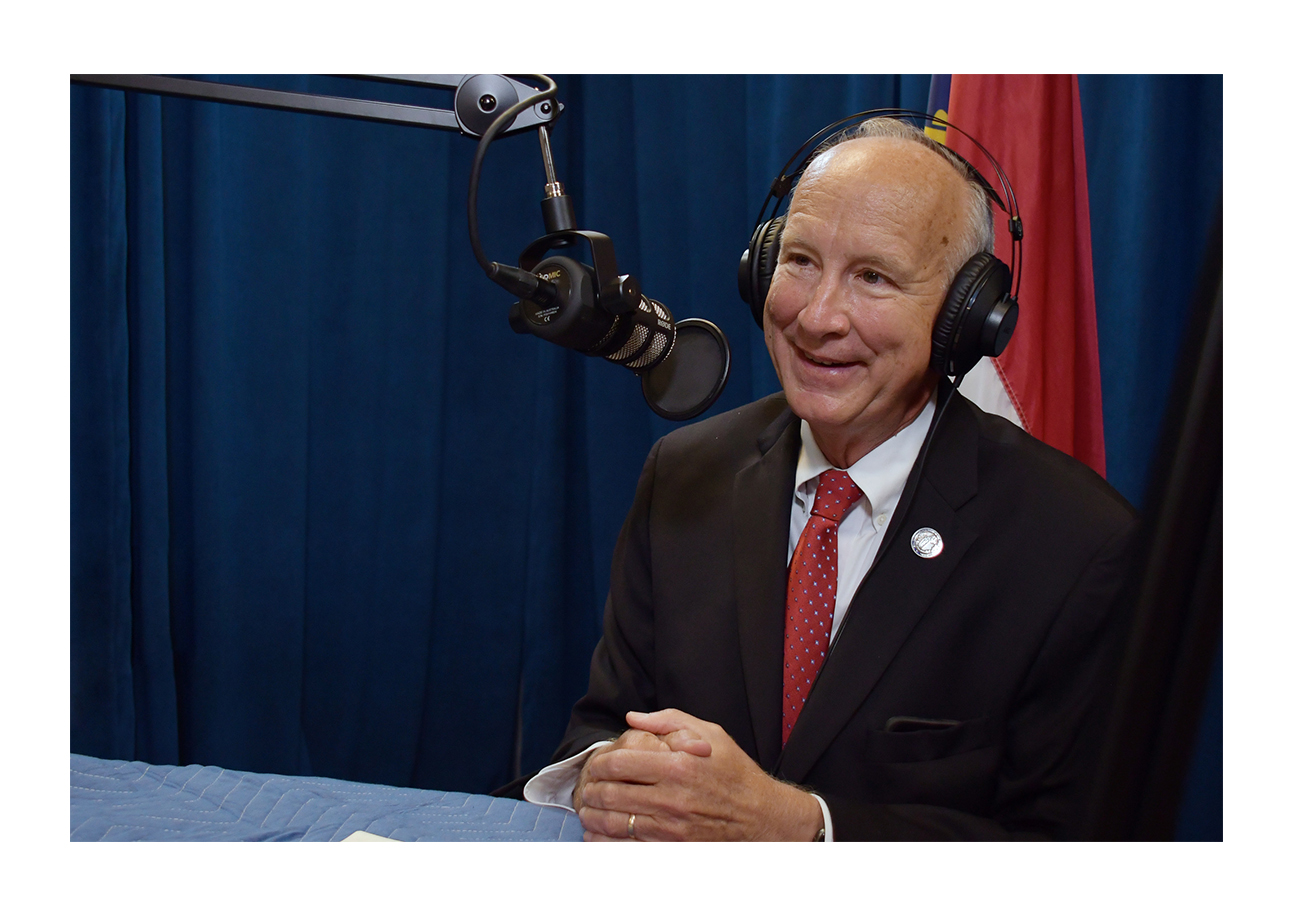
- Robert Ryals is a docent for the Mecklenburg Historical Association. He specializes in creating and delivering interpretive talks and educational programs for historical venues and organizations throughout metropolitan Charlotte. Tours of the Liberty Walk are available through the the Mecklenburg Historical Association.
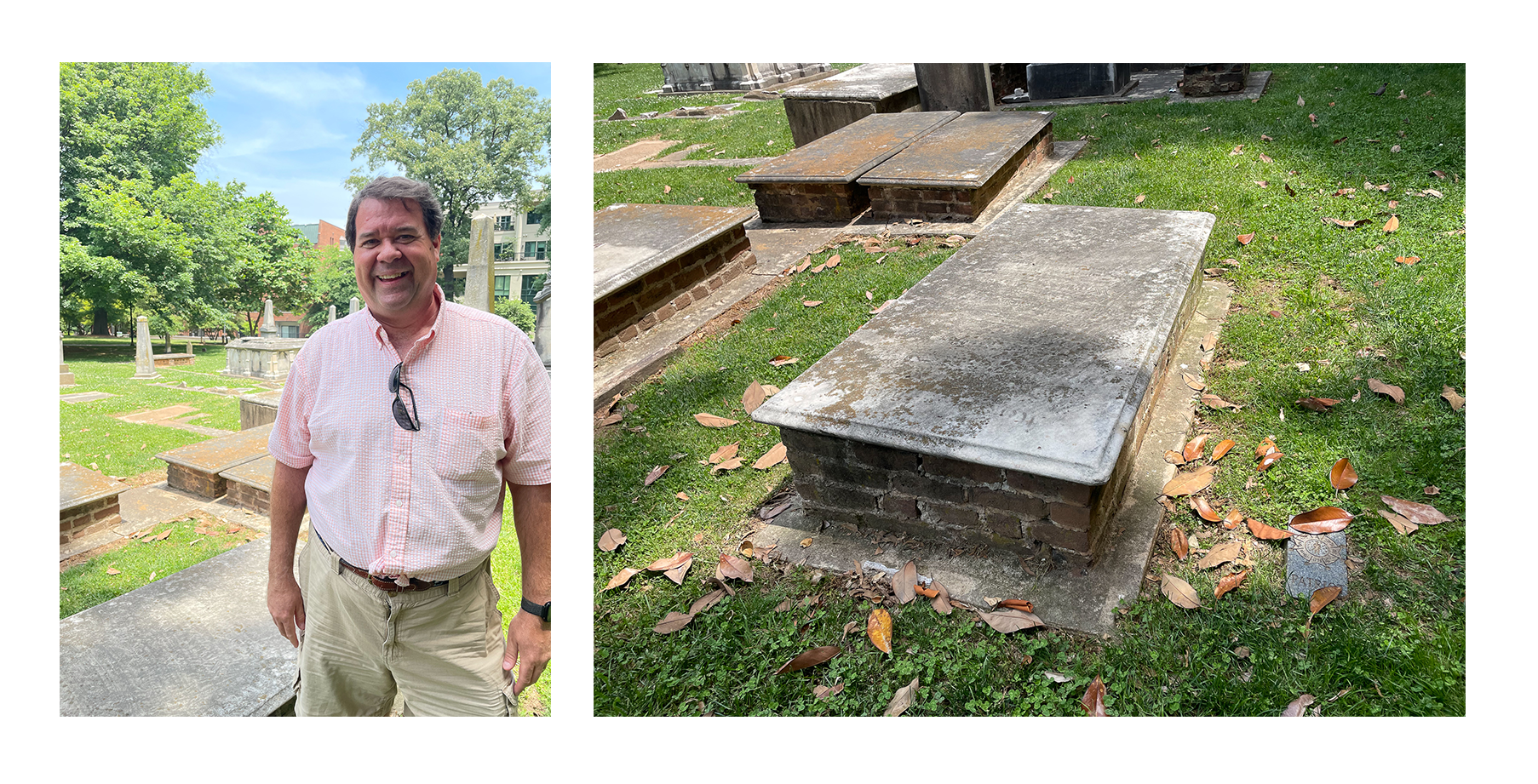
- Scott Syfert is a corporate attorney in Charlotte and cofounder of the May 20th Society, which is dedicated to commemorating the Mecklenburg Declaration of Independence. He is the author of the books, The First American Declaration of Independence? and Eminent Charlotteans.
Episode 9 – This episode focuses on North Carolina's recovery courts which handle chemically dependent adults and juveniles in criminal court. Recovery courts also serve juveniles with abuse, neglect, and dependency cases, veterans, and people with mental health issues who find themselves in court. The program offers individualized treatment plans which include counseling, supervision, drug testing, sanctions, and incentives for meeting recovery goals.
The host for this episode is Yolonda M. Woodhouse, court management specialist for Court Programs. Guests are: (in order of appearance) Janeanne Gonzales, treatment court administrator for the Mecklenburg County Recovery Courts, Special Superior Court Judge J. Stanly Carmical, the original judge for the Robeson County treatment court, and District Court Judge James H. Faison who serves in New Hanover County's recovery courts.
“Recovery courts are a program that truly does save lives. We can help that person regain their lives, and then as a result of that, they are able to reconnect with family,” Judge James Faison said in the podcast. “It really doesn't get any better than that.”
Host: Yolonda Woodhouse, court management specialist for Court Programs
Guests (in order of appearance):
- Janeanne Gonzales, treatment court administrator for the Mecklenburg County Recovery Courts
- Special Superior Court Judge J. Stanly Carmical, the original judge for the Robeson County treatment court
- District Court Judge James H. Faison who serves in New Hanover County's recovery courts

Episode 8 – In this episode, Chief Justice’s Commission on Professionalism Executive Director Mel Wright discusses and shares excerpts from a 2017 interview with former North Carolina Court of Appeals Chief Judge Gerald Arnold. Judge Arnold shares his experience arguing before the original members of the Court of Appeals, joining that Court as a judge then later as chief judge. Judge Arnold was instrumental in a restoration project in the 1990s that restored and preserved the historical value of the Court of Appeals' courtroom ceiling. In addition to providing insight into the Court's history, Judge Arnold gives time-tested professionalism advice for lawyers.
“There is nothing more important than the concept of professionalism,” Judge Arnold said. “Treat another lawyer the way you want that lawyer to treat you. It's the golden rule and your momma taught you that.”
Host: Chris Mears, North Carolina Judicial Branch Communications Office
Guests:
- Mel Wright, Executive Director of the Chief Justice's Commission on Professionalism
- Former Chief Judge Gerald Arnold, North Carolina Court of Appeals (pre-recorded interview)
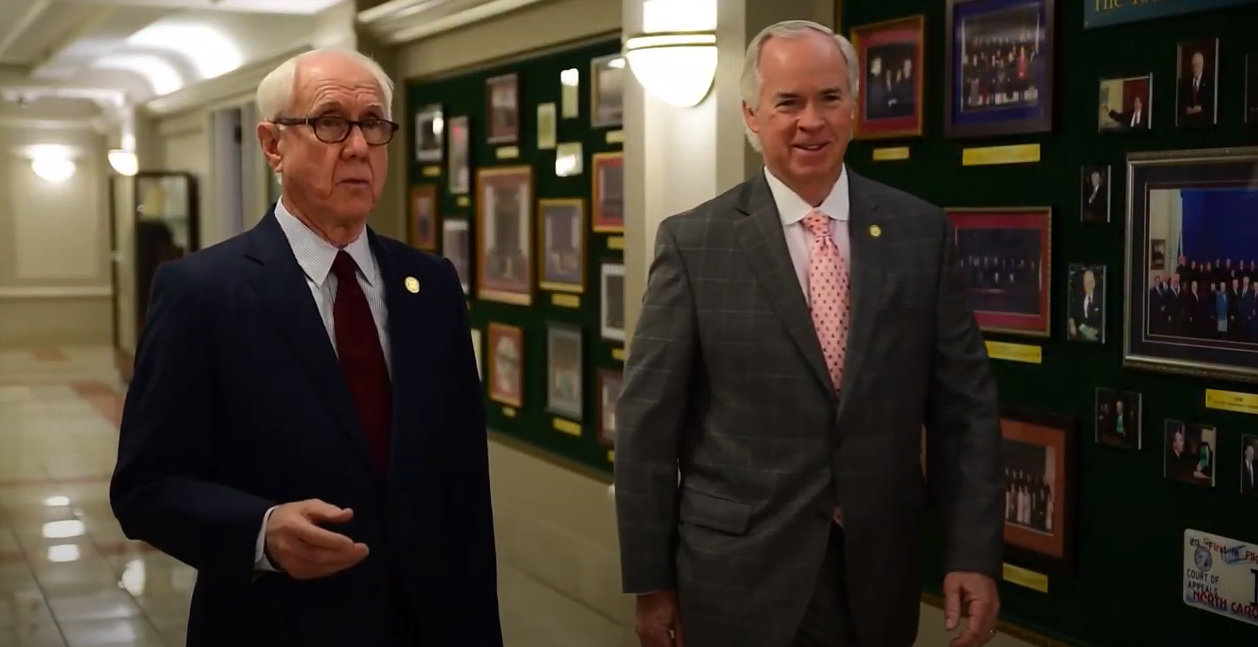

Episode 7 – In this bonus episode released on the 245th anniversary of the Halifax Resolves, we take listeners on a trip to the Historic District in Halifax, North Carolina, to speak with Frank McMahon, a historic interpreter with the North Carolina Department of Natural and Cultural Resources. Frank shares what life was like in 18th/19th century Halifax, North Carolina. Then, Chief Justice Paul Newby joins us in studio for a discussion about the Halifax Resolves and the events leading up to its adoption on April 12, 1776.
“We were the first state to authorize our delegates to vote for independence,” said Chief Justice Newby in the podcast. “As the Halifax Resolves authorized our delegates to vote for freedom, it implicitly said that we are going to form our own constitution.”
Host: Camden Roessler, North Carolina Judicial Branch Communications Office
Guests (in order of appearance):
- Chris Mears, North Carolina Judicial Branch Communications Office
- Frank McMahon, Historical Interpreter, North Carolina Department of Natural and Cultural Resources
- Chief Justice Paul Newby, Supreme Court of North Carolina
Episode 6 – This episode features the North Carolina Guardian ad Litem (GAL) program which equips community volunteers to serve abused and neglected children by advocating for their best interests in court. This episode's guests are GAL volunteers who share why they decided to volunteer, their experiences in the program, and the joys and challenges of representing children in the court system.
“Children deserve to be protected. Children deserve to be nurtured and to be cared-for,” GAL advocate Julia Lee said in the podcast. “Yes, it can be really, really hard. It can also be really, really sad, but it can be the most rewarding thing you will ever do.”
Host: Bwana Bomani, Recruitment and Retention Specialist with the North Carolina Guardian ad Litem program.
Guests:
- Ellis Hankins, 5 years of service as a GAL advocate.
- Julia Lee, 10 years of service as a GAL advocate.
- Luvenia Williams, 4 years of service as a GAL advocate.
- Michelle Hillison, 3 years of service as a GAL advocate.
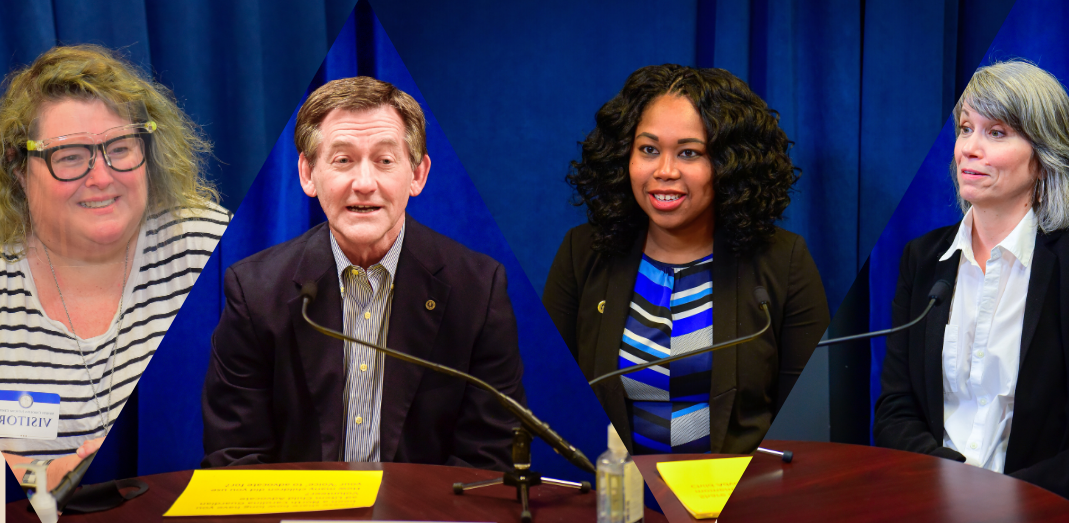
Episode 5 – This episode celebrates women’s history in the Judicial Branch and is hosted by former North Carolina Court of Appeals Chief Judge Linda McGee. Guests include current Court of Appeals Chief Judge Donna Stroud, Court of Appeals Judge Lucy Inman, and Court of Appeals Judge Valerie Zachary. They discuss their paths to the bench, the people who influenced their lives, and organizations that they found particularly meaningful throughout their careers.
“When I came there I was the only woman on the Court. Our numbers continued to grow and within a few years we had our first all woman panel, and a few years after that, we actually had a majority of women on the Court of Appeals,” former Chief Judge McGee said in the podcast. “It's been great to be able to have one another to be able to talk with, be able to share stories with, and be encouraged by.”
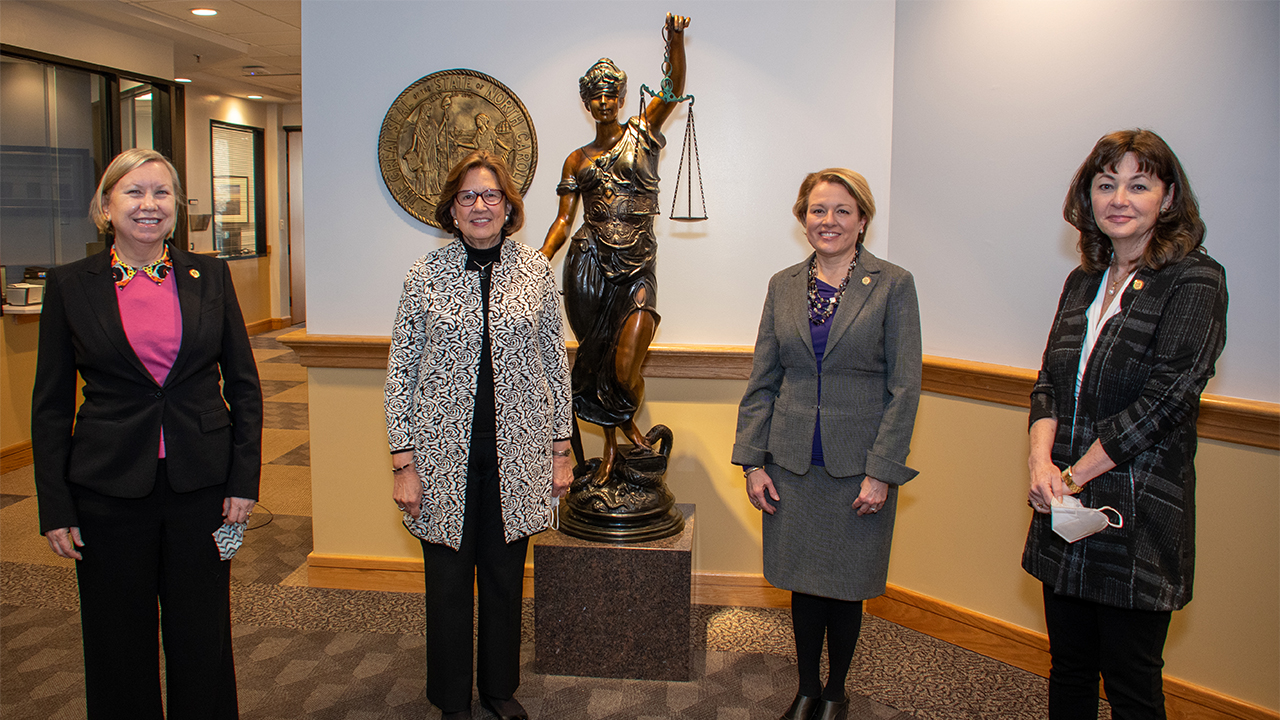
Host: former Court of Appeals Chief Judge Linda McGee
Guests:
- Court of Appeals Chief Judge Donna Stroud
- Court of Appeals Judge Lucy Inman
- Court of Appeals Judge Valerie Zachary
Episode 4 – This episode begins with Supreme Court of North Carolina Clerk of Court Amy Funderburk who shares her impression of the Court’s grand courtroom, and identified historic courtroom artifacts that are hidden in plain sight. In addition, Supreme Court of North Carolina Chief Justice Paul Newby introduces excerpts from remarks given by North Carolina’s newest appellate court judges during their investiture ceremonies held earlier this year.
The Supreme Court investiture excerpts included in this podcast episode are from Chief Justice Newby, Associate Justice Phil Berger Jr., and Associate Justice Tamara Patterson Barringer. They were formally installed at the Supreme Court of North Carolina on January 6, 2021. The audio was taken from the virtual swearing-in ceremony that was streamed online for guests, the media, and the public.
The excerpts for the North Carolina Court of Appeals investiture ceremonies are from Judge Jeffery K. Carpenter, Judge April C. Wood, Judge Fred Gore, Judge Jefferson Griffin, and Judge Darren Jackson. They were formally installed at the North Carolina Court of Appeals on January 14, 2021, and as with the Supreme Court excerpts, the audio was taken from the virtual swearing-in ceremony streamed online.
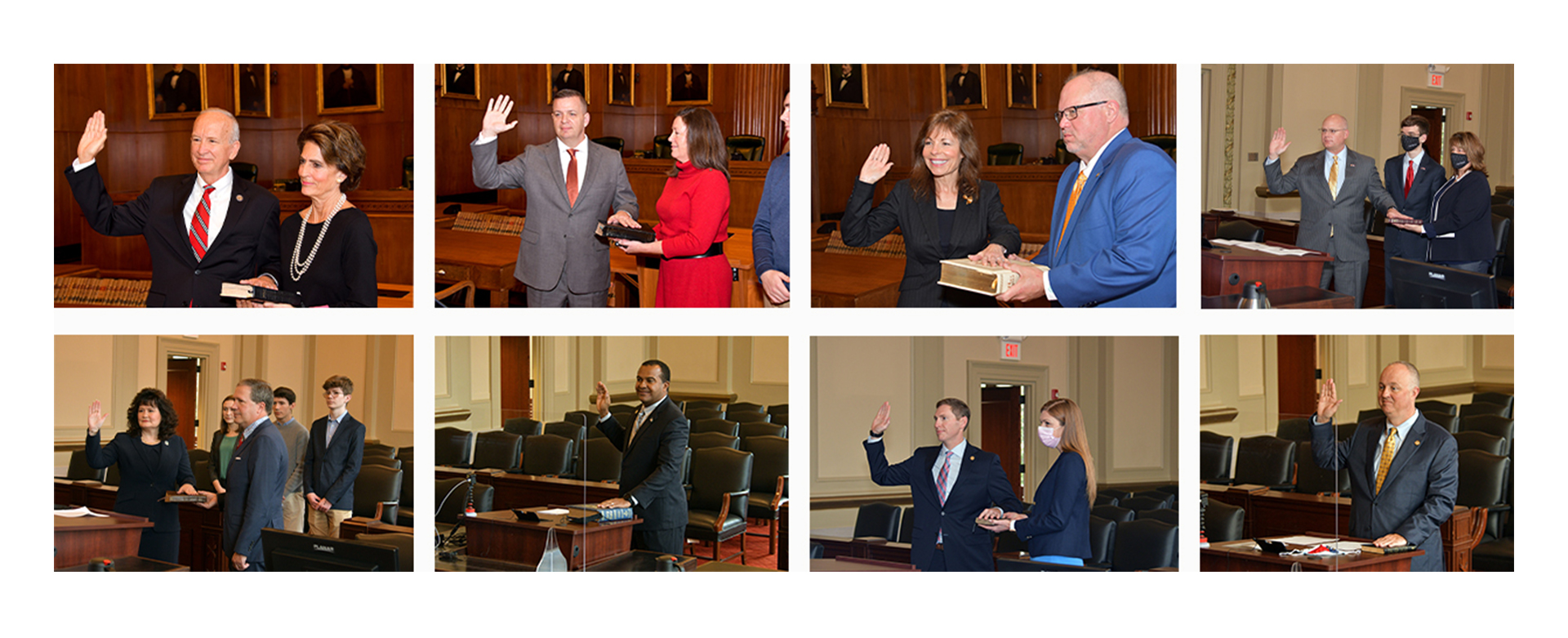
Episode 3 – Chief Justice’s Commission on Professionalism Executive Director Mel Wright welcomes Kinston attorney James S. “Jimbo” Perry to All Things Judicial. They discuss Jimbo’s career as an attorney and the calculus that many lawyers make between prioritizing work over people and relationships in their lives. Jimbo shared his personal experiences and desires to bring about change in his community through acts of service.
“One of the struggles that we as attorneys have is we sometimes work so hard that we don’t take care of the things that are most important,” Jimbo Perry said during the podcast. “The way to have joy and happiness is not by having and getting but by giving and serving.”
Host: Mel Wright, Executive Director of the Chief Justice’s Commission on Professionalism
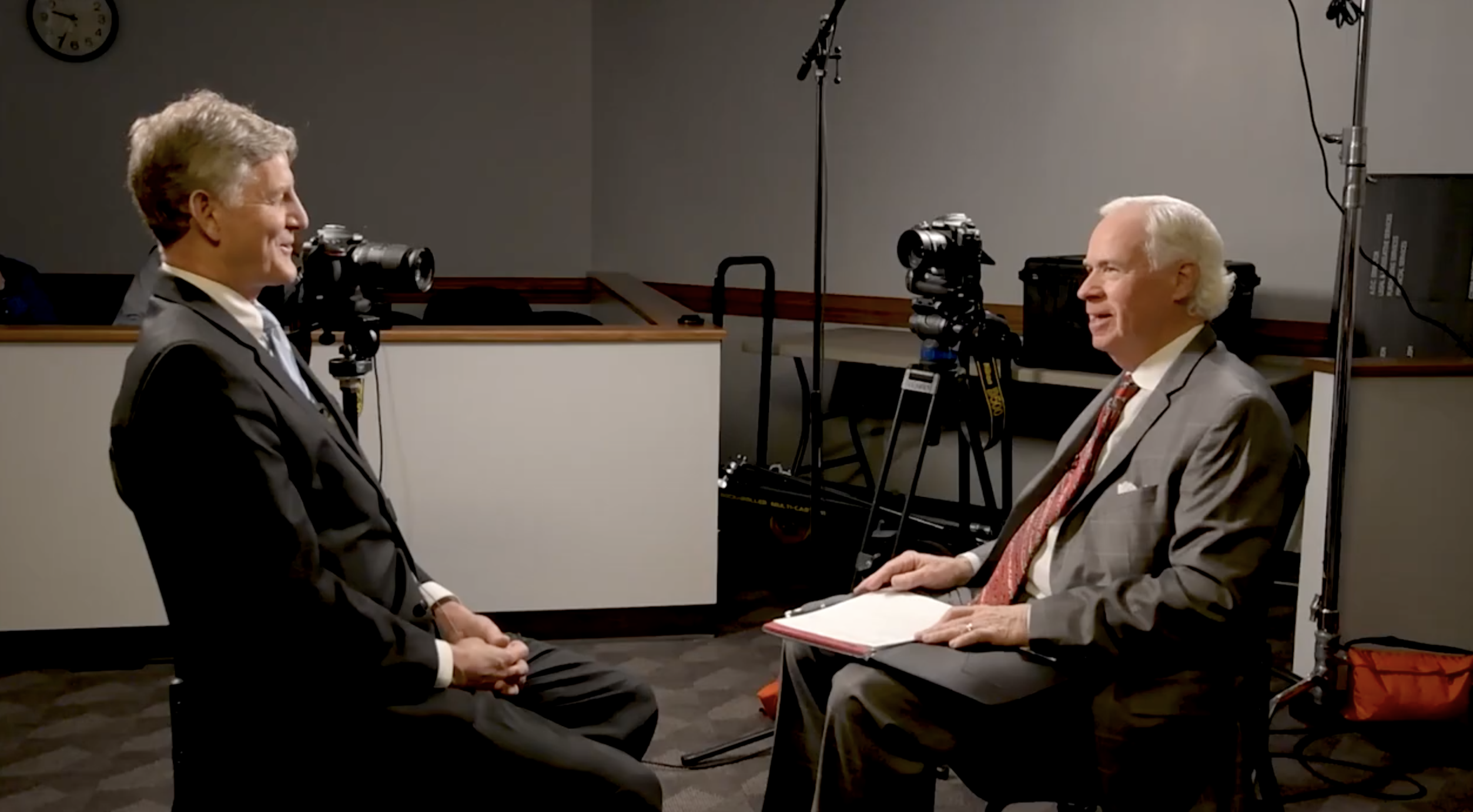
Guest:
- Jimbo Perry, Kinston Attorney
Episode 2 – In this episode hosted by Supreme Court of North Carolina Associate Justice Michael Morgan and entitled “Black History Made Me Who I Am,” Justice Morgan welcomed retired Court of Appeals Judge Wanda Bryant and current Court of Appeals Judge Fred Gore. They discussed their journeys from “birth to bench,” mentors who influenced their lives, and advice they would like to share with the next generation of African Americans entering the legal profession. Justice Morgan and Judge Bryant shared their personal experiences of being the first African American children integrated into their local elementary schools. Judge Gore shared his deep commitment to using his judgeship as a positive influence on the youth in his community.
Host: Supreme Court of North Carolina Associate Justice Michael Morgan
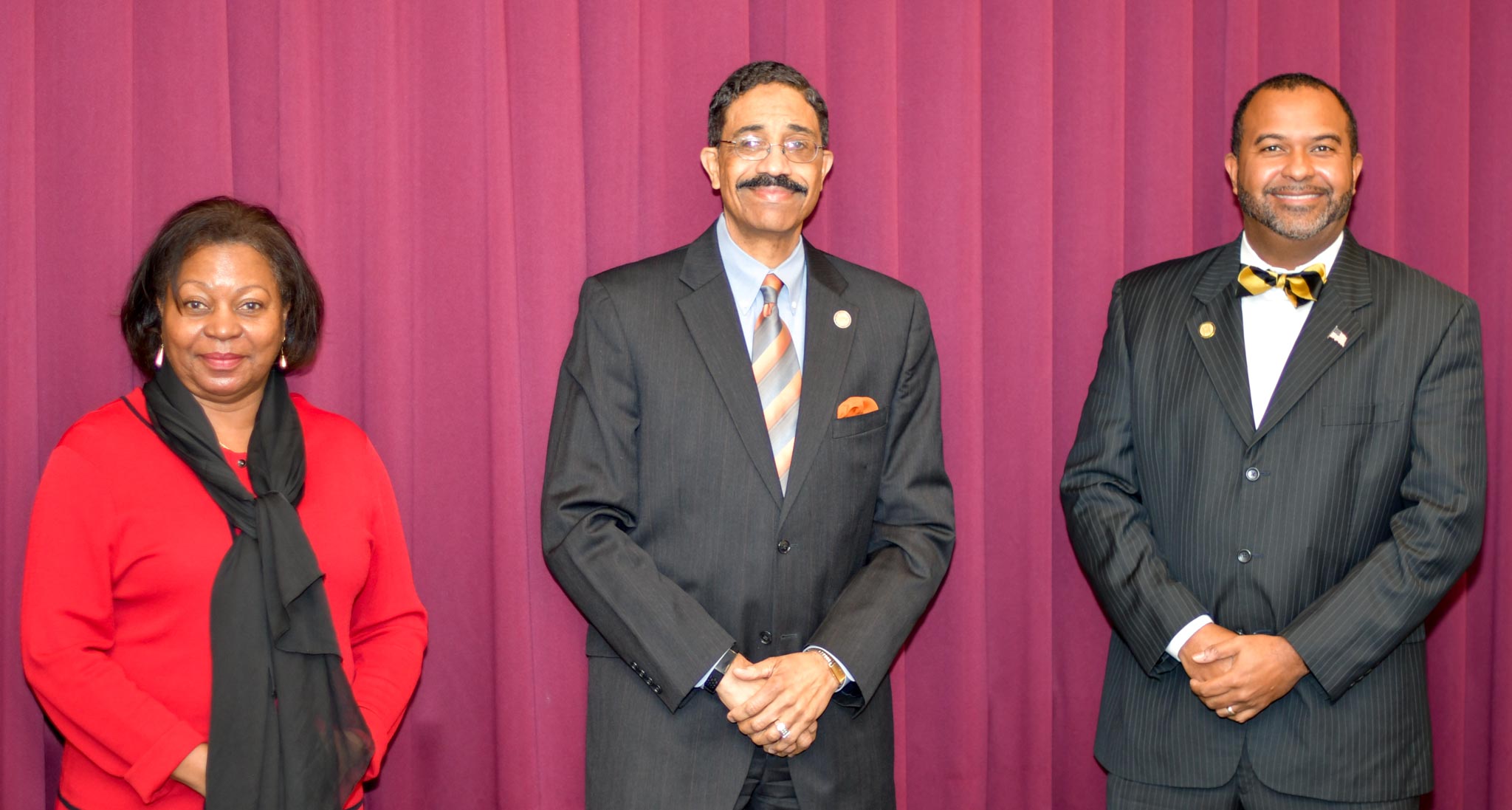
Associate Justice Michael Morgan (center) standing with Judge Wanda Bryant and Judge Fred Gore
Guests:
- Retired Court of Appeals Judge Wanda Bryant
- Current current Court of Appeals Judge Fred Gore
Episode 1 - In its inaugural episode, All Things Judicial highlights the North Carolina Human Trafficking Commission and its mission to prevent human trafficking in North Carolina. Hosted by North Carolina Human Trafficking Commission Executive Director Christine Long, the episode focuses on the role of the Commission and delves into the grim realities of human trafficking in our state, signs to look for, and how to prevent this horrific crime.
Host: Christine Long, Executive Director, North Carolina Human Trafficking Commission
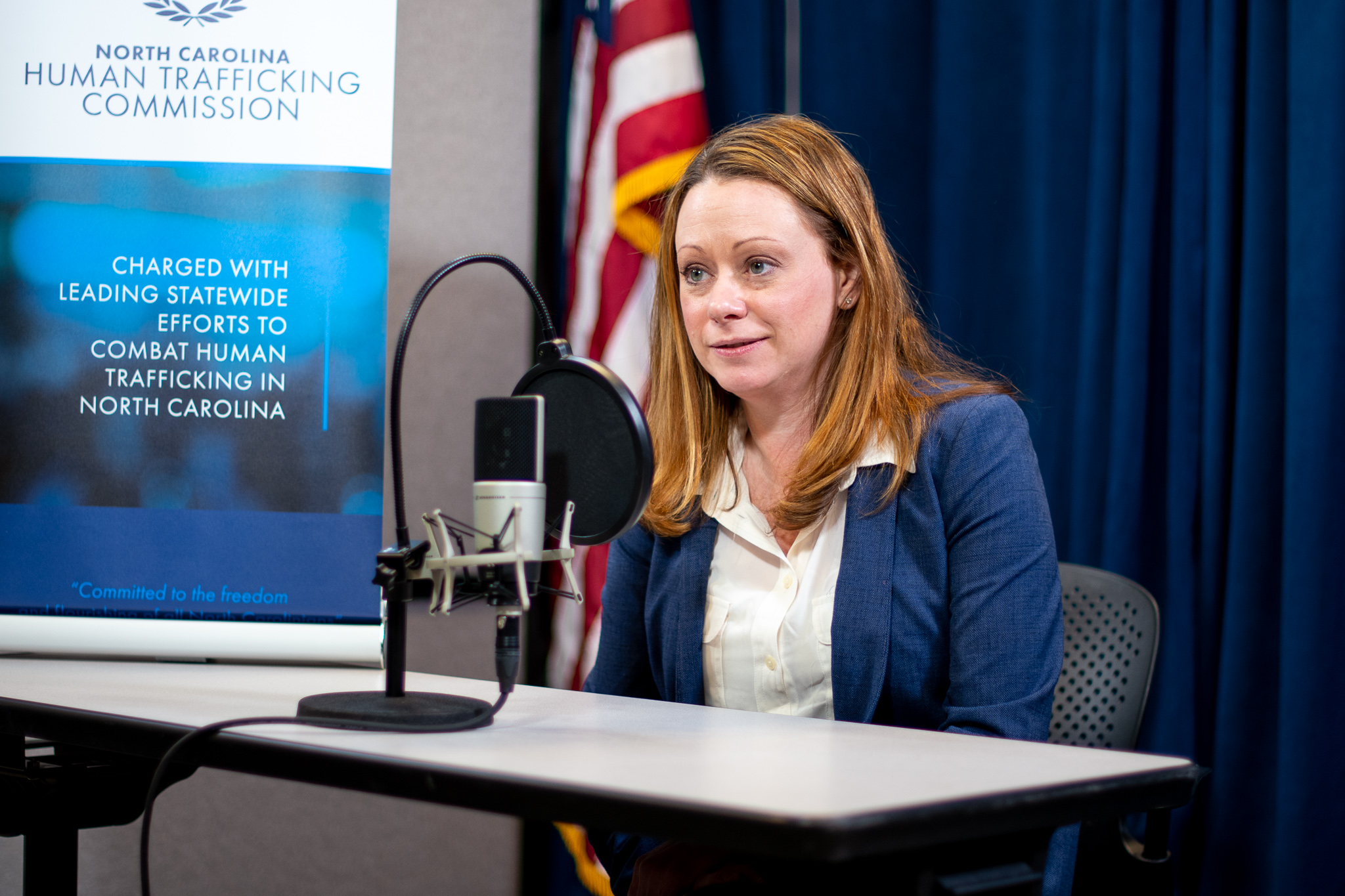
Guests:
- Jennifer Haigwood, Chair, North Carolina Human Trafficking Commission
- Deana Joy, Executive Director, Children's Advocacy Centers of North Carolina
- Jasmine McGhee, Special Deputy Attorney General and Director of the Public Protection Section, North Carolina Department of Justice
- Angelica Wind, Executive Director of Our VOICE, Inc.
Trailer - In this trailer for the new podcast All Things Judicial, Chief Justice Paul Newby shares information about the podcast and his vision for the North Carolina Judicial Branch.
Contact
Do you have feedback or episode ideas? Please reach out to [email protected].